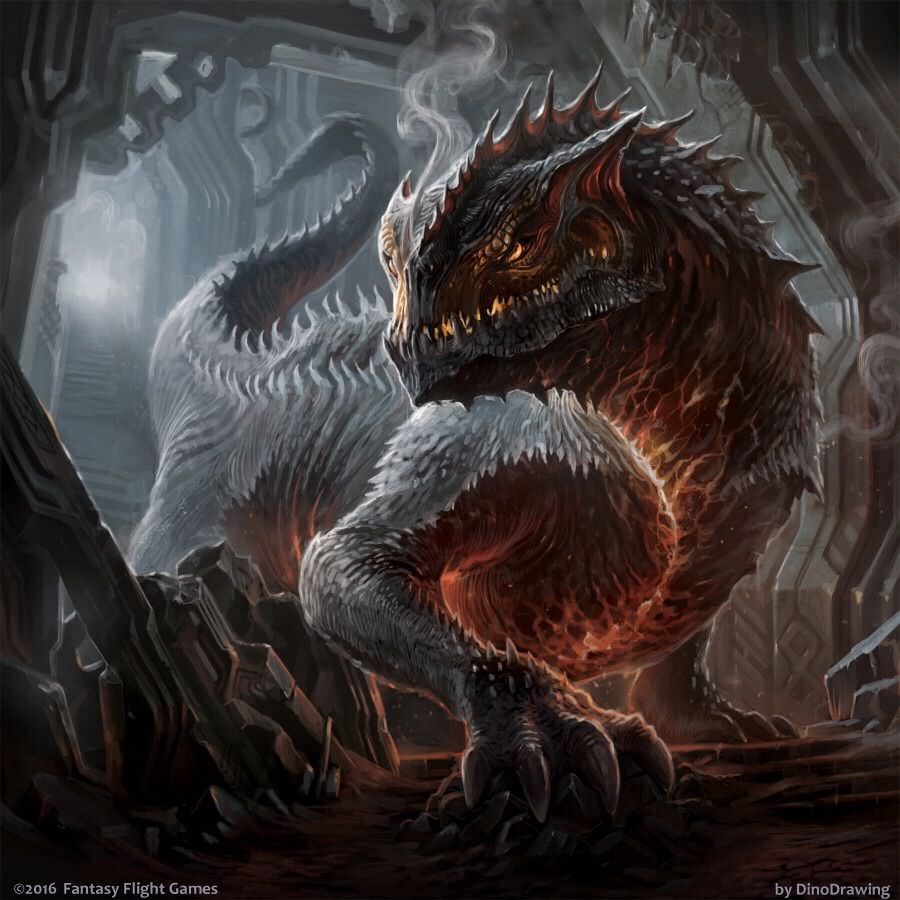Adventures in Middle Earth
Before Star Wars, before Warcraft or Warhammer or Dungeons and Dragons, there was Lord of the Rings. In an era before fantasy was even a genre, John Ronald Reuel Tolkien started a journey that would change fiction, and in many ways the world, forever. It began with the creation of the elven tongues, and then grew into an entire world with millennia of history and themes so powerful they transcend ages.
With the creation of Middle Earth, Tolkien became the Father of Fantasy. As games like Genesys would likely have never come into existence without the existence of Lord of the Rings, it only makes sense that someone would make a Middle Earth setting for Genesys. I'm honestly surprised someone else hasn't made one already.
This sourcebook will hopefully give you all the resources you need to create adventures of your own in the wondrous world of Middle Earth (or Arda, as the world itself is called). The Hobbit, the Lord of the Rings, and the Silmarillion all give us greater insight into this world, but for those who want to know more, here is a brief summary of the history of Arda:
The world of Arda began with Eru Ilúvatar, the One Above All. Eru created the Ainur, both the greater (the Valar) and the lesser (the Maiar), and the Ainur sang the world into being. The Firstborn of Eru soon awoke on the new world, and would eventually be known as the elves. Later the dwarves, men, and hobbits joined the elves in Middle Earth.
Morgoth, a fallen Valar and the first Dark Lord, sought to destroy all the works of the Ainur. To this end he corrupted several of the Maiar, including one who would become known as Sauron. Morgoth captured elves and tortured them, creating the first orcs. He then created trolls, dragons, and all manner of monsters to aid in his dark designs. Eventually, after millenia of conflict, Morgoth was defeated in the War of Wrath by the combined might of the elves, men, and the Valar.
His servant Sauron became the second Dark Lord. In the Second Age, Sauron came to the elves of Eregion, taking a fair form and calling himself Annatar, the Lord of Gifts. Deceived by his lies and promises, the elves of Eregion, led by Celebrimbor, learned from Annatar the art of ring-making. With his guidance they created sixteen Rings of Power. However, not fully trusting Annatar's intentions, Celebrimbor created 3 more rings in secret.
Returning to the dark land of Mordor, Sauron created a master ring, One Ring to rule them all. However, once he put the ring on his finger, the elves sensed his dark purpose and removed their rings. Enraged, Sauron waged war against the elves of Eregion to take the rings for himself. The elven realm of Eregion was destroyed, and all of the rings were taken, all but the Three.
He gave Nine rings to kings of the race of Men and seven to the lords of the dwarves. The dwarves proved too strong-willed to be dominated by Sauron, but they fell to their own greed. Four of the seven were consumed by dragonfire and the remaining three were eventually reclaimed by Sauron. The Nine corrupted the Men that wielded them, making them powerful warriors and sorcerers. Eventually their Rings corrupted them to the point that they faded from the world of the living, becoming wraiths, the Nazgul.
Sauron continued to corrupt those weak of heart, his machinations leading to the fall of the once-great kingdom of Numenor, the island nation sinking below the sea. Finally, a Last Alliance of Men and Elves came together and marched on Mordor. Gil-galad, High King of the Elves and Elendil, King of Arnor and Gondor, led the charge. Together they battled Sauron and defeated him, losing their lives in the process. Isildur took the Ring from the fallen Sauron's hand and claimed it as his own, until it betrayed him too.
The Ring was lost from the world until the most unlikely creature, Bilbo Baggins of the Shire, found it in the depths of the Misty Mountains. As a member of Thorin's Company, he took part in the events that led to the death of the dragon Smaug and the Battle of the Five Armies. After many years the Ring passed from Bilbo to his nephew Frodo, and during the War of the Ring a Fellowship set foot from Rivendell on a quest to destroy the Ring in the fires of Mount Doom. The road was long and the journey perilous, but in the end, the quest was complete. The Ring was destroyed, and with it Sauron finally met his end.
Story Hooks
Do you want to run a Genesys campaign in Middle Earth but don't know where to start? We've got you covered. Here are some ideas and story hooks to get you started.
The War of the Ring
The Lord of the Rings focuses on the War of the Ring, in which the Fellowship of the Ring took the long road to Mordor, Sauron's dark forces working to stop them at every turn. Your players can aid the Fellowship in their quest, traveling to iconic locations such as Helms Deep and the Black Gate.
This option has both positives and negatives to it, as the PCs have the opportunity to meet and possibly fight alongside famous characters like Aragorn and Gandalf the Grey, but also forces them to take a secondary role in the action. Of course, as this is your story, if you want, your characters can alter the path of events, but whether that is a good thing or not is up to you.
Games like Lord of the Rings Online could provide some inspiration for how this situation can work out.
The War in the North
While the Fellowship leads the battle in the southern kingdoms of Rohan and Gondor, a whole other battle is being fought in the northern reaches of Middle Earth. The elven realm of Lorien is attacked three times by orcs from the fortress of Dol Guldur and while the Battle of Pelennor Fields rages in the south, the elves of Mirkwood fought against another army from Dol Guldur, as the mountain kingdom of Erebor is besieged by Easterlings from Rhun. In the final battle, the forces of Lorien and Mirkwood laid siege to Dol Guldur and as the Men of the West attacked the Black Gate, Galadriel shattered the gates of Dol Guldur and cleansed the fortress.
While the southern battles of the War of the Ring have been described extensively, the war in the north has been left far more open to interpretation. There is a lot of room for a group of PCs to have a large impact on this war, whether battling orcs in Mirkwood, defending Erebor, laying seige to Dol Guldur, or fighting in battles not recorded in the Appendices. Perhaps the forces of Dol Guldur were going to receive enforcements from Gundabad or Goblintown, and it was the actions of your heroes that stops this force and saves the people of the North.
If you want more inspiration, the most in-depth version of the war in the north can be found in the campaign for the RTS game Battle for Middle Earth II, and elements of this conflict can be found in the games War in the North and Lord of the Rings Online.
The Time Between
There are seventy-seven years between the events of the Hobbit and the Lord of the Rings, years in which Sauron slowly grew in power, gathering his minions to him. Events during this period include Sauron returning to Mordor and rebuilding Barad-dur, Aragorn serving in the militaries of Rohan and Gondor and burning a Corsair fleet from Umbar, and Balin's expedition into Moria. This open period gives your players the opportunity to be the main characters of their own story, while still being able to meet famous characters like Gandalf, Aragorn, and Elrond.
While this period is wide open for you to create adventures of your own, not tied to those of the books/movies, it also provides some challenges. For one, you will have to get more creative in making up your own events for the PCs to take part in. PCs in this period could battle alongside Aragorn against the Haradrim and Corsairs of Umbar, or battle with other threats across Middle Earth. If you want to have more epic adventures, you might potentially take some elements from the Return of Angmar Story Hook.
To the East and South
Not much is known about the lands of Rhun or Harad to the East and South of Middle Earth. However, if you are willing to put in a little more work, you have a huge area to work with. Beyond the Easterlings and Haradrim that most people know about, four of the seven dwarf clans live in Rhun, while Deep Harad is home to a group of "half-trolls" (though whether or not they are actually part troll is debated). The two Blue Wizards, Alatar and Pallando, are also somewhere in the East, though nothing is known of their fates.
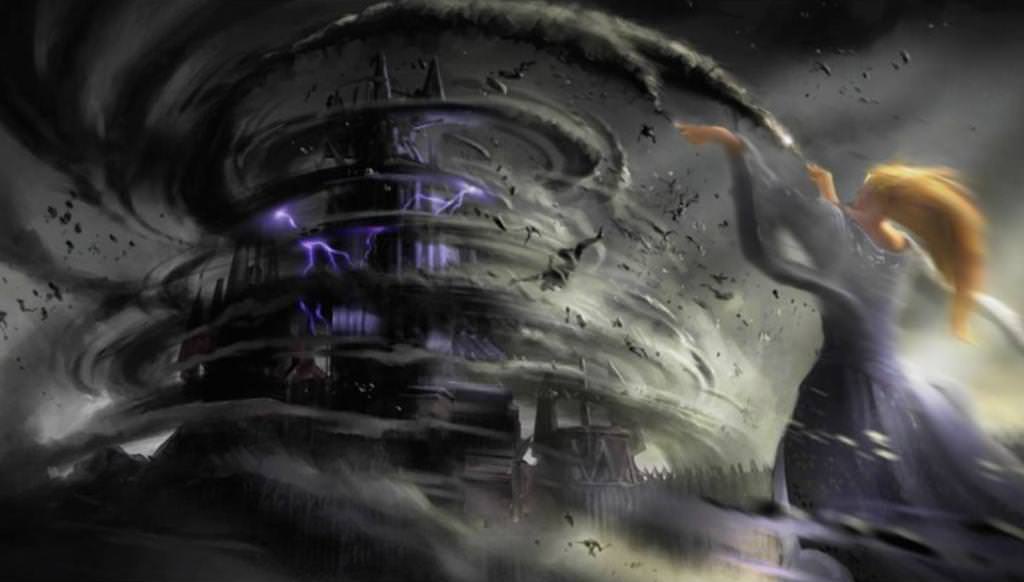
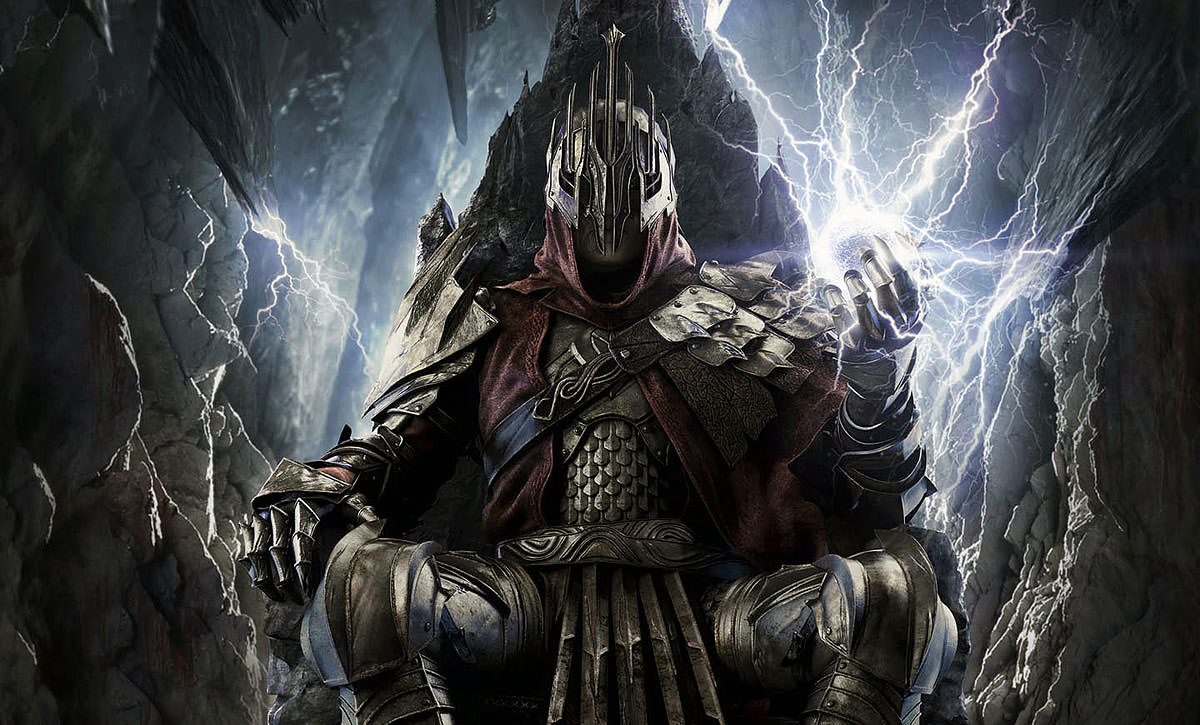
As Rhun and Harad are the Middle Earth equivalents of Asia and Africa, if you need more inspiration, you can look into the ancient cultures of those two continents for more inspiration. Egypt, India, China, Japan, and many other locations could have Middle Earth equivalents, complete with their own magical creatures and threats.
The Return of Angmar
Early in the third age, the fell kingdom of Angmar rose in the north. Ruled by the Witch King, greatest of the Nazgul, this dark nation destroyed the fragmented Kingdom of Arnor, leaving the Rangers as the only remnant of the Dunedain of the North. Angmar fell, its armies shattered by a combined force of Elves and Men from Rivendell and Gondor.
While this kingdom has been left desolate for centuries, the return of Angmar has been a theme in various non-canon Tolkien works, being featured prominently in Lord of the Rings Online, lightly used in The War in the North, and hinted at in the Hobbit film trilogy. Whether characterized as part of the war in the north or set during another period, such as between the Hobbit and the Lord of the Rings, this provides your characters with the opportunity to be the heroes of their own tale while still having a good amount of source material to work with.
Other Ages
While the majority of the stories we are familiar with take place in the latter end of the Third Age, Middle Earth is an ancient world with millennia of stories to tell. Earlier in the Third Age the kingdom of Angmar rose to power in the North, and further back conflicts from the War of the Last Alliance to the War of Wrath provide limitless opportunities for adventures in Middle Earth.
Many players will be unfamiliar with these periods and may not want to step out of their comfort zone with this. However, if they are willing, there are countless stories you can tell. If you want some more inspiration for this, the Silmarillion is the best place to go. If you don't want to read that nearly Biblical record (though I highly recommend you do), the One Wiki to Rule Them All (I didn't make that name) can give you the summarized versions of the events of past ages.
On the flipside, there is also the Fourth Age left to be explored, after the events of the books/films. As this is the Age of Men, the other races will have less of a role, and various enemies (such as the Nazgul) are no longer in existence. However, the forces of Harad and Rhun are still in play, and evil never sleeps for long. J.R.R. Tolkien actually began a fourth book that would have taken place in this period, though he never completed it.
There are not many places to go for inspiration on this, as Tolkien only finished a little over a dozen pages of the proposed sequel, but you can look at the end of the Return of the King to get a better understanding of the basics of how the world changed at the end of the Third Age.
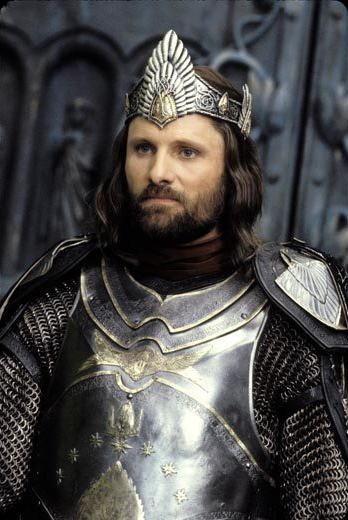
Factions and Threats
Men
Gondor
The Men of Gondor are a proud people, descendants of the Dúnedain that survived the fall of Numenor. The nation was once ruled by a king, but after the last king died with no heirs, the governance of the kingdom has fallen to the line of Stewards. The people of Gondor have long held back the dark minions of Sauron in nearby Mordor. Gondor is the largest and most populous kingdom in Middle-Earth, containing about half a dozen cities and many towns. The men of Gondor are not quite as mighty or long-lived as their Numenorean ancestors, but they still number among the greatest Men remaining in Middle-Earth. The primary language of Gondor is Westron, also known as the Common Tongue.
Rohan
The Rohirrim are known as "horse-lords", as their steads are known as the greatest in all Middle-Earth, and a large part of the culture of Rohan. Rohan is a land of large pastures and grasslands, with only two true cities, the capital city of Edoras and Aldburg, capital of the Eastfold. The majority of the people of Rohan are farmers and hunters. The military of Rohan is almost entirely cavalry, though in times of need each town and city has their own militia, which can be called upon to fight. The primary language of Rohan is Rohirric, though most also speak Westron.
Dale & Esgaroth
The Men of Dale and Esgaroth are unique among men due to their close relations with Dwarves of Erebor. Despite their proximity and the relatively recent split between them, these two cities have somewhat different cultures. The Men of Dale have learned much from their neighbors in Erebor about craftsmanship and the making of beautiful things. The Men of Lake-Town, as Esgaroth is also named, are simpler folk, predominantly merchants and fishermen. While Dale is a city of stone and iron, Lake-Town is made almost entirely of wood, and floats on the surface of the Long Lake. Their greatest trade comes from both the dwarves in the Mountain and the elves in the Wood. The primary language of Dale and Esgaroth is Westron.
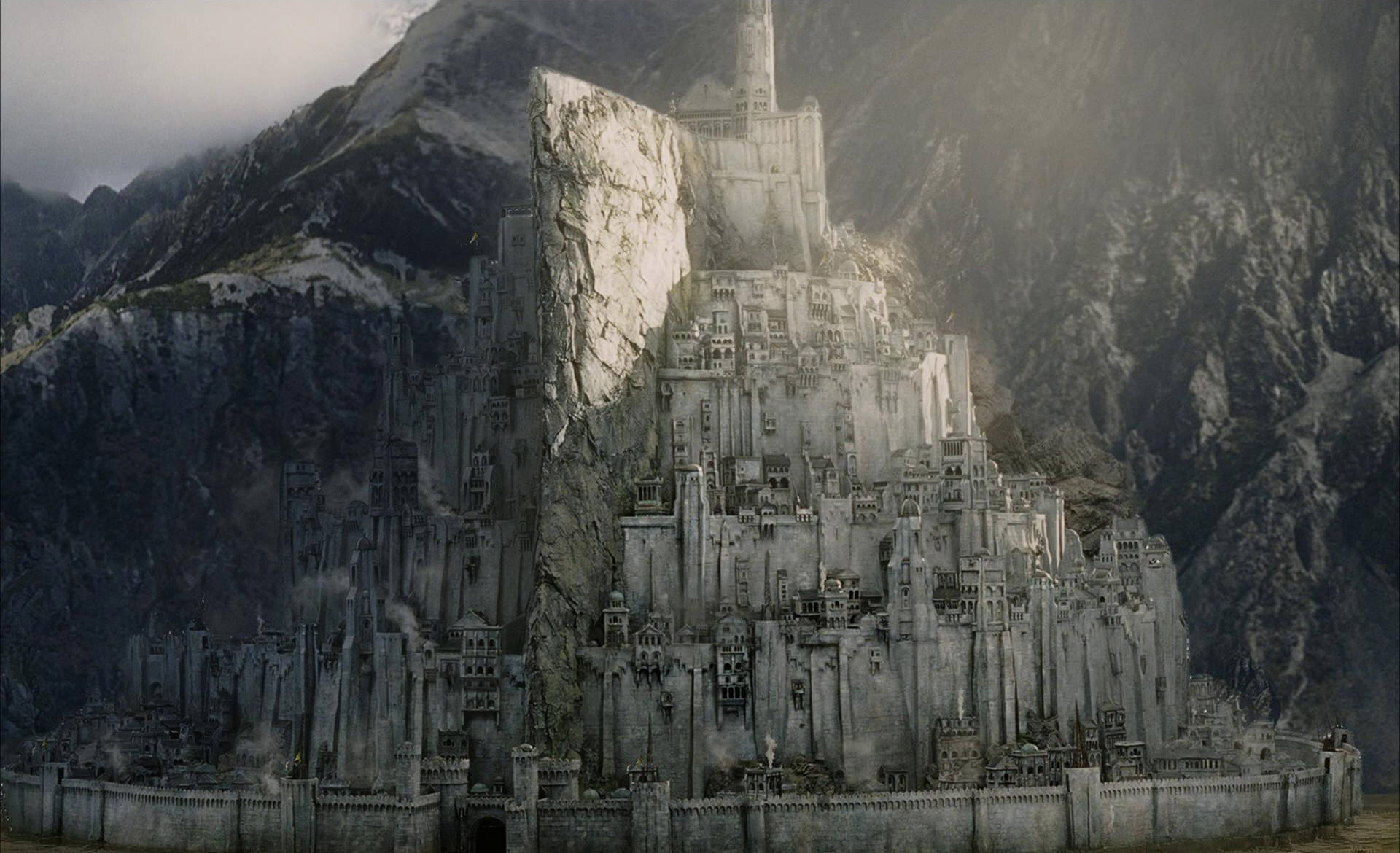
Remnants of Arnor
Where once stood the great northern kingdom of Arnor now only stands ruins and a few scattered townships. The people of this land can be split into two categories: The Bree-landers and the Rangers of the North. The Bree-landers are short and broad people. They live mostly in Bree and the surrounding townships, and have a close relationship with hobbits, who also inhabit that area. They are simple folk, and generally prefer to keep to themselves and let others do the same. They have no true ruler or military, though each town has a mayor and a town watch. They are also under the protection of the Rangers of the North, but few realize this, thinking of the rangers as strange, fearful folk.
The Rangers of the North are all that remains of the Dúnedain of Arnor. They are a wandering people, living a nomadic lifestyle. They are raised to be warriors from an early age, though they have no love for war. They are the ultimate peace-keepers, protecting the people of Bree-land and the Shire from the dark things of the world, often without these lands knowing there is anything to be protected from. The blood of Numenor is strongest with this wandering people, and the rangers are tall and strong, often with lives nearly double that of lesser men. The primary language among both the Bree-landers and the Rangers is Westron, though many rangers are also fluent in Sindarin, the common tongue of the elves, (due to their relations with the elves of Rivendell) and in some cases even Quenya, the elves' higher tongue.
Rhun
Not much is known of the culture of the Easterlings. They are described as having "clans", though what that means is uncertain. They likely have many cultures, much like Rhun's real-world counterpart of Asia. It is fair to assume that these cultures are much like the cultures of ancient Asia, so cultures like those of India, China, Japan, and the Mongols are likely paralleled in Rhun. There are many languages spoken among the peoples of Rhun.
Harad
Much like Rhun, not much is known of the culture(s) of the Haradrim. They are described as having "tribes", though what that means is uncertain. Much like Rhun, we can assume Harad's cultures parallel those of ancient Africa. I personally would be fascinated with seeing an Egypt parallel in Middle-Earth. There are many languages spoken among the peoples of Harad.
Elves
Rivendell/Imladris
The Last Homely House East of the Sea is the last refuge for the Noldor in Middle-Earth. Here the High-Elves live in peace until their eventual journey into the West. The Elves of Rivendell are the greatest of their kind still in Middle-Earth, with the greatest smiths, loremasters, and warriors of the elves all living in this hidden valley. Elrond Halfelven rules as Lord of Rivendell, as he has since the sanctuary was created. The elves of Rivendell are peaceful and kind to all peoples, whether elf, man, dwarf, or hobbit, caring little for the petty squabbles that other elves have with the dwarves. The primary language of Rivendell is Sindarin, though most also speak the higher elven tongue of Quenya, and many also speak Westron.
Lorien
The Golden Wood is ruled by Galadriel, a Noldorin elf, and Celeborn, a Sindarin elf, but the majority of the elves of Lorien are of Silvan descent. The Galadhrim, as they are also known, are a secretive people, keeping out of the affairs of other peoples, even their elven brethren in nearby Mirkwood. The Galadhrim love nature above all else and are fiercely protective of their woodland home, especially its magical Mallorn Trees. The primary language of Lorien is Sindarin, though some speak Quenya as well, and some, but not many, speak Westron.
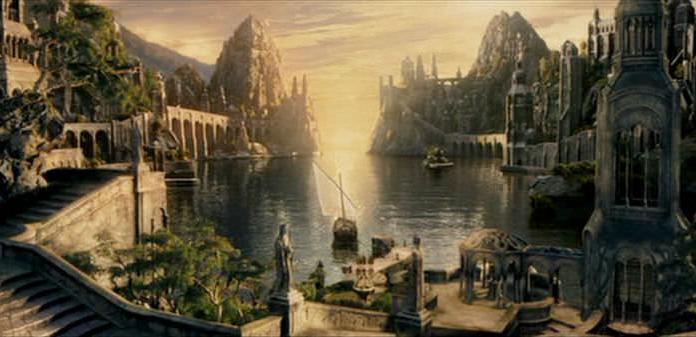
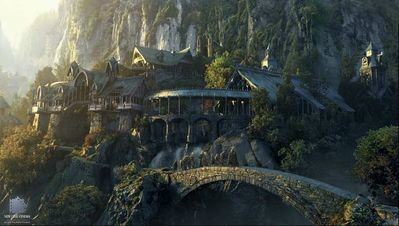
Mirkwood
The Woodland Realm is ruled by the Elvenking Thranduil, a Sindarin elf, the only elven ruler to claim the title of King in the Third Age. The elves of Mirkwood are primarily Silvan elves, and it shows in their love of the woods. They are a prideful people, with a long-standing enmity against the dwarves. Many perceive them to be isolationist, but they have close relations with the Men of the Lake and the Woodsmen of Mirkwood, and have had relations (however strained) with the dwarves of Erebor, making them the least insular of the elven realms. They are fiercely protective of their woodland home and are unfailingly loyal to their king. The primary language of Mirkwood is Sindarin, though many also speak Common.
Lindon
Lindon is ruled by Cirdan the Shipwright, the oldest and wisest of the elves left in Middle Earth. Lindon a realm consisting mostly of Sindarin elves, but as all elves eventually take the journey west to Valinor, there are also Noldorin and Silvan elves to be found among the elves of Lindon. The elves of Lindon love the sea above all else, and are the greatest mariners in Middle-Earth. They have mostly-smooth relations with the Dwarves of the Blue Mountains, and occasionally interact with Hobbits, but they care little for the struggles of Middle-Earth, their gazes turned westward to Aman. The primary language of Lindon is Sindarin, though most also speak Westron and some speak Quenya.
Dwarves
The Lonely Mountain & the Iron Hills
Durin's Folk have only recently recovered their ancient home of Erebor, greatest of the dwarven kingdoms of the Third Age. The nearby Iron Hills are also subject to the King Under the Mountain, ruler of the mountain kingdom of Erebor. The dwarves of Erebor have many dealings with the Men of Dale and the Men of the Lake, but have had a long-standing grudge against the Elves of the Woodland Realm. The primary language of Erebor and the Iron Hills is Khuzdul, the secret language of the dwarves, but most also speak Westron.
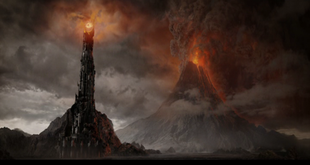
The Blue Mountains
The dwarves of Ered Luin are far separated from their kindred in Erebor and the Iron Hills. A mix of three of the dwarf clans, Longbeards, Firebeards, and Broadbeams, the dwarves of the Blue Mountains have been known to have relations with the elves of nearby Lindon, the closest of such relationships remaining in the Third Ages, in a time when dwarves and elves are often far estranged. The primary language of Ered Luin is Khuzdul, the secret language of the dwarves, but most also speak Westron.
The Red Mountains
Little is known of the four dwarf clans of the Orocarni, far to the East in the land of Rhun. The Ironfists are said to be a greedy, xenophobic, and warlike clan, but of the other three (Stiffbeards, Blacklocks, & Stonefoots), even less is known. Some believe these clans, or at least many of their members, to be in league with Sauron, but it is unknown if that is true. It can be assumed their primary language is Khuzdul, the secret language of the dwarves, and that most also speak some language of the East.
Hobbits
The Shire
The Hobbits of the Shire are simple folk, not caring much for the world beyond their bounds. They live in harmony together and the sheriffs, their only law enforcement, focus much more on keeping outsiders away than any real enforcement of laws among fellow hobbits. The Hobbits of the Shire fear water and know nothing of boats or swimming, and think that hobbits beyond the bounds of the Shire to be quite odd.
Buckland
Directly across the Brandywine River from the Shire, the hobbits of Buckland consider their neighbors in the Shire to be rather odd. The hobbits of Buckland are fond of water, skilled with boats and swimming. They also tend to be more adventurous than Shire hobbits, occasionally wandering into the nearby Old Forest. They also know a thing or two about fighting, something few Shire hobbits can say.
Bree-land
The hobbits of Bree-land are very similar to the hobbits of Buckland, but for one major difference: they live among men, or the Big Folk. This leads to other hobbits thinking them odd, though they consider Shire hobbits equally strange. They take after the men of Bree-land in that they care little about the outside world, prefering to mind their own business, though they are more hospitable to strangers than Shire hobbits generally are.
Servants of Sauron
Mordor
The center of Sauron's power in Middle Earth, the Black Land is a volcanic wasteland with corruption in the air and the earth, shrouded eternally by clouds of smoke, blocking out all sunlight. Orcs, uruks, trolls, fell beasts, and many other foul creatures dwell within these lands of fire and death. The Nazgul dwell in the dark city of Minas Morgul, and the tower of Barad-dur stands tall over the hellish landscape, Mount Doom forever spewing fire and ash into the air.
Isengard
Home to the legendary wizard Saruman, the tower of Orthanc was once a fortress of Numenor. During the War of the Ring, Saruman, corrupted by his desire for power and the whisperings of Sauron, built a powerful army of orcs, uruk-hai, wargs, and wild men with which to conquer Rohan and eventually Middle Earth. Luckily he was stopped by the Fellowship of the Ring and the might of the Ents before his designed could come to fruition.
Misty Mountains
The Misty Mountains are home to all varieties of evil things. Goblins, orcs, and trolls all dwell in tunnels and caverns within these mountains, as well as older, darker things within the depths. Moria, once the dwarven halls of Khazad-dum, are overrun with orcs and many goblins reside in the nation of Goblintown, with the greatest hosts residing in the fortress of Gundabad. These mountains are also home to the mighty Stone Giants, though most consider them to be myth, and they care little for the conflicts of smaller folk.
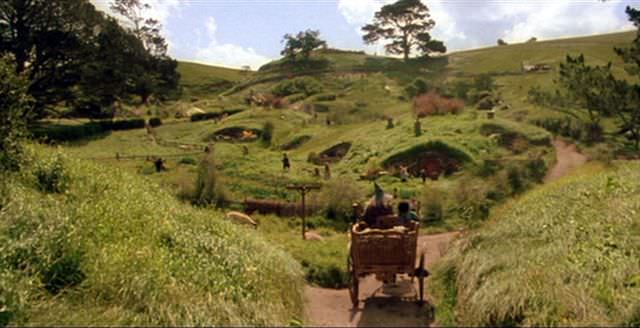
Mirkwood
Sauron, disguised as the "Necromancer" once made his abode in the dark fortress of Dol Guldur, within the depths of southern Mirkwood. His darkness tainted the forest, filling it with his evil. Monstrous spiders, spawn of the cursed creature Ungoliant, prowl the forests, as do armies of orcs. The Nazgul have at times ruled the fortress in the stead of their master, and many of their wraith servants dwell within these darkened woods as well.
Angmar
While the kingdom of Angmar is long dead, the terrors that once served its Witch King still live in the ice and snow. Great snow trolls, evil men, orcs, goblins, wraiths, and the terrible barrow-wights all once served the Witch King of Angmar. If that fell kingdom were to ever rise again, a terrible evil would be unleashed upon Middle-Earth.
Others
Beornings
The Beornings are insular people, residing in a land all their own, between Mirkwood and the Misty Mountains. They distaste dwarves, but hate all creatures of evil far more. They are men great of stature and power, with the unique ability to change into the shapes of great bears. While few in number, underestimating Beornings would be folly, as it was the arrival of their patriarch Beorn that turned the tide of the Battle of the Five Armies.
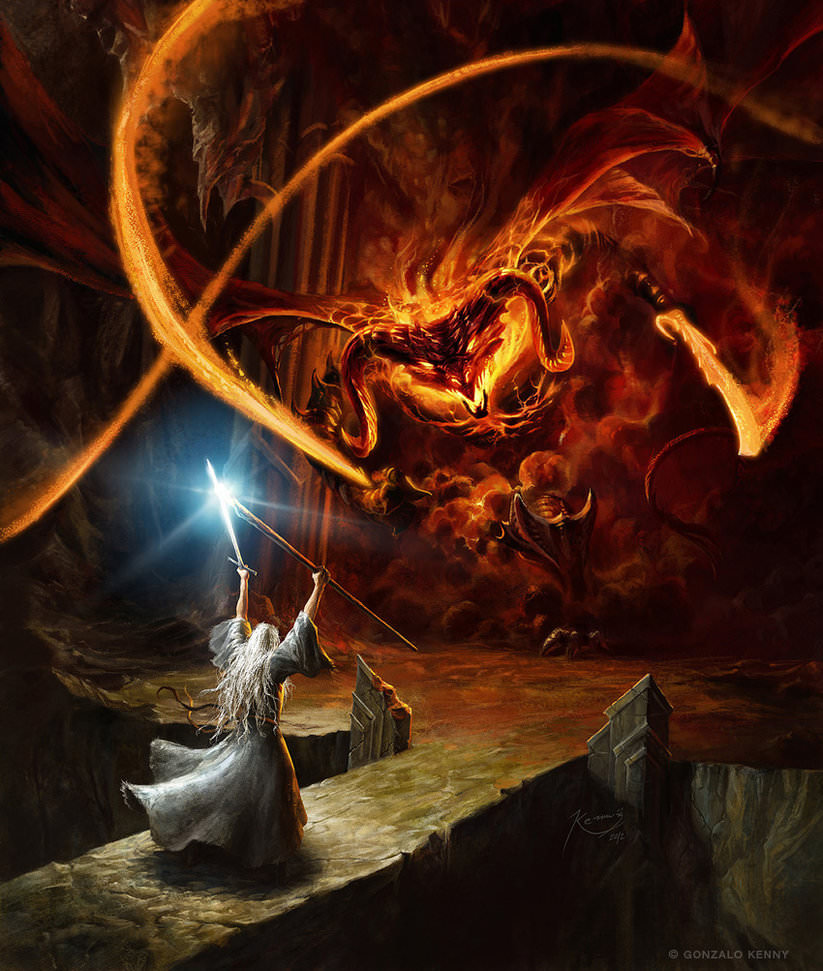
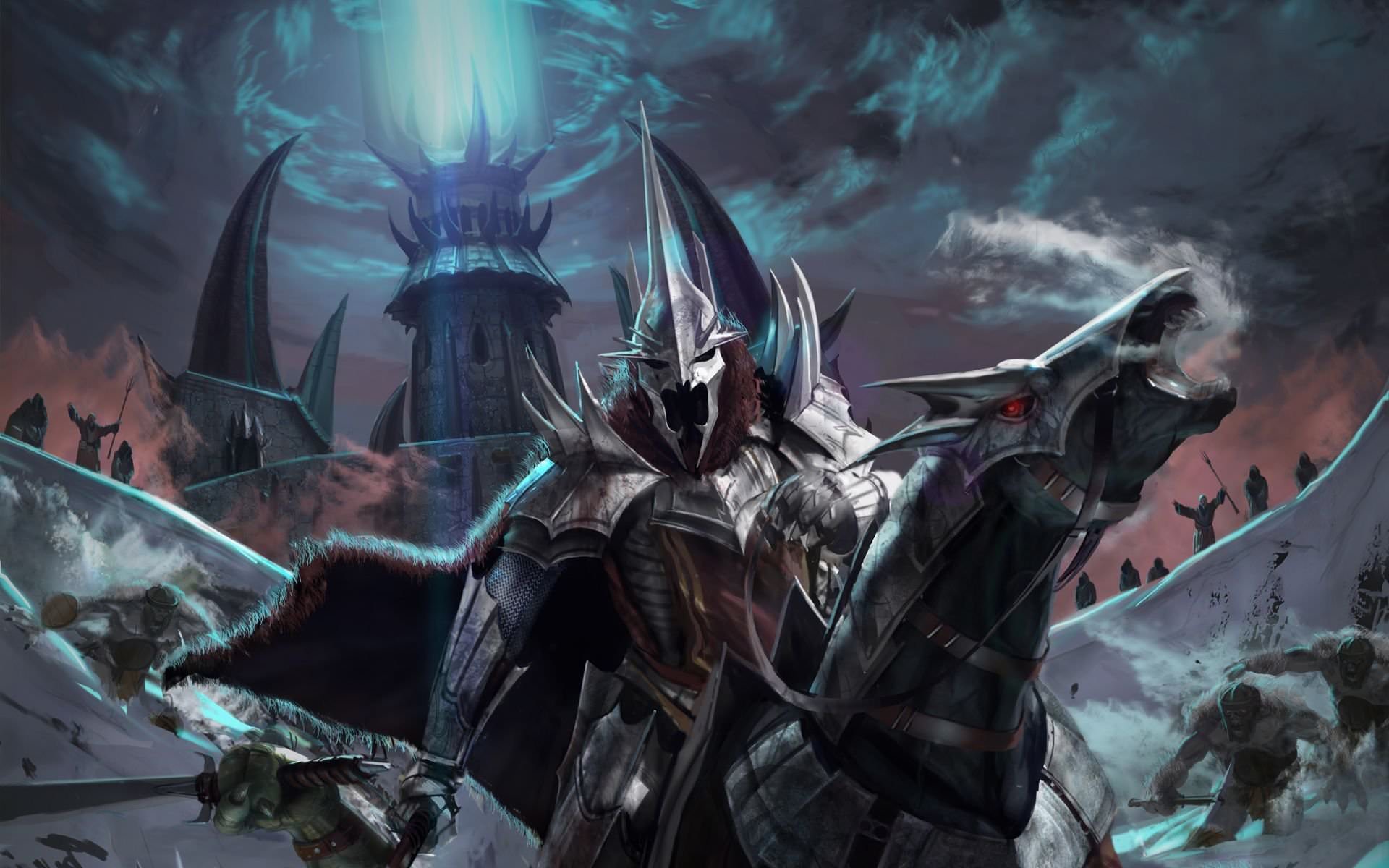
Great Eagles
The Eagles of Manwe are the mightiest of all birds, massive creatures large enough to carry full-grown men in their talons. They are a proud race, far more intelligent than common birds, ruled by the greatest of their kind remaining in Middle Earth, Gwahir the Windlord. While they have close relations with the wizard Gandalf, they answer to no one other than Gwahir and Manwe himself.
Ents
The tree-herders were created at the behest of Yavanna, the Vala of the earth, to protect the trees of Middle-Earth. They are ancient and immortal, mighty beings much like the forests they protect. Their speech is slow, as are all decisions they make. They believe that anything worth saying is worth taking a lot of time to say. While slow to anger, when their anger is aroused, there is little that can resist their might.
Ancient Evils
As Gandalf has said, "There are older and fouler things than Orcs in the deep places of the world." There are many evils from the Elder Days that have been forgotten, and many others that some wish would be forgotten. The Balrogs of Morgoth are among the oldest and foulest of these creatures. Even with none as great as the serpents of old, dragons still are terrifying and mighty. Werewolves, vampires, and many nameless beings reside in the darkest and deepest places in the world. A few of these Sauron has turned to his cause, but many are so alien that even Sauron does not try to force them to submit to his will.
The Free Peoples
The Race of Men
The Secondborn of Eru have always been a conundrum. Blessed with death, the Gift of Men, much of their existence seems to consist of fleeing this gift, which many have renamed the Doom of Men. The most easily corrupted of the Free Peoples, the Race of Men has also birthed some of Arda's greatest heroes. It is said that in the End of Days, it will be a Man that finally slays Morgoth and ends his evil.
- Wound Threshold: 10 + Brawn
- Strain Threshold: 10 + Willpower
- Starting Experience: 110 XP
Men of Gondor
Gondor is the greatest remaining kingdom of Men. Descendants of the survivors of Numenor, they have become adept in many walks of life and have been at war for the majority of their nation's existence, whether against Easterlings, Haradrim, or the endless legions of Mordor. While the blood of Numenor has grown thin, they are still often considered the greatest of the Men of Middle Earth. Boromir and Faramir are numbered among the Men of Gondor.
- Special Abilities: Men of Gondor begin with one rank in each of two different non-career skills. You still cannot train these skills above rank 2 during character creation.
- Ready for Anything Once per session as an out-of-turn incidental, you may move one Story Point from the Game Master's pool to the player's pool.
Dúnedain of the North
Unlike their cousins in Gondor, the blood of Numenor still runs strong in the Dúnedain of the North. These men once ruled over the great northern kingdom of Arnor, but that kingdom fell to the dark forces of the Witch King of Angmar. The remaining Dúnedain are few in number, living mostly as wanderers and rangers, protecting the peoples of the North in secret. Aragorn is numbered among the Dúnedain of the North.
- Special Abilities: Dúnedain of the North begin with one rank in Survival. You still cannot train their Survival above rank 2 during character creation.
- The Blood of Numenor: Once per session as an out-of-turn incidental, a Dúnedain of the North may spend a Story Point as an out-of-turn incidental to add aaa to a check.
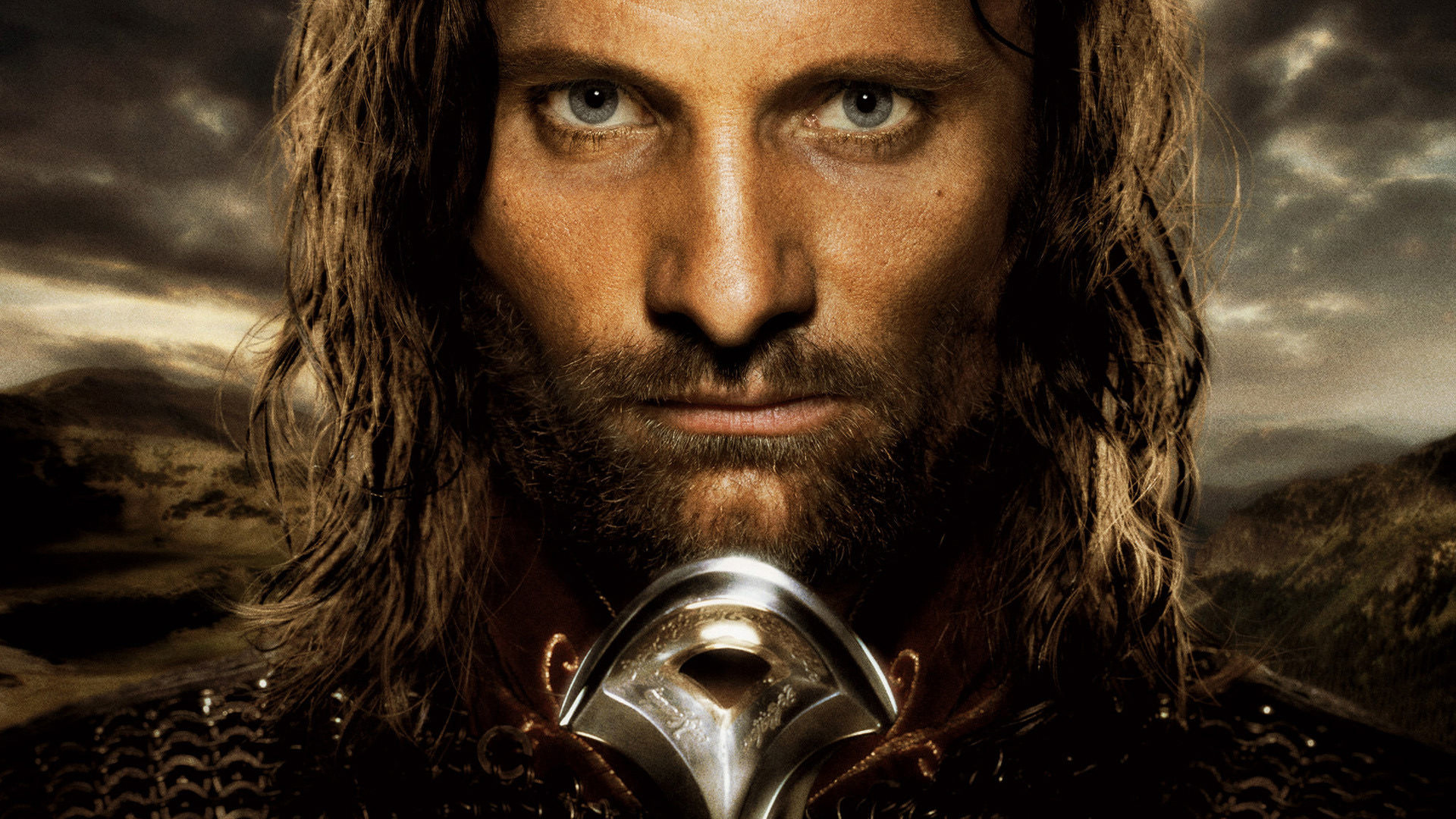
Rohirrim
The Rohirrim or Horse Lords rule the land of Rohan, ancient ally of Gondor. They are the only Men remaining who breed and can tame the Mearas, greatest of all horses, and rule over all their lesser kin. The Rohirrim are true to their name, and few among Men or Elves are capable of matching them on horseback. Theodan and Eowyn are numbered among the Rohirrim.
- Special Abilities: Rohirrim begin with one rank in Riding. You may train Riding up to rank 3 during character creation.
- Horse Lords: Rohirrim remove bb from all Riding and Survival checks to deal with horses and other mounts.
Men of the Lake
Situated between the dwarven kingdom of Erebor and the elven realm of Mirkwood, the Men of the Lake trade freely with Men, Elves, and Dwarves alike. Living in a town built atop a lake has made them skilled boatsmen, just as their position has led to them becoming naturally skilled merchants. The Bardings of Dale are still very much like their kindred on the Long Lake. Bard the Bowman was numbered among the Men of the Lake.
- Special Abilities: Men of the Lake begin with one rank in Operating. You still cannot train their Operating above rank 2 during character creation.
- Lake-Men: Suffer no penalties from moving through water or swampland.
- Shrewd Deals: When selling goods legally or illegally, gain 10% more gold.
Bree-landers
Generally quite folk, Bree-landers rarely travel but are welcome to travelers. Originally of Dunlandish stock, they are much more civilized then their cousins in Dunland but are still strong, hardy folk.
- Special Abilities: Bree-landers begin with one rank in Cool. You still cannot train their Cool above rank 2 during character creation.
- Hardy Folk: Bree-landers remove up to bb to checks due to Critical Injuries or the disoriented condition.
Elves
The Eldar, the Firstborn of Eru, were born in the days before the Sun and Moon, when the world was lit only by the stars. They have an unearthly grace and never age, immune to illness and the passage of time, living until the end of the world unless they are slain in battle. As the time of the elves comes to an end, they grow weary of the world. Many take ships into the West, never to return.
- Wound Threshold: 10 + Brawn
- Strain Threshold: 8 + Willpower
- Starting Experience: 70 XP
- Fading of the Firstborn: Add h to all Willpower-based checks.
- Elven Grace: Elves do not suffer penalties for moving through difficult terrain.
- Keen Eyes: Elves see twice as far as other races and when making skill checks, elves remove up to bb imposed due to darkness.
Noldor (Deep Elves/High Elves)
The Noldor were among the three tribes of the Eldar to first travel into the West and beheld the light of the Two Trees. In Valinor they grew in knowledge and beauty, becoming the High Elves, greater than those who remained behind. However, the first Dark Lord Morgoth came to Valinor with the dark monster Ungoliant, who drained the light of the Trees while Morgoth stole the Silmarils, the greatest treasures ever crafted by the Elves.
The Noldor, greatest in knowledge and craftsmanship, who had forged the Silmarils, swore to hunt the Dark Lord. As they left to return to Middle Earth, Mandos, doomsman of the Valar, prophesied that their vow would ruin them, and "to evil end shall all things turn that they begin well," a prophecy that has proven far too true. Elrond, Galadriel, and Celebrimbor are numbered among the Noldor.
- Special Abilities: Noldorin elves begin with one rank in Knowledge (Lore). You still cannot train their Knowledge (Lore) above rank 2 during character creation.
- Doom of Mandos: Once per session, when a Noldor character makes a skill check, the GM may spend a Story Point to add d to the check.
- Beauty of the High Elves: Noldor decrease the difficulty of all Charm, Negotiation, and Leadership checks by 1.
- Light of Valinor: Noldor can see and interact with the Unseen World, dealing full damage to enemies with the Wight or Wraith quality. When beginning an encounter with a creature of evil, Noldor can force them to make a Hard (ddd) Fear check as an incidental.
- Knowledge of the Noldor: Noldor add b to all Crafting and Knowledge (Lore) checks.
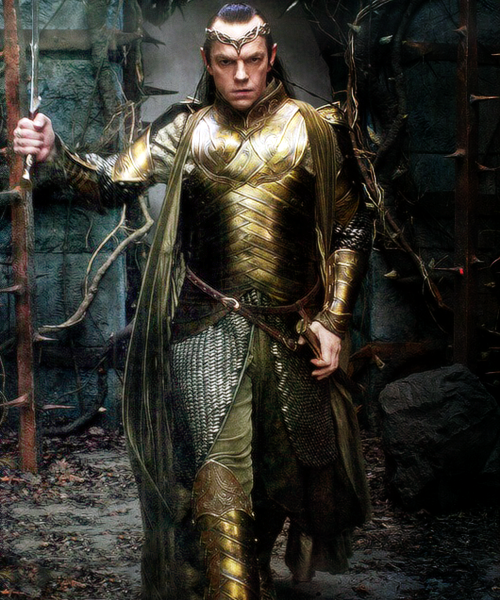
Sindar (Grey Elves)
The Sindar began the journey to Valinor, crossing over the Misty Mountains to Beleriand. However, they never sailed across the sea and finished the journey. They were the greatest of the elves to remain, and can often be found as rulers among their Silvan brethren. In the depths of their hearts, all Sindar feel the pull of the sea, and while many remain in Lindon and the Grey Havens for a time, all eventually take the journey West that they failed to finish all those millennia ago. Legolas, Celeborn, and Cirdan the Shipwright are numbered among the Sindar.
- Special Abilities: Sindarin elves begin with one rank in Operating. You still cannot train their Operating above rank 2 during character creation.
- Lords of the Umanyar: Sindarin elves add b to all Leadership checks.
Silvan Elves (Wood Elves)
The Silvan Elves all either never began the journey to Valinor or didn't travel far, never reaching beyond the Misty Mountains. They love the stars and the woods most, above the sun or the sea or beautiful things made with hands. The have been described as "less wise and more dangerous" than their high-elven kin, and there are few who know the wild places of the world better than they. The majority of the elves of Mirkwood and Lorien are numbered among the Silvan Elves.
- Special Abilities: Silvan elves begin with one rank in Perception. You still cannot train their Perception above rank 2 during character creation.
- Elves of the Wood: Silvan elves add b to all Survival checks.
Dwarves
The Dwarves are not born of Eru, but were instead created by Aulë, the smith of the Valar. When Eru learned of Aulë's creation He chastised him, as only Eru could create beings with free will. However, having mercy on the Vala's children, Eru gifted the dwarves with free will. Because of this, some refer to them as the adopted children of Eru.
Of the seven Dwarf Clans, the most numerous in Middle Earth are the Longbeard's. also known as Durin's Folk. They are a hardy people, short, stout, strong, and stubborn, with a love of gold, jewels, and all things made by skilled hands. Of all the Free Peoples, only the Noldor can match the dwarves in craftsmanship. However, their love of gold has led to much grief, as many great dwarven kingdoms have fallen by wrath and dragonfire.
- Wound Threshold: 11 + Brawn
- Strain Threshold: 10 + Willpower
- Starting Experience: 90 XP
- Special Abilities: Dwarves begin with one rank in Resilience. You still cannot train their Resilience above rank 2 during character creation.
- Dwarven Craftsmanship: Dwarves remove bb from all Crafting checks.
- Tough as Nails: Once per session, a dwarf character may spend a Story Point as an out-of-turn incidental immediately after suffering a Critical Injury and determining the result. If they do so, they count the result rolled as "01."
Hobbits
Not much is known of the origins of hobbits, not that many care to ask. Hobbits are simple folk, and love food and comfort above all else. They are very short, smaller even than the dwarves, though not nearly as stout. They have an uncanny ability to move silently, which proves quite useful when Big Folk come blundering around. While not particularly mighty or powerful, hobbits have a courage that surprises those unfamiliar with them.
- Wound Threshold: 9 + Brawn
- Strain Threshold: 11 + Willpower
- Starting Experience: 100 XP
- Special Abilities: Hobbits begin with one rank in Stealth. You still cannot train their Stealth above rank 2 during character creation.
- Little Folk: Hobbits are the smallest of the Free Peoples and count as silhouette 0.
- Courage of Hobbits: When making a Discipline check, a hobbit character may downgrade the check by one.
Beornings
The Beornings were once men, or so it is said. They look much like other men, though far taller and thicker around. However, I know of few among the Race of Men capable of changing into the shape of a great bear at will. It is unknown how they came by this gift, and they aren't likely to tell you. Beornings are insular folk, liking to stick to themselves more often than not, only begrudingly allowing strangers into their midsts. The greatest of their race was their namesake Beorn, who fought and turned the tide in the Battle of the Five Armies.
- Wound Threshold: 12 + Brawn
- Strain Threshold: 8 + Willpower
- Starting Experience: 95 XP
- Special Abilities: Beornings begin with one rank in Discipline. You still cannot train their Discipline above rank 2 during character creation.
- Bear-Form: Once per session, Beornings may make a Hard (ddd) Discipline check to unleash their bear form, increasing their Brawn by 1 and decreasing their Intellect by 1, as well as giving their unarmed attacks +2 damage, a Crit rating of 3, and the Pierce 1 and Vicious 2 qualities. The difficulty of all social checks are upgraded twice, except for Coercion, which has its ability upgraded twice. They remain in bear form until they are incapacitated, after eight hours have passed, or after they make an Average (dd) Discipline check to change back.

Careers
The Free Peoples of Middle Earth come from all walks of life, and to attempt to classify all of them by putting them into easily-labeled Careers would be folly. Personally, I would highly recommend GMs allow their players to create their own "Careers", using the eight listed here as a guideline. However, if individual GMs feel the need to classify their players into Careers, then I worked to make the available careers feel like they were truly a part of Tolkien's world.
Burglar
When the word Burglar is said, there is one name that springs to mind: Bilbo Baggins. While hardly considered Burglar material at the beginning of his quest, Bilbo had many of the qualities required for a good Burglar. Burglars need to be sneaky and able to squeeze out of tight spots, able to trick others, and of course do some burglaring. They are also often good with knives and short swords and have keen eyes and ears.
Cool, Coordination, Deception, Melee (Light), Perception, Skulduggery, Stealth, Streetwise
Craftsman
The elves and dwarves are both famed for their Craftsmen, and in the Second Age the Men of Numenor grew skilled in their own manners of craft. Craftsmen have shaped the fate of Middle Earth, as Feanor is famed for his crafting of the Silmarils, and his descendant Celebrimbor is known for his forging of the Rings of Power. Craftmen need to be strong and resilience while working in the forge, and of course need to know how to get the best price, if they are willing to sell their work of course.
Athletics, Discipline, Crafting, Knowledge (Lore), Negotiation, Perception, Resilience, Streetwise
Captain
History and legend are filled with great leaders of Men, Elves, and Dwarves. From the Elven High King Gil-galad to Boromir, Captain of Gondor, Captains are the ones leading the battle against the Shadow. Captains do not shout orders from behind, but lead from the front, charging into battle alongside their brothers-in-arms. They must be skilled in all the arts of war and be able to stand strong and inspire the men they lead into battle.
Athletics, Discipline, Leadership, Melee (Heavy), Melee (Light), Resilience, Riding, Vigilance
Loremaster
Among the Wise, none are more respected than the Loremasters. They have spent much time in all manner of studies, from craftsmanship and medicine to ancient legends, and in some cases even the dark secrets of the Enemy. They are the wisest and most learned of the Free Peoples, with Elrond Halfelven and Saruman the White greatest among their number.
Cool, Crafting, Discipline, Knowledge (Lore), Knowledge (Forbidden), Medicine, Melee (Light), Vigilance
Mariner
While the West may be hidden from all but the elves, the Eldar are not the only people to feel the call of the sea. Cirdan the Shipwright and Eärendil the Mariner are greatest among their number, with Eärendil's skill so great that he now sails through the heavens, bearing aloft one of the Silmarils as the Evening Star.
Cool, Discipline, Siege, Knowledge (Adventuring), Leadership, Operating, Perception, Vigilance
Merchant
Not all of the Free Peoples in Middle Earth are great warriors, leaders, or masters of lore. However, while their deeds are not often mentioned in song, Merchants are a necessary part of the world, helping to bring the peoples of Middle Earth together through trade. Without Merchants, the riches of Erebor would never be seen beyond the Lonely Mountain, and the Free Peoples would be even more divided.
Charm, Cool, Deception, Knowledge (Adventuring), Negotiation, Perception, Streetwise, Vigilance
Ranger
While the Rangers of the North such as Aragorn are certainly the most famous of those to bear the title of Ranger, they are not the only ones who can be called Ranger. All those skilled in the ways of the Wild take the path of the Ranger, from the Dunedain of the North to many of the elves of Mirkwood, such as their prince Legolas Greenleaf. Rangers need to understand the Wild and be prepared to face any dangers that are to be found.
Athletics, Coordination, Knowledge (Adventuring), Melee (Light), Perception, Ranged, Stealth, Survival
Soldier
As much as great leaders and learned men are needed, no war can be won without Soldiers. These are the men on the front lines, fighting every day to protect the Free Peoples of Middle Earth, often with no songs to sing their sacrifice. Soldiers must be disciplined and resolute, able to understand and wield any weapon placed into their hands.
Warriors such as Gimli can be considered examples of Soldiers, but more often these men go unnamed, though they care little about such things. They care only that the people of Middle Earth are kept safe from the Shadow.
Athletics, Coercion, Melee (Heavy), Melee (Light), Ranged, Riding, Siege, Vigilance
Skills
General:
Athletics (Br)
Cool (Pr)
Coordination (Ag)
Crafting (Int) - (Replaces Mechanics)
Discipline (Will)
Medicine (Int)
Perception (Cun)
Resilience (Br)
Riding (Ag)
Skulduggery (Cun)
Stealth (Ag)
Streetwise (Cun)
Survival (Cun)
Vigilance (Will)
Combat:
Brawl (Br)
Melee - Heavy (Br)
Melee - Light (Br)
Ranged (Ag)
Siege (Int) - (Replaces Gunnery)
Talents
Tier 1
Apothecary
Tier: 1
Activation: Passive
Ranked: Yes
When a patient under your character's care heals wounds from natural rest, they heal additional wounds equal to twice your character's ranks in Apothecary.
Bullrush
Tier: 1
Activation: Active (Incidental)
Ranked: No
When your character makes a Brawl, Melee (Light), or Melee (Heavy) combat check after using a maneuver to engage a target, you may spend aaa or t to use this talent to knock the target prone and move them up one range band away from your character.
Challenge!
Tier: 1
Activation: Active (Maneuver)
Ranked: Yes
Once per encounter, your character may use this talent to choose a number of adversaries within short range no greater than your character's ranks in Challenge! (a minion group counts as a single adversary for this purpose). Until the encounter ends or your character is incapacitated, these adversaries add b to combat checks targeting your character and bb to combat checks targeting other characters.
Dungeoneer
Tier: 1
Activation: Passive
Ranked: Yes
After your character makes a Perception, Vigilance, or Knowledge (Adventuring) check to notice, identify, or avoid a threat in a cavern, subterrean ruin, or similar location, your character cancels a number of uncanceled a no greater than your character's ranks in Dungeoneer.
Finesse
Tier: 1
Activation: Active (Incidental)
Ranked: No
When making a Brawl or Melee (Light) check, your character may use Agility instead of Brawn.
Painful Blow
Tier: 1
Activation: Active (Incidental)
Ranked: No
When your character makes a combat check, you may voluntarily increase the difficulty by one to use this talent. If the target suffers one or more wounds from the combat check, the target suffers 2 strain each time they perform a maneuver until the end of the encounter.
Precision
Tier: 1
Activation: Active (Incidental)
Ranked: No
When making a Brawl or Ranged check, your character may use Cunning instead of Brawn and Agility.
Rapid Recovery
Tier: 1
Activation: Passive
Ranked: Yes
When the character recovers strain after an encounter has concluded, he recovers one additional strain per rank in Rapid Recovery.
Shield Slam
Tier: 1
Activation: Active (Incidental)
Ranked: No
When your character uses a shield to attack a minion or rival, you may spend aaaa or t to stagger the target until the end of the target's next turn.
Strong Arm
Tier: 1
Activation: Passive
Ranked: No
Treat thrown weapons as if they had one step greater range, to a maximum of Medium range.
Tavern Brawler
Tier: 1
Activation: Passive
Ranked: No
Your character adds a to Brawl checks and combat checks using improvised weapons.
Tumble
Tier: 1
Activation: Active (Incidental)
Ranked: No
While engaged with one or more Adversaries, may suffer 2 strain to move to short range as an incidental.
Tier 2
Adventurer
Tier: 2
Activation: Passive
Ranked: No
Athletics and Knowledge (Adventuring) are now career skills for your character.
Ancient Lore
Tier: 2
Activation: Passive
Ranked: No
Knowledge (Lore) and Medicine are now career skills for your character.
Block
Tier: 2
Activation: Active (Incidental, Out of Turn)
Ranked: No
Your character must have purchased the Parry talent to benefit from this talent. While wielding a shield, your character may use the Parry talent to reduce damage from ranged attacks as well as melee attacks targeting your character.
Bulwark
Tier: 2
Activation: Active (Incidental, Out of Turn)
Ranked: No
Your character must have purchased the Parry talent to benefit from this talent. While wielding a weapon with the Defensive quality, your character may use Parry to reduce the damage of an attack targeting an engaged ally.
Commander
Tier: 2
Activation: Passive
Ranked: No
Cool and Leadership are now career skills for your character.
Dirty Tricks
Tier: 2
Activation: Active (Incidental)
Ranked: No
After your character inflicts a Critical Injury on an adversary, they may use this talent to upgrade the difficulty of that adversary's next check.
Encouraging Song
Tier: 2
Activation: Active (Action)
Ranked: No
While equipped with a musical instrument, your character may use this talent to make an Average (dd) Charm check. For each s the check generates, one ally within medium range adds b to their next skill check. For each a, one ally benefiting from Encouraging Song heals 1 strain.
Exploit
Tier: 2
Activation: Active (Incidental)
Ranked: Yes
When your character makes a combat check with a Ranged or Melee (Light) weapon, they may suffer 2 strain to use this talent to add the Ensnare quality to the attack. The rating of the Ensnare quality is equal to your character's ranks in Exploit.
Feral Strength
Tier: 2
Activation: Passive
Ranked: Yes
Add +1 damage to Brawl, Melee (Light), and Melee (Heavy) checks per rank in Feral Strength.
Flash of Insight
Tier: 2
Activation: Passive
Ranked: No
When your character generates t on a knowledge skill check, roll bb and add the results to the check, in addition to spending the t as usual.
Grapple
Tier: 2
Activation: Active (Incidental)
Ranked: No
Your character may suffer 2 strain to use this talent. Until the start of your character's next turn, enemies must spent two maneuvers to disengage from your character.
Heroic Recovery
Tier: 2
Activation: Active (Incidental)
Ranked: No
When your character acquires this talent, choose one characteristic. Once per encounter, you may spend one Story Point to use this talent to have your character heal strain equal to the rating of the chosen characteristic.
Hunter
Tier: 2
Activation: Passive
Ranked: No
Knowledge (Adventuring), Ranged, and Survival are now career skills for your character.
Impaling Strike
Tier: 2
Activation: Active (Incidental)
Ranked: No
When your character inflicts a Critical Injury with a melee weapon, until the end of the target's next turn they may use this talent to immobilize the target (in addition to the other effects of the Critical Injury).
Reckless Charge
Tier: 2
Activation: Active (Incidental)
Ranked: No
After using a maneuver to engaged an adversary, your character may suffer 2 strain to use this talent. They then add sshh to the results of the next Brawl, Melee (Light), or Melee (Heavy) combat check they make this turn.
Stunning Blow
Tier: 2
Activation: Active (Incidental)
Ranked: No
When making a Melee check, may inflict damage as strain instead of wounds (does not ignore soak).
Threaten
Tier: 2
Activation: Active (Incidental, Out of Turn)
Ranked: Yes
After an adversary within short range of your character resolves a combat check that deals damage to one of your character's allies, your character may suffer 3 strain to use this talent to inflict a number of strain on the adversary equal to your character's ranks in Coercion. The range of this talent increases by one band per rank of Threaten beyond the first.
Tinkerer
Tier: 2
Activation: Passive
Ranked: Yes
May add 1 additional hard point to a number of items equal to ranks in Tinkerer. Each item may only be modified once.
Well-Traveled
Tier: 2
Activation: Passive
Ranked: No
Knowledge (Adventuring), Negotiation, and Vigilance are now career skills for your character.
Wraithbane
Tier: 2
Activation: Passive
Ranked: No
Your character counts the Critical rating of their weapon as one lower to a minimum of 1 when making an attack targeting an undead adversary.
Tier 3
Armor Master
Tier: 3
Activation: Passive
Ranked: No
When wearing armor, increase total soak value by 1.
Backstab
Tier: 3
Activation: Active (Action)
Ranked: No
Your character may use this talent to attack an unaware adversary using a Melee (Light) weapon. A Backstab is a melee attack, and follows the normal rules for performing a combat check (see page 101 of the Genesys Core Rulebook), using the character's Skuduggery skill instead of Melee (Light). If the check succeeds, each uncanceled s adds +2 damage (instead of the normal +1).
Bodyguard
Tier: 3
Activation: Active (Maneuver)
Ranked: Yes
Once per round, may suffer a number of strain no greater than ranks in Body Guard to use this talent. Choose one ally engaged with your character; until the end of your character's next turn, upgrade the difficulty of all combat checks targeting that ally a number of times equal to the strain suffered.
Careful Planning
Tier: 3
Activation: Active (Incidental)
Ranked: No
Once per game session, the character can choose to introduce a “fact: or additional context directly into the narrative as if he had spent a Story Point.
Cavalier
Tier: 3
Activation: Maneuver
Ranked: No
While riding a mount trained for battle, once per round your character may use this talent to direct the mount to perform an action.
Counterattack
Tier: 3
Activation: Active (Incidental, Out of Turn)
Ranked: No
Your character must have purchased the Improved Parry talent to benefit from this talent. When your character uses the Improved Parry talent to hit an attacker, they may also activate an item quality of the weapon they used as if they had generated aa on a combat check using that weapon.
Deadly Accuracy
Tier: 3
Activation: Passive
Ranked: No
Choose one combat skill. The character may add his ranks in that combat skill as additional damage to one hit of a successful attack made with that skill made with non-vehicle weapons.
Dissonance
Tier: 3
Activation: Active (Action)
Ranked: No
While wielding a musical instrument, your character may use this talent to make an Average (dd) Charm check. For each s the check generates, one enemy of the player's choosing within medium range suffers 1 wound. For each a, one enemy affected by Dissonance suffers 1 additional wound.
Dual Strike
Tier: 3
Activation: Active (Incidental)
Ranked: No
When resolving a combined check to attack with two weapons in a melee combat, your character may suffer 2 strain to use this talent to hit with the secondary weapon (instead of spending aa).
Easy Prey
Tier: 3
Activation: Active (Maneuver)
Ranked: No
Your character may suffer 3 strain to use this talent. Until the start of your character's next turn, your character and allies within short range add bb to combat checks against immobilized targets.
Freerunning
Tier: 3
Activation: Active (Maneuver)
Ranked: No
Suffer 1 strain when making a Move maneuver to move to any location within short range.
Frenzied Attack
Tier: 3
Activation: Active (Incidental)
Ranked: Yes
When making a Melee or Brawl check, suffer a number of strain to upgrade the attack an equal number of times. The strain suffered may not exceed ranks in Frenzied Attack.
Lethal Blows
Tier: 3
Activation: Passive
Ranked: Yes
Add +10 per rank of Lethal Blows to any Critical Injury results inflicted on opponents.
Nobody’s Fool
Tier: 3
Activation: Passive
Ranked: Yes
May upgrade difficulty of incoming Charm, Coercion, or Deception checks once per rank of Nobody’s Fool.
Precise Aim
Tier: 3
Activation: Active (Maneuver)
Ranked: Yes
Once per round, may perform Precise Aim maneuver. Suffer a number of strain no greater than ranks in Precise Aim, then reduce target’s melee and ranged defense by that number.
Precise Archery
Tier: 3
Activation: Passive
Ranked: No
When making a Ranged combat check targeting a character engaged with one of your character's allies, downgrade the difficulty of the check once (thus negating the penalty for shooting at engaged targets).
Shockwave
Tier: 3
Activation: Passive
Ranked: No
Your character treats Melee (Heavy) weapons as possessing the Blast item quality with a rating equal to your character's ranks in Melee (Heavy). Your character does not suffer damage from their weapon's Blast quality (but allies do!).
Touch of Fate
Tier: 3
Activation: Active (Incidental)
Ranked: No
Once per game session, the character may add bb to any one skill check.
Unarmed Parry
Tier: 3
Activation: Passive
Ranked: No
May Parry while unarmed. Reduce strain cost to Parry while unarmed by 1 (to a minimum of 1).
Valuable Facts
Tier: 3
Activation: Active (Action)
Ranked: No
Once per encounter, the character may make a Hard Knowledge check. If successful, the character may add t to any one check made by an allied character during the encounter. The subsequent check should relate in some way to the facts the character learned, or the player should come up with an explanation for why the information the character learned is instrumental in the success of the ally’s check.
Tier 4
Armor Master (Improved)
Tier: 4
Activation: Passive
Ranked: No
Your character must have purchased the Armor Master talent to benefit from this talent. When wearing armor with a soak value of 2 or higher, increase defense by 1.
Back-to-Back
Tier: 4
Activation: Passive
Ranked: No
While engaged with one or more allies, your character and allies they are engaged with add b to combat checks. If one or more allies engaged with your character also have Back-to-Back, the effects are cumulative to a maximum of bb.
Death Rage
Tier: 4
Activation: Passive
Ranked: No
Your character adds +2 damage to melee attacks for each Critical Injury they are currently suffering. (Your GM may also impost additional penalties on social checks your character makes if they are suffering Critical Injuries due to their frenzied behavior.)
Intense Focus
Tier: 4
Activation: Active (Maneuver)
Ranked: No
Before making a skill check, may perform the Intense Focus maneuver. Suffer 1 strain and upgrade the ability of the skill check once.
Savage Sweep
Tier: 4
Activation: Active (Incidental)
Ranked: No
Increase difficulty of Melee or Brawl check by 1 to perform Savage Sweep action. May spend aa to hit additional engaged targets.
Unrelenting
Tier: 4
Activation: Active (Incidental)
Ranked: No
Once per round after resolving a successful Brawl, Melee (Light), or Melee (Heavy) combat check, your character may suffer 4 strain to use this talent to make an additional melee attack as an incidental against the same target. Increase the difficulty of the combat check by one if this attack uses a second weapon, or by two if the attack uses the same weapon.
Tier 5
Coordination Dodge
Tier: 5
Activation: Active (Incidental)
Ranked: No
When targeted by a combat check, may spend 1 Story Point to add f equal to ranks in Coordination to check.
Crushing Blow
Tier: 5
Activation: Active (Incidental)
Ranked: No
Once per session after rolling a melee attack but before resolving the check, your character may suffer 4 strain to use this talent. While resolving the check, the weapon gains the Breach 1 and Knockdown item qualities, and destroys one item the target is wielding that does not have the Reinforced quality.
Let's Talk This Over
Tier: 5
Activation: Active (Incidental, Out of Turn)
Ranked: No
Once per game session, when a combat encounter against one or more sentient beings is about to begin, your character may make a Daunting (dddd) Charm check. If successful, the combat encounter instead becomes a social encounter, with the PCs attempting to convince their opposition to back down, come around to their viewpoint, or accept a compromise. The GM is the final arbiter of how the situation resolves without violence (or how the combat encounter continues if the character's check is unsuccessful).
Retribution
Tier: 5
Activation: Active (Incidental, Out of Turn)
Ranked: No
Once per round when an adversary attacks an ally within medium range, your character may spend one Story Point to use this talent to automatically hit that enemy once with a weapon your character is wielding, if the enemy is within the weapon's range. The hit deals the weapon's base damage, plus any damage from applicable talents or abilities.
Superhuman Skill
Tier: 5
Activation: Active (Incidental)
Ranked: No
When purchased, choose a skill. Once per session, when rolling d on a check with that skill, spend a Story Point to remove the d and replace it with a number of s equal to ranks in that skill.
Whirlwind
Tier: 5
Activation: Active (Action)
Ranked: No
Your character may suffer 4 strain to use this talent to make a Brawl, Melee (Light), or Melee (Heavy) attack against the engaged adversary who is hardest to hit (as determined by the GM), increasing the difficulty by one. If the combat check succeeds, each adversary engaged with the character suffers one hit from the attack, that deals base damage plus damage equal to the total s scored on the check.
Zealous Fire
Tier: 5
Activation: Active (Passive)
Ranked: No
Each time your Game Master spends a Story Point, your character heals 2 strain.
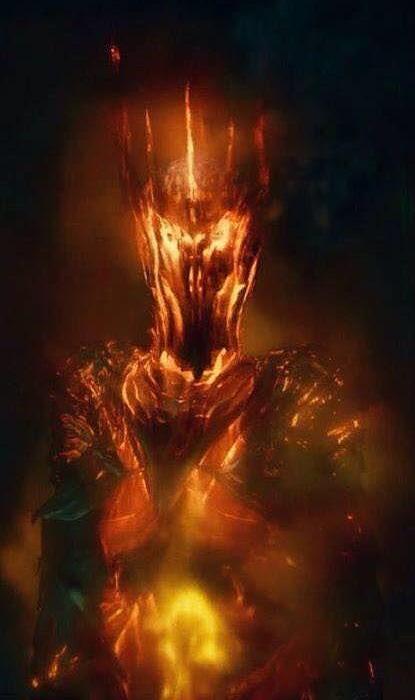
Heroic Abilities
Player characters are heroes, with unique capabilities that set them apart from the ordinary inhabitants of Middle Earth. When you create your Genesys character for Adventures in Middle Earth, you also choose a Heroic Ability for your character during Step 4 of character creation (see page 44 of the Genesys Core Rulebook). Each player character has only one Heroic Ability, which helps set them apart as a hero. As your character grows in experience, they receive ability points, which you spend on upgrades that further customize your character’s Heroic Ability.
Using a Heroic Ability
Heroic Abilities are quite powerful, so there are some pretty significant limitations on when you can use them. However, one of the ways you can customize your Heroic Ability is by spending ability points to reduce these restrictions.
By default, activating a Heroic Ability requires you to spend 2 Story Points. The effects of the Heroic Ability last until the end of your character’s next turn, and you can only activate it once per session. Unless stated otherwise in the description of a specific effect, activating a Heroic Ability is an incidental.
Creating a Heroic Ability
To create your Heroic Ability, you'll need to follow a series of simple steps. Once you finish, you will have a Heroic Ability tailored to your character.
-
Choose Primary Ability Effect: The primary effect is the core of your Heroic Ability. It defines what the ability does when you activate it. Even at the base level, these effects are potent.
-
Determine Your Ability’s Origin: How does your character come by their extraordinary abilities? You can make something up or roll randomly to determine the origin of your Heroic Ability.
-
Name Your Ability: Every Heroic Ability needs a unique, evocative name!
Choose a Primary Ability Effect
A primary ability effect is the core of a Heroic Ability. The effect tells you what your ability does—the benefit your character from activating it. A Heroic Ability gets only one primary ability effect, so choose carefully! Your character receives the benefits for the base ability, unless you spend ability points to upgrade to the improved or supreme version. Unless stated otherwise, the benefits of
each level of the effect are cumulative, so if you spend ability points for the improved effect, your character still get all the benefits of the base effect.
When deciding on a primary ability effect, look to your character’s concept and what you know about them already. Their Heroic Ability is central to who your character is, and why they adventure. It helps define your character.
All the Facts
Your character has a knack for knowing vital information when it is needed. They might pick up on significant clues others missed at the scene of a crime, or recall an ancient Elven song that sheds light on a situation. Whether your character remembers information they already know or discovers something in the moment, their ability to do so is extraordinary. It could be thanks to an eidetic memory, years of study, enhanced senses, or anything else.
Base: While this ability is active, during each of their turns your character learns (or remembers) an important fact about a situation, person, creature, place, or object of their choice. The subject of the information must be either observable by your character or directly relevant to the situation.
Improved: Additionally, while this ability is active your character upgrades the ability of all checks they make once if the check relates to the new information.
GM Advice: Resisting Heroic Abilities
Many Heroic Abilities directly affect NPCs, and the impact can be significant. For the most part, NPCs targeted by a character using a Heroic Ability do not have an opportunity to try to resist or avoid the Heroic Ability’s effects. Usually, this is a good thing; the PCs are the heroes of the story, and Heroic Abilities exist to showcase this.
However, you might want to allow some important NPCs, particularly nemeses, to attempt to avoid the full effects of a Heroic Ability. Rather than simply having the NPC roll a skill check to resist a Heroic Ability’s effect, you might consider having the PC who is using the Heroic Ability make an opposed check against the NPC. The adversary resists with Discipline if they are using force of will or intellect, or Resilience if they are using physical strength.
Supreme: For each fact you learn using the ability, you gain a temporary Story Point that you or another player may spend before the end of the session. A temporary Story Point is removed from the pool when it is used, but it is not converted to a GM Story Point. When you use these temporary Story Points, describe how the information your character learned or provided benefits the group.
Connected
Your character seems to know everyone—or at least everyone who’s worth knowing. Many people who are highly placed or just plain powerful owe you favors, and you can call these in when the time is right. Alternatively, your character might have blackmail information or other leverage over such NPCs.
Base: When your character activates this ability, choose one NPC and reveal that they owe your character a favor. Work with the GM to establish the relevant details of the existing relationship between your character and the NPC. In some cases, the GM might determine that there is just no way you could know the NPC in question, in which case your Heroic Ability does not activate (you don’t spend any Story Points, and you can still activate it later in the session). The NPC won’t risk their life or kill anyone as the favor. They also won’t do something that’s obviously going to ruin their social standing, finances, or so on. However, your character might be able to convince them there is no such risk!
Improved: While this ability is active, your character downgrades the difficulty of all social skill checks they make once.
Supreme: While this ability is active, when an intelligent adversary declares your character the target of an attack, as an out-of-turn incidental you may force the adversary to choose a different target instead.
Foretelling
Your character possesses mystical means of predicting future events, or lives their life in pursuit of an ancient prophecy—of which they might even be the subject. Whether through interpreting others’ dreams, seeing omens in the movement of animals, scrying in a watery mirror, or interpreting the words of ancient seers, your character has access to useful information about events in progress and those yet to happen.
Heroic Abilities in the Narrative
Although Heroic Abilities have to be activated and last only for a short time, at the GM’s discretion, characters may receive some small, narrative benefit from an ability at all times, not only when it is activated. After all, a character’s Heroic Ability says something important about who they are, and is likely to have an impact on much of what they do. However, it’s important that these minor considerations don’t duplicate or rival the benefits provided by activating a Heroic Ability.
The Sixth Sense effect is a good example. If a character can speak with animals, they might be able to do so at any time—although there is no guarantee they will receive useful information without activating their ability! On the other hand, if a character can read thoughts, the GM might decide that it requires a high degree of focus, or even that external circumstances have to be just right. Similarly, if a character’s primary ability effect is Connected, the player and GM might decide that the character already knows many of the NPCs encountered in the game, even though they don’t all owe the character a significant favor.
Base: Each round while this ability remains active, each round you may ask the GM one yes-or-no question about knowledge your character doesn’t have any mundane or logical reason to possess, which the GM must answer truthfully. Your character gains this information through whatever esoteric means are appropriate. (Acting on this information is another matter entirely, of course. You can’t go around accusing nobles of crimes without evidence just because you saw it in a vision!)
Improved: While this ability is active, you may reroll one skill check relevant to a question you asked the GM.
Supreme: Once, while this ability is active, when an NPC makes a skill check you can roll an identical dice pool and choose to substitute its results for the NPC’s check.
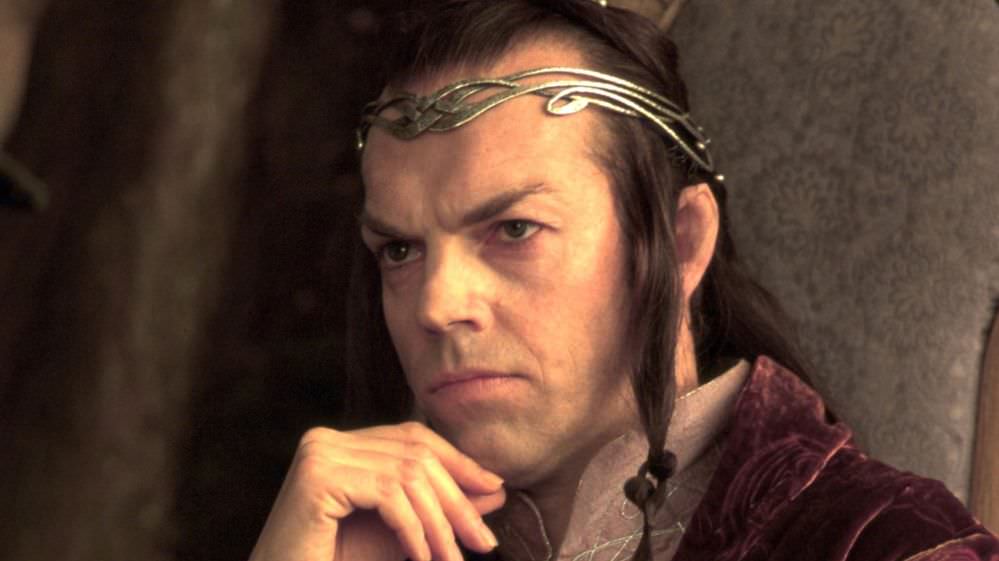
Hard to Kill
When your character steels their resolve and tightens their grip on weapon or staff, they can shrug off the worst the enemy throws at them. In moments of dire import, they face down overwhelming opposition without taking a scratch. This might represent raw toughness and the will to power through, or it might be an effect of magic.
Base: While this ability is active, your character gains +4 soak.
Improved: While this ability is active, your character also increases the difficulty of combat checks targeting them by one.
Supreme: While their Heroic Ability is active, your character becomes immune to damage; reduce all damage the character suffers to 0.
Influential
Your character is an unparalleled orator, impossibly charming, or even possessed of a supernatural ability to influence others. Whether through lying, impassioned speeches, moving poetry recitations, or any number of methods, your character gets people to do what they want.
Base: While this ability is active, when your character uses a social skill to inflict strain during a social encounter (see page 118 of the Genesys Core Rulebook), they inflict additional strain equal to their characteristic linked to the skill. If the social encounter is resolved with a single skill check, your character instead adds a number of s equal to their characteristic linked to the skill.
Improved: While this ability is active, your character only needs to spend aa to trigger a “critical remark” (see the sidebar on page 123 of the Genesys Core Rulebook) and inflict 5 strain on the target. Your character can inflict multiple critical remarks with a single check.
Supreme: While this ability is active during a social encounter, your character also reduces any strain they suffer by an amount equal to their Presence or their ranks in Cool (whichever is higher). This reduction applies to skill checks, talents, and abilities that inflict strain, but it applies only during a social encounter and does not apply to strain your character suffers voluntarily.
Miraculous Recovery
Your character’s injuries often turn out to be not as bad as they look, or perhaps your character actually heals physical wounds so rapidly as to defy explanation. In any case, they have a tendency to walk away from bloody fights with nothing more than scratches.
Base: When your character activates this ability, and at the beginning of their turn each round while it remains active, your character heals 3 wounds.
Improved: When you activate this ability, your character heals all current wounds they are suffering.
Supreme: When you activate this ability, your character heals one Critical Injury they are suffering.
Paragon
When it comes to a particular skill, your character is simply the best. Whether their abilities really are supernatural (or just seem that way), your character always achieves the check they want when it really counts. More importantly, even when things could go disastrously wrong, they never do.
Base: When you select this primary ability effect, choose one skill. While this ability is active, after rolling the dice for a check using that skill but before resolving the results, you may remove d of your choice from the pool. (Ignore the symbols shown on that die when resolving the check.)
Improved: While this ability is active, you may also remove b of your choice from the results of checks using your chosen skill.
GM Advice: Adjudicating Heroic Abilities
While all Heroic Abilities have an important narrative impact, some abilities have a stronger or entirely narrative effect. While it’s simple to resolve the use of abilities that directly interact with the mechanics of the game, primary ability effects like Foretelling and Connected can leave a lot up to the GM. As the GM, you should resolve these abilities in much the same way as any other activity the PCs undertake that doesn’t call for a skill check, or any other question the players might ask about the setting.
While these effects do place certain restrictions on your response, they also allow plenty of freedom to resolve the use of an ability in the way that works best for your game and campaign. The favor a PC gains by using Connected or the knowledge they gain through All the Facts provide opportunities for you to keep the action on track by providing the PCs with the information or opportunity they need to progress the adventure. However you choose to resolve the ability, just make sure the player gains the benefit they expect from their chosen ability and that it has a suitably heroic impact on the game!
Supreme: While this ability is active, you may remove c instead of d from the results of checks you make using the chosen skill.
Sixth Sense
Your character possesses a rare, maybe even unique, capacity to perceive that goes beyond the five senses that limit most mortals. They might be able to understand the language of animals, sense the thoughts of others, talk to rocks and trees, or even communicate with the spirits of the recently dead.
Base: When you choose this Heroic Ability, you and the GM decide what type of entity your character’s extrasensory perception applies to, such as animals, the dead, others’ minds, and so on. While this ability is active, your character can communicate in a limited fashion with this type of entity, receiving emotions and vague impressions. In addition, when you activate this ability, your character uses this method of communication to automatically gain one important piece of information relevant to the current encounter.
Improved: While this ability is active, your character can understand and exchange simple ideas through their unusual method of perception and communication. In addition, they automatically gain another important piece of information that is relevant to the current session.
Supreme: While this ability is active, your character can engage in complex conversations through their unusual method of perception and communication; it is just as effective and efficient as ordinary speech, if not better. In addition, they automatically gain another important piece of information that is relevant to the adventure or campaign.
Signature Weapon
Some heroes (and their reputations) are inseparable from their chosen weapon. These weapons are often just as famous as the heroes who wield them. Your character’s signature weapon may be enchanted, or even intelligent. It could instead simply be a well-crafted weapon that your character wields effortlessly. The full capabilities of such a singular weapon, particularly one of magical or unknown provenance, sometimes only become apparent in the crucible of battle, in moments of true hardship and heroism.
Base: Your character has a signature weapon, which is chosen from Table 2–1: Signature Weapons which can be of Dwarven, Elven, or Steel craftsmanship (see page 97). You and the GM should work together to determine what form the weapon takes and how it came to your character’s possession. The appearance of the weapon does not affect its profile, but may dictate what attachments are available. (For instance, if you describe your Signature Weapon as a halberd, you can’t add the weighted head attachment.) In addition, choose one attachment that the signature weapon does not possess. When you activate this ability, your signature weapon gains the effects of that attachment while the ability remains active (this does not have a cost or require any hard points). Other attachments can be added to the signature weapon in the standard way.
If your character’s signature weapon is ever lost or destroyed, it either finds its way back to your character against all odds, or your character obtains a new signature weapon. Work with the GM to decide how this happens, based on the ongoing story. Your character should obtain their new weapon (or reacquire it) at the start of the next session, if not sooner. Conversely, your character can never possess more than one signature weapon at a time. If this ever occurs (as a result of finding a lost signature weapon after obtaining a replacement, for instance), work with the GM to remove all but one signature weapon from your character’s possession in a suitably dramatic fashion.
Table 1-1: Signature Weapons
| Name | Skill | Damage | Crit | Range | Encum | HP | Special |
|---|---|---|---|---|---|---|---|
| Brawl Weapon | Brawl | +2 | 4 | Engaged | 1 | 2 | Disorient 3, Superior |
| Melee Weapon (One-Handed) | Melee (Light) | +3 | 3 | Engaged | 1 | 2 | Superior |
| Melee Weapon (Two-Handed) | Melee (Heavy) | +5 | 3 | Engaged | 3 | 2 | Knockdown, Superior |
| Ranged Weapon | Ranged | 8 | 3 | Long | 2 | 2 | Superior |
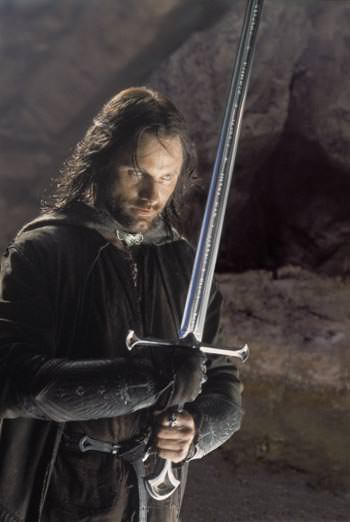
Improved: Your character’s signature weapon gains either the Reinforced quality.
Supreme: Your character’s signature weapon gains 2 hard points and an attachment of your choice of rarity 9 or less at no cost (subject to the limits of its new total hard points).
Unbowed
Your character can fight on despite having the most horrendous injuries. It might be sheer willpower that lets them accomplish this feat, or perhaps they are something more than mortal. In any case, even the most grievous wounds do not slow them down in the heat of battle.
Base: When you activate this Heroic Ability, choose one Critical Injury your character is suffering (except for "dead"). As long as this ability is active, do not suffer any effects of that Critical Injury, including adding +10 to further rolls on the Critical Injury Result table. You can also activate this Heroic Ability as an out-of-turn incidental when your character suffers a Critical Injury.
Improved: While this ability is active, your character does not suffer the effects of any Critical Injuries they are suffering (except for the “dead” Critical Injury).
Supreme: While this ability is active, your character also ignores the effects of the “dead” result. They still die when the ability ends, unless the Critical Injury is somehow removed first.
Unleash
When pushed to the breaking point—or maybe just when they want to show off—your character unleashes their full abilities, laying low any who oppose them. This might be achieved in a flurry of blows as your character lays about with weapon strikes, or in a sudden surge of enchanted light that blasts away whatever monsters and foes stand too close.
Base: While this ability is active, your character may perform a maneuver once per round on their turn to immediately defeat one minion group within short range.
Improved: While this ability is active, your character may instead perform an incidental once per round on their turn to immediately defeat one minion group within short range. (This replaces the base effect.)
Supreme: When you activate this ability, your character immediately defeats all minions within short range.
Heroic Ability Upgrades
As your character grows in experience, they gain ability points to spend on upgrades for their Heroic Ability. Obviously, upgrades improve the ability, but more importantly, they help to differentiate it. Even if two player characters have the same primary ability effect for their Heroic Abilities, different choices of upgrades can result in very different abilities.
Your character receives ability points based on the XP they gain through play. Every time your character’s XP total increases by 50, they gain one ability point to spend. Your character does not gain ability points based on their starting XP determined by their species, but if you are creating a character in Epic Play, your character does gain an ability point for each additional 50 XP (for a total of 3 ability points).
When your character gains ability points, you decide how to spend them. Each upgrade includes a cost, and spending the required ability points on an upgrade permanently adds the benefit of that upgrade to your Heroic Ability. Some upgrades have a cumulative effect if you purchase that upgrade multiple times.
Duration
Cost: 1 Ability Point
Your character’s Heroic Ability effect lasts for one additional turn for each purchase of Duration.
Frequency
Cost: 2 Ability Points
Your character can activate their Heroic Ability one additional time per session for each purchase of Frequency.
Power
Cost: Special
The first time you purchase this upgrade, it costs one ability point and your character's primary ability gains the improved effect. You may purchase this upgrade a second time at a cost of another two ability points to gain the supreme effect.
Secondary Effect
Cost: 1 Ability Point
Add a secondary effect to your character’s Heroic Ability. When you purchase this upgrade, select one of the following secondary effects. You may purchase this upgrade a second time to choose a different effect, for a total of two secondary effects. As with the primary ability effect, you should work with the GM to come up with an exciting narrative explanation for each secondary effect.
Even if the primary effect is instantaneous, the duration of the Heroic Ability matters for many secondary effects. Remember, a Heroic Ability lasts until the end of your character’s next turn, or longer if you take the Duration upgrade.
Devastating
While the ability is active, your character adds +2 damage to one hit of each of their attacks.
Diminish
While the ability is active, enemies within short range add b to their skill checks.
Drain
When your character activates their Heroic Ability and at the beginning of each of their turns it remains active, enemies within short range suffer 2 strain.
Empowered
While the ability is active, your character adds b to their skill checks.
Empower Allies
While the ability is active, allies within short range add b to their skill checks.
Rejuvenation
When your character activates the ability and at the beginning of each turn they take while it remains active, your character heals 2 strain.
Rejuvenate Allies
When your character activates the ability and at the beginning of each turn they take while it remains active, all allies within short range heal 2 strain.
Renewal
When your character activates the ability, you may choose to generate a new PC Initiative slot. You may choose to use Cool or Vigilance for this roll. The new result remains for the duration of the encounter. The new Initiative slot is immediately available for use, but it does not allow any PC to take an extra turn during a round.
Story
Cost: 1 Ability Point
Your character only needs to spend one Story Point to activate the ability. You can only purchase this upgrade once.
Heroic Ability Origins
Your character’s Heroic Ability is an important part of who they are, so you’ll want to decide how they came by such an impressive ability. It’s likely that during this process you’ve already thought about the explanation for your character’s ability and how they first obtained it, in which case you should discuss your ideas with the GM and make sure you both agree on what it means for the campaign.
If you don’t have an idea yet, or just want to leave it to fate, you can roll on Table 1–2: Heroic Ability Origins to find out how your character obtained their ability.
Table 1-2: heroic Ability Origins
| D10 Roll | Origin |
|---|---|
| 1 | In Your Blood: Heroism runs in the character’s family. Perhaps their ancestor was a mighty hero or other figure in the past ages of Middle Earth, or the blood of the Ainur runs in their veins. |
| 2 | Chosen One: The character has been chosen for a great destiny. They might be blissfully unaware of this, but sooner or later, others will take an interest. There is likely a prophecy involved. |
| 3 | Artifact of Power: The character’s Heroic Ability doesn’t come naturally, but from an enchanted object in the character’s possession, such as an ancient blade or Lesser Ring of Power. Whether the object was a chance find, a gift, or an inheritance, the character’s life changed forever when they obtained this item. |
| 4 | Favored by Unseen Forces: The character is watched over and protected by powerful supernatural forces. These might be oath-bound spirits, Sauron, or even the Valar themselves. |
| 5 | Driven: The character’s Heroic Ability is a manifestation of their powerful drive to excel and succeed. This drive could stem from a sense of duty, a sacred oath, or even an obsession with vengeance. |
| 6 | Life-Changing Experience: The character’s ability is the result of a singular experience that changed their life. Perhaps a great hero saved them from monsters, or the character stumbled upon something they shouldn't have. |
| 7 | Blessed/Cursed: The character’s ability is the result of a blessing or a curse. Perhaps the character hopes to find a way to lift the curse, or must abide by a code of behavior in order to retain the benefits of their blessing. |
| 8 | Peerless Training: The character’s Heroic Ability is the result of long hours of intensive and unique training. The character’s teacher might have been a legendary master in their field, a mysterious stranger, or even a powerful Maia. |
| 9 | Lost Knowledge: The character’s Heroic Ability developed as a result of exposure to a lost culture or people that have since been wiped from the earth. The character might be the last survivor of this people or have been exposed to their ways through ancient ruins or texts. |
| 0 | Roll again, ignoring duplicates of this result, and apply both origins. |
Creating Heroic Abilities
The following are two examples to illustrate the process of creating Heroic Abilities for PCs, including crafting origins that tie into character creation.
Example: Unleashed
Rosie is ready to choose a Heroic Ability for her character, an silvan elf Soldier named Ilthariel. Ithariel has served as a part of the Mirkwood Guard for many centuries, but cannot rise far in influence due to her silvan heritage. Rosie hasn't quite decided yet how Ithariel became such a skilled swordswoman, but she decides on the Unleashed primary effect to represent her ability to swiftly best most foes in battle.
She rolls a 5 for the ability's origin, obtaining a result of Driven. Based on this, Rosie decies that Ithariel has worked diligently all her long life to gain the respect of her compatriots in the Guard and desires to gain a high place despite not being of Sindarin descent.
Rosie decides to call her Heroic Ability "Martial Ambition."
Example: Connected
Sam is creating his character, a Dunedain of the North named Athelon, for a new campaign. His character concept is that of a grizzled explorer who has seen everything and been everywhere, so he chose the Ranger career. Brandon is now on step 4 of character creation and has already spent his starting XP, so he is ready to choose his heroic ability.
He decides the Connected primary effect is a good fit for the character - Athelon knows lots of people from his travels, so at least a few people are bound to owe him a few favors. He rolls on the Heroic Ability Origins table and gets a 1, and the In Your Blood origin. This fits with the concept, so Sam decides the Heroic Ability represents the ties Athelon's family has had through their many generations of wandering the world.
He's not sure what to call the ability, so he thinks about upgrades he might purchase in the future. He likes the idea of Empower Allies secondary effect, which could represent Athelon's ability to inspire his allies with his presence, and calls his ability "Old Allies."
Weapons
Axe & Battleaxe
While regular axes are generally meant for chopping wood, battleaxes are vicious weapons that can leave painful, incapacitating wounds. Therefore, we gave them the Vicious 1 quality so that any Critical Injuries your character inflicts will be worse than expected.
Barrow and Morgul Blades
These weapons are unique among all weapons crafted by men, elves, or dwarves. Morgul blades are designed by the cunning craft of the Enemy, designed to corrupt even the incorruptable. They can pierce through nearly any armor, and if they land a Critical Injury (an easy task with a Crit rating of 1), they automatically give the special Critical Injury: Fading Into Shadow. Someone falling into shadow will have their Wound and Strain Threshold reduced by 1 each round (or every five minutes). If one of their thresholds is reduced to 0, they become a Wraith, subject to the will of the one who wielded the blade. After being used, the blade disintegrates.
Any use of such a blade gives the user 10 points of Shadow, with an additional 10 if they succeed in turning their opponent into a Wraith. A Medicine check aided by Athelas can hold off the effects for one day per check, but the only way to fully heal the wound is with the Heal spell.
Barrow blades were designed by the Men of Westernesse as weapons against the servants of the Dark Lord, wraiths in particular. A wraith struck with a barrow blade and given a Critical Injury is temporarily bound to the Mortal World, and is just as subject to physical attacks as any mortal, as well as having their Wound and Strain thresholds halved. Like a morgul blade, once a barrow blade is used in this way, the blade disintegrates.
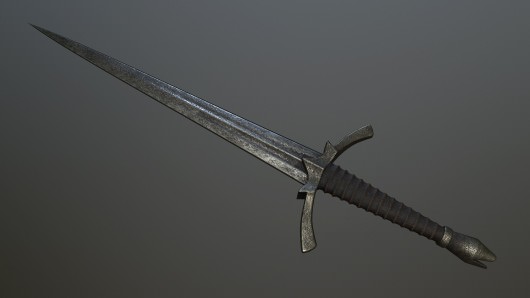
Dagger & Parrying Dirk
Daggers are very small weapons, designed more for stealth than open combat. Parrying dirks are much like daggers, but their crossguards are designed to catch other blades, making them useful for deflecting attacks. Daggers and parrying dirks add b to checks to find or notice them.
Greatsword, Greataxe, Greathammer, & Elven Greatsword
Almost any hand weapon can be found as a great weapon, although swords and axes are the most common, and dwarves are fond of greathammers. As you see from their stat lines, great weapons are devastating, but require impressive physical strength to swing (the greataxe and greathammer) or coordination to keep their blade in the right place (the greatsword). The greataxe and greatsword also have some of the characteristics of their smaller cousins (Defensive and Vicious, respectively), while the greathammer is particularly brutal. Elven greatswords are special because they are the only Melee (Heavy) weapons capable of being used with the Finesse talent, as elves have always been more agile than brawny, and designed their weapons accordingly.
Halberd
A halberd is a basic infantry weapon, basically an axe blade mounted on a long pole. It requires two hands to wield and is pretty heavy, but it’s cheap, it keeps an opponent at arm’s length, and the cutting head can shear through armor.
Light Spear & War Spear
Although a simple weapon, a spear is easy to wield and allows the user to keep some distance from an opponent. Hence, spears don’t have very high damage, but the Accurate 1 quality represents their ease of use. In addition, the Defensive 1 quality represents their usefulness at keeping someone at arms’ reach. Warspears are much like their lighter cousins, but are more effective and take two hands to wield.
Mace & Warhammer
Maces are simple weapons, so they didn’t get any item qualities. Instead, they are cheaper than other weapons. Warhammers work similar to maces, but are designed to break through armor and crush enemy's bones, giving them Pierce and Sunder.
Table 2-1: Weapons
| Name | Skill | Dam | Crit | Range | Encum | Price | Rarity | Special |
|---|---|---|---|---|---|---|---|---|
| Melee Weapons | ||||||||
| Axe | Melee (Light) | +2 | 4 | Engaged | 2 | 25 | 1 | |
| Barrow Blade | Melee (Light) | +1 | 1 | Engaged | 1 | 1000 | 9 | Breach, Westernesse |
| Battleaxe | Melee (Light) | +3 | 3 | Engaged | 2 | 150 | 2 | Vicious 1 |
| Dagger | Meele (Light) | +1 | 3 | Engaged | 1 | 20 | 1 | |
| Elven Greatsword | Melee (Heavy) | +5 | 1 | Engaged | 2 | 1200 | 7 | Defensive 1, Finesse, Pierce 1, Superior, Unwieldy 4 |
| Greataxe | Melee (Heavy) | +4 | 3 | Engaged | 4 | 300 | 4 | Cumbersome 3, Pierce 2, Vicious 1 |
| Greathammer | Melee (Heavy) | +5 | 4 | Engaged | 4 | 700 | 6 | Cumbersome 4, Disorient 3, Pierce 2, Inaccurate 1, Sunder |
| Greatsword | Melee (Heavy) | +4 | 2 | Engaged | 3 | 300 | 4 | Defensive 1, Pierce 1, Unwieldy 3 |
| Halberd | Melee (Heavy) | +3 | 3 | Engaged | 5 | 250 | 3 | Defensive 1, Pierce 3 |
| Light Spear | Melee (Light) | +2 | 4 | Engaged | 2 | 90 | 1 | Accurate 1, Defensive 1 |
| Mace | Melee (Light) | +3 | 4 | Engaged | 2 | 75 | 1 | |
| Morgul Blade | Melee (Light) | +1 | 1 | Engaged | 1 | 2000 | 10 | Breach, Morgul |
| Parrying Dirk | Melee (Light) | +1 | 4 | Engaged | 1 | 75 | 3 | Defensive 1 |
| Pike | Melee (Light) | +2 | 3 | Short | 2 | 90 | 1 | Defensive 1, Pierce 2 |
| Scimitar | Melee (Light) | +3 | 2 | Engaged | 1 | 250 | 5 | Vicious 1 |
| Shield | Melee (Light) | +0 | 6 | Engaged | 2 | 80 | 1 | Defensive 1, Deflection 1, Inaccurate 1 |
| Shortsword | Melee (Light) | +2 | 3 | Engaged | 1 | 150 | 2 | Accurate 1 |
| Sword | Melee (Light) | +3 | 2 | Engaged | 1 | 200 | 2 | Defensive 1 |
| Tower Shield | Melee (Light) | +0 | 6 | Engaged | 3 | 120 | 4 | Cumbersome 3, Defensive 2, Deflection 2, Inaccurate 2 |
| Warhammer | Melee (Light) | +3 | 3 | Engaged | 2 | 300 | 2 | Pierce 1, Sunder |
| War Spear | Melee (Heavy) | +3 | 2 | Engaged | 3 | 300 | 3 | Defensive 2, Pierce 2 |
| Staff | Melee (Heavy) | +2 | 5 | Engaged | 2 | 80 | 1 | Defensive 1 |
| Ranged Weapons | ||||||||
| Axe (Thrown) | Ranged | +2 | 4 | Short | 2 | 25 | 1 | Limited Ammo 1 |
| Dagger (Thrown) | Ranged | +1 | 4 | Short | 1 | 20 | 1 | Limited Ammo 1 |
| Bow | Ranged | 7 | 3 | Medium | 4 | 275 | 4 | Unwieldy 2 |
| Crossbow | Ranged | 7 | 2 | Medium | 4 | 600 | 4 | Pierce 2, Prepare 1 |
| Longbow | Ranged | 8 | 3 | Long | 4 | 450 | 6 | Unwieldy 3 |
| Shortbow | Ranged | 6 | 3 | Short | 4 | 450 | 6 | Inaccurate 1 |
| Spear (Thrown) | Ranged | +3 | 4 | Short | 2 | 90 | 1 | Limited Ammo 1 |
Pike
At first glance, pikes are much like spears. However, the 10-20 ft long weapon is unique among melee weapons in that it is terrible in close quarters combat. Pikes are designed to be used in groups to keep the enemy as far away as possible. An opponent trying to move into engaged range with a minion group wielding pikes automatically is subject to a combat check from that minion group, and aaa or t can be spent to keep them at short range. This makes pikes especially good against cavalry and large enemies. However, once an opponent moves into engaged range, the difficulty of attacking with the pike is increased twice, becoming Daunting (dddd). At that point it is best to drop the pike and pull out another weapon.
Sword, Shortsword, & Scimitar
Designed to let the wielder block and parry blows, swords can be defensive, as well as offensive. To reflect this, swords get Defensive 1. Their sharp blades also make it easier to inflict Critical Injuries, giving them a better Critical rating. Shortswords are smaller and thus likely to do less damage and are less defensive than larger swords, but their smaller size makes them better for stabbing, giving them the Accurate quality. Scimitars are much like swords, except that their curved blades are better for leaving vicious wounds than defense, giving them Vivious 1.
Shield & Tower Shield
Whether crafted from wood, steel, or hide, shields are common among warriors of all cultures and skill levels for a simple reason: they keep you alive. The utility of a shield for blocking and parrying blows cannot be overstated, and thus shields are a staple of most ancient cultures. We represented these elements of a shield by giving it the Defensive 1 and Deflection 1 qualities. It also has the Knockdown quality, since nothing beats a shield for bowling someone off their feet. However, a shield can’t be used to hit someone as easily as a sword or axe, hence the Inaccurate 1 quality.
Tower shields are basically larger shields that cover more of the user's body, thus providing a greater among of defense. Unfortunately, their greater size also makes them much heavier and more difficult to wield.
Staff
Staffs are the simplest weapons you can find, little more than long, thick sticks. They are most often used by travelers and old men. However, if you come across a traveling old man with a staff, you might want to be weary...
Throwing Weapons
Throwing weapons are much like their melee counterparts, except that they are designed to be thrown. As you likely do not have an unlimited suppy, they need to be retrieved before they can be used again.
Bow, Longbow, and Shortbow
The primitive appearance of the bow and longbow belies their effectiveness. In the hands of a skilled archer, a bow can volley arrows into targets quickly and at range. Nocking an arrow and drawing a bow takes virtually no time for a trained user, so we don’t think bows need Prepare or any other qualities to reflect that. However, bows do require a certain innate skill and coordination to use, hence the Unwieldy quality. Shortbows are easier to use than their larger relatives, but because of this are also less accurate.
Crossbow
Crossbows can never match the effectiveness of a wellcrafted bow in the hands of a talented archer, but they are simple to use and powerful. The strength of a crossbow’s mechanism is represented by the Pierce quality. The downside of a crossbow is the additional time it takes to ready it for firing versus simply nocking an arrow, hence the Prepare quality.
Dwarven Weapons
Dwarven weapons increase their damage, hard points, and encumbrance value by 1
Price: x3
Rarity: +2
Elven Weapons
Elven weapons increase their damage by 1, reduce their encumbrance value, hard points, and Critical rating by 1 (to a minimum of 1), gain the Superior quality and either gain Unwieldy 2 or increase their Unwieldy quality by 1. They also glow when orcs, goblins, or uruks are nearby.
Price: x4
Rarity: +3
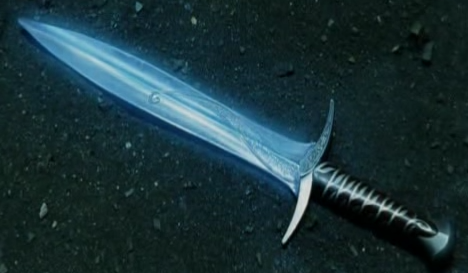
Armor
Table 2-2: Armor
| Type | Defense | Soak | Encumbrance | Price | Rarity |
|---|---|---|---|---|---|
| Chainmail | 0 | +2 | 3 | 550 | 4 |
| Dwarven Mail | 0 | +3 | 3 | 1000 | 6 |
| Dwarven Plate | 1 | +4 | 4 | 2550 | 7 |
| Elven Mail | 2 | +2 | 2 | 1500 | 7 |
| Elven Plate | 3 | +3 | 3 | 3075 | 8 |
| Heavy Robes | 1 | +0 | 1 | 45 | 0 |
| Leather | 0 | +1 | 2 | 50 | 3 |
| Mithril Mail | 4 | +4 | 1 | - | 10 |
| Plate Armor | 1 | +2 | 4 | 1,250 | 6 |
Chainmail
Chainmail is good at absorbing a hit and dispersing the force over a broader area. We’ve represented such armor with a solid soak value, but no defense. Mail armor is somewhat noisy, so your character adds b to Stealth checks they make while wearing it.
Dwarven Mail & Plate
Dwarven smiths excel at making armor that is stronger than any other, and thus armor forged by dwarves has a higher soak than the type made by Men, but no more defense.
Elven Mail & Plate
While elven smiths can make stronger armor, their focus is more on stopping attacks entirely than on just absorbing damage, and thus elven armor has a higher defense than human or dwarven armor. Elven armor is also light and silent, reducing encumbrance by 1 and removing penalties to Stealth checks.
Heavy Robes
Swirling robes in the midst of combat can entangle an attacker’s weapon and make it hard for an attacker to pinpoint your vital areas. To represent this, robes don’t provide any soak but do add defense.
Leather
Leather armor, whether soft or boiled and hardened, might absorb some of the impact from a blow, but it won’t turn a blade entirely. That’s why we’ve given it a low soak value, but no defense.
Mithril Mail
Mithril is the strongest and rarest metal in Middle-Earth, "light as a feather and as strong as dragon-scales," only found within the darkest depths of the Mines of Moria. Items made of mithril would all have the Reinforced quality, as it is virtually unbreakable. Items made of mithril would be impossibly rare, but however unlikely it is still possible to find such things, so we put this shirt, much like the one worn by Bilbo and Frodo, for an example. It adds both high soak and high defense, as mithril has been known to both incredibly reduce damage and stop it completely. Mithril is best used as a reward at the end of an adventure or campaign instead of something one can purchase.
Plate Armor
Plate armor absorbs a considerable amount of damage, and the angled plates can turn aside blows entirely. Hence, the armor both has a high soak value and provides some defense. Plate armor is heavy and very noisy. Your character adds bb to Stealth checks they make while wearing it.
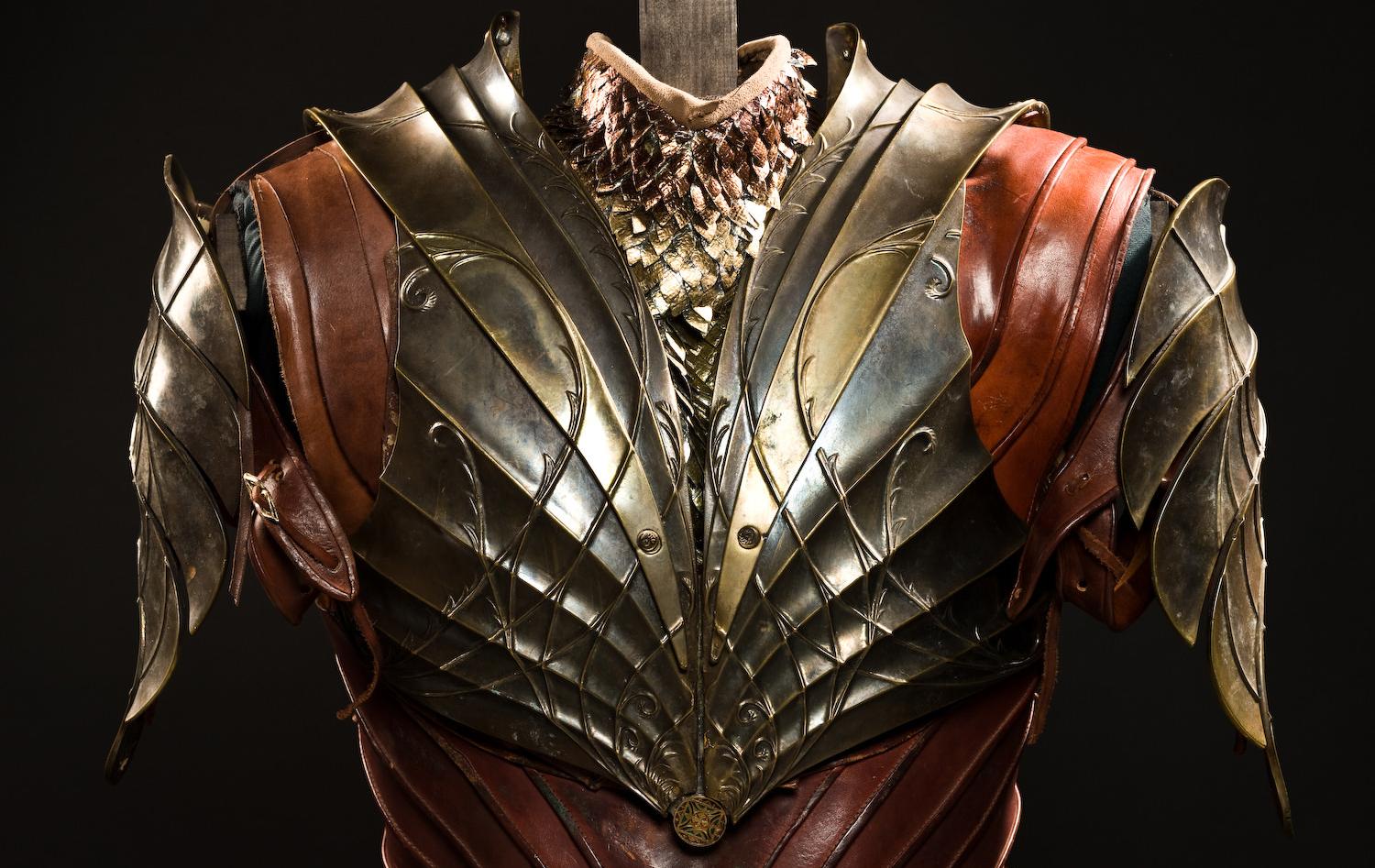
Gear and Services
Gear
Athelas
Athelas is a plant used often for healing by the elves and the Rangers of the North, and is believed by some to have magical qualities. When making a Medicine check, your character may use athelas to add automatic sa to the results. The athelas is consumed when used.
Athelas Essence
Athelas Essence is concentrated athelas and works as a painkiller (see Core Rulebook, pg 94).
Backpack
Few things are more essential to the traveler and adventurer than a humble backpack. Without its copious storage space, one could not carry the supplies needed for a lengthy journey - or escape from a spider-infested forest with a haul of loot. While wearing a backpack, your character increases their encumbrance threshold by four.
Bedroll
Whether camping beneath the boughs of the Mallorn trees of Lorien or lying amid the rubble of an ancient ruin, a good bedroll can be just what one needs to get a restful night's sleep.
Burglars' Tools
This is a collection of lockpicks, files, wires, and oil contained in a small leather pouch, used for quietly opening locks.
Burglars’ tools allow your character to attempt to open any mechanical locks or latches, even complicated ones. In addition, when making a Skulduggery check to open a lock or latch, your character adds automatic a to the results.
Climbing Gear
Ropes, pitons, and a small hammer make climbing up a sheer cliff or wall merely difficult, rather than nearly impossible (and potentially fatal). When your character uses climbing gear they remove b from any Athletics checks they make to climb something.
Table 2-3: Gear
| Item | Encum | Price | Rarity |
|---|---|---|---|
| Athelas | 0 | 50 | 5 |
| Athelas Essence | 0 | 100 | 6 |
| Backpack | +4 | 50 | 3 |
| Bedroll | 1 | 15 | 1 |
| Burglar's Tools | 1 | 75 | 5 |
| Climbing Gear | 1 | 20 | 2 |
| Cooking Supplies | 2 | 25 | 2 |
| Craftsman's Tools | 1 | 50 | 3 |
| Elven Draught | 0 | 50 | 4 |
| Fine Cloak | 1 | 90 | 4 |
| Flask (Empty) | 0 | 1 | 1 |
| Flint and Steel | 0 | 10 | 2 |
| Healer's Kit | 2 | 150 | 4 |
| Lantern | 1 | 50 | 1 |
| Musical Instrument | 1 | 100 | 3 |
| Rations (10 days) | 1 | 10 | 0 |
| Rope | 1 | 5 | 1 |
| Tent | 3 | 50 | 2 |
| Torches (3) | 1 | 1 | 0 |
| Wagon | - | 200 | 2 |
| Waterskin (Empty) | 1 | 5 | 1 |
| Winter Clothing | 4 | 100 | 3 |
Cooking Supplies
A small travel pot, pan, ladle, and other equipment allow characters to cook food to help them survive in the wilderness. When rations run out, these tools can mean the difference between life and death. Allows PCs to cook food they gather from Survival checks.
Craftsman's Tools
An assortment of tools including a hammer, tongs, and other items required for the work of a craftsman. Craftsman's tools allow your character to perform Crafting checks to make and modify weapons without penalty.
Elven Draught
A drink favored by the elves, especially during long journeys, a drink of elven draught, also known as Miruvor, fills those who drink it with renewed strength and energy. After drinking an elven draught your character immediately recovers 5 strain. Each subsequent elixir used in the same day heals 1 less strain., so that the sixth elixir (and further) has no effect.
Fine Cloak
A fine silk or embroidered wool cloak not only protects the wearer from the elements, it also elevates their stature in the eyes of others. When wearing a fine cloak, your character removes b from any Charm, Deception, or Leadership checks they make. When worn, a fine cloak’s encumbrance is 0.
Flask
A clay or pewter flask can be just the thing for carrying water on a long journey. Of course, a dwarf would probably consider carrying water a waste of a good flask. Most flasks can carry roughly ten ounces of liquid.
Flint and Steel
As long as an adventurer has time, patience, and a supply of fine, dry kindling, they can use a flint and steel to strike sparks and start a fire.
Healer's Kit
Healers often travel with specialized kits. These kits commonly contain bandages, salves, poultices, and other items necessary to heal the injured and sick. A healer's kit allows your character to perform Medicine checks to heal wounds and Critical Injuries without penalty.
Lantern
An iron lantern is easier to handle than a torch and can be hung from a belt or shield. Protected inside a cage of metal and sturdy glass, its flame is relatively safe even if the lantern is knocked about. This can prove vital in the darkest caverns in the deep places of the world. A lit lantern provides light and removes b added to checks due to darkness. (If it becomes important to determine how far the light reaches, a lantern can provide light out to short range.)
Musical Instrument
For most a musical instrument is simply a tool for pleasing melodies or a medium to tell interesting stories. For some however, including many among the elves, music has a power all its own. This can represent many musical instruments, such as a lute or a lyre.
Rations
Middle Earth is a big place, and those who travel without food soon find themselves either returning home or at the whims of the wilds. While hardly delicious, ration foods such as cram can mean the difference between life and death for a traveler. Any adventurers in the wilds should keep a good supply of rations with them at all times.
Rope
No self-respecting soldier, sailor, miner, merchant, or traveler would ever be caught without a length of sturdy rope close at hand, and that goes doubly for an adventurer. Rope can be used as the right tool for the job in the right circumstances and stretches out to roughly medium range.
Tent
Traveling through the wilds of the world is not easy work. While sleeping under the stars isn't the worst fate in the world, having something over your head, even just a piece of cloth or animal hide, can mean a lot, especially in nights of cold or rain. Tents add a to Survival or Resilience checks made as part of a Trek.
Torches (3)
Torches are wooden sticks with oil-soaked cloths wrapped around one end. When lit, they burn for a long time and help illuminate your surroundings. A lit torch provides light and removes b added to checks due to darkness. (If it becomes important to determine how far the light reaches, a torch can provide light out to short range.)
Wagon
Wagons can be expensive enough that several farmers may share one. A farmer's wagon is usually constructed from heavy, rough-hewn timbers - a marked contrast to the varnished wood of a merchant's wagon or the brightly painted covered wagon of a wandering minstrel. A wagon can hold characters and gear totaling up to 50 encumbrance. A wagon features two or more wheels and can move at moderate speed if a beast of burden pulls it.
Waterskin
Typically made from sheep or cow bladders, water-skins provide a simple and effective way to transport liquids from well water to traveling wines. A waterskin can carry enough liquid to quence the thirst of two people per day. When full, its encumbrance increases to 2.
Winter Clothing
Made of thick wool and furs, winter clothing keeps adventurers warm in the coldest environments. When wearing winter clothing, your character removes bb from any Survival or Resilience checks they make due to cold weather. When worn, winter clothing’s encumbrance is 1.
Meals
For many adventurers, the thought of a proper meal not involving trail rations may be all that keeps them going during a long trek.
Porters and Torchbearers
Able-bodied helpers can be essential in many questing adventures, especially in carrying extra supplies across rough terrain or aiding in establishing camps in the wilderness. Sometimes just a few extra people to offer additional light for nighttime travel can ensure a group doesn't become yet another "but they never returned" travel tale.
Travel Arrangements
Adventurers traveling in groups often rely on hired wagons, especially when they are extracting weighty treasures from some forgotten ruin. Boats can also be arranged for passage throughout the riverways of Middle Earth.
Table 2-5: Services
| Type | Encum | Price | Rarity |
|---|---|---|---|
| Ale (Flagon) | - | 1 | 0 |
| Lodging (Common Room, 1 night) | - | 1 | 0 |
| Lodging (Private Room, 1 night) | - | 5 | 1 |
| Meal (Tavern) | - | 2 | 0 |
| Porter (Per day) | - | 1 | 1 |
| Torchbearer (Per day) | - | 1 | 1 |
| Travel, Riverboat (1 day) | - | 5 | 2 |
| Travel, Wagon (1 day) | - | 2 | 1 |
| Wine (Bottle) | - | 2 | 1 |
Wine
The Elves of the Woodland Realm have a special love for the wine of the Men of the Lake, though many lands have their own vintages.
Magical Items
Table 2-6: Magical Items
| Type | Encum | Price | Rarity |
|---|---|---|---|
| Elven Cloak | 1 | 800 | 6 |
| Elven Rope | 1 | 100 | 4 |
| Elven Vial | 1 | 2500 | 9 |
| Hammer of Eregion | 1 | 3000 | 9 |
| Horn of the West | 1 | 2000 | 9 |
| Lesser Ring of Power | 0 | - | 10 |
| Lightning Rune | 1 | 1000 | 8 |
| Rune of Courage | 1 | 800 | 7 |
| Rune of Fate | 1 | 1200 | 8 |
| Rune of Flame | 1 | 1000 | 8 |
| Rune of Healing | 1 | 800 | 7 |
| Rune of Warding | 1 | 800 | 7 |
| Sunburst Rune | 1 | 1000 | 8 |
Elven Cloak
Elven cloaks are fashioned by the elves to aid them in blending in to their environment. Their magic upgrades the ability of all Stealth checks made while wearing the cloak twice. When worn, elven cloak's encumbrance is 0.
Elven Rope
Woven from Hithlain by the elves with a special art only they know, these ropes are long and thin and glow faintly in the darkness. Evil things burn when they touch the rope. It is impossibly strong and the knots it ties never undo unless desired to do so by the one who tied them.
Elven Vial
The elves have mastered the art of catching light inside of gems. These small fist-sized "vials", as they are often called, glow faintly regularly, but when an individual's will is directed through them they shine brightly, illuminating the darkness out to medium range, removing bbb from darkness and upgrading Perception checks to notice illusions, hidden objects or doors, and similar details twice. Upon seeing this light, evil things must make a Daunting (dddd) Fear check.
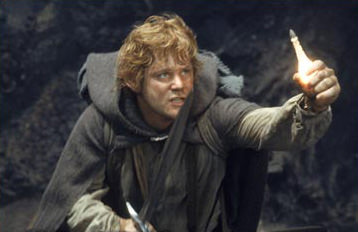
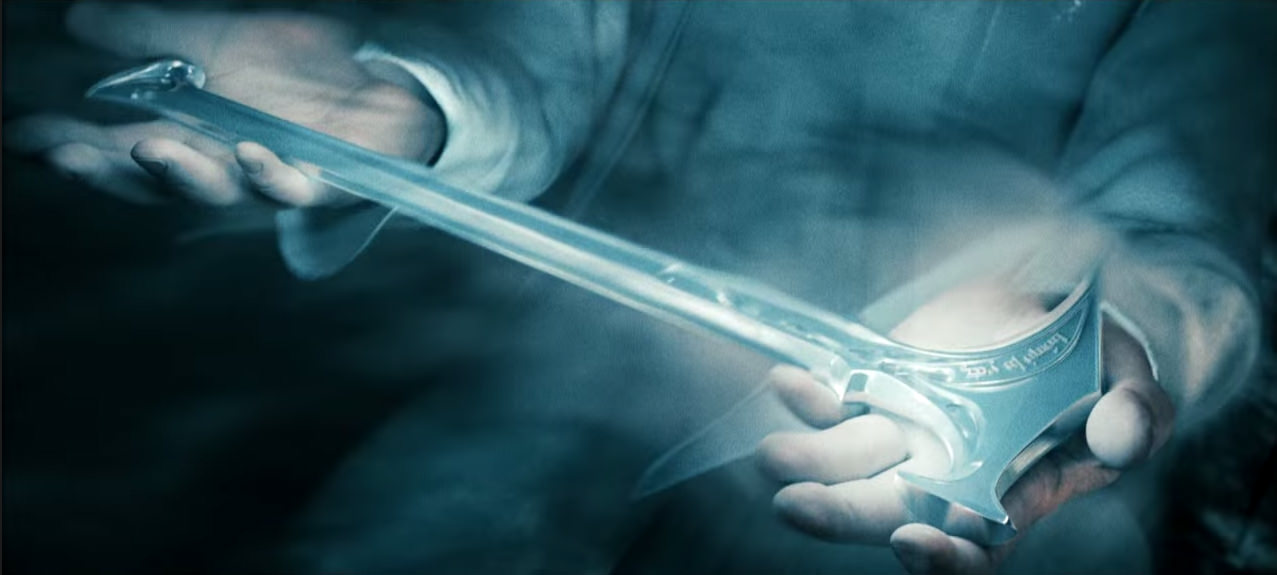
Hammer of Eregion
These enchanted hammers were used by the Smiths of Eregion in their efforts to create the Rings of Power. Few remain, but the powerful enchantment upon them is still strong, adding t to any Crafting check made with the hammer.
Horn of the West
These special horns were crafted by the Men of Numenor in days of old to bring courage to men in their times of need and drive off the forces of darkness. Not many remain in these days and are often treasured heirlooms of families of the Men of Gondor.
As an out-of-turn incidental, your character may blow the Horn of the West; all evil things within medium range must make a Hard (ddd) Fear check and until the end of the following round, your character and their allies within medium range reduce the difficulty of fear checks by one, to a minimum of Simple (-). Obviously the horn is very loud; under most circumstances, it can be easily heard by all characters and creatures out to extreme range, and likely farther.
Lesser Ring of Power
20 Great Rings were made; three for the elves, seven for the dwarves, nine for men, and one ring was forged by the Dark Lord to rule them all. However, before the forging of the Great Rings, many Lesser Rings were made as "essays" in the craft of ringmaking. While nowhere near the power of the Great Rings, these Lesser Rings still possess great power.
It is unknown how many Lesser Rings were forged, and how many of them Sauron claimed when he waged war against the Elves of Eregion. What is known is that all the rings possess the ability to enhance the wielder's natural abilities in some way, and many likely had other abilities, such as making someone invisible or allowing them to have limited control of some aspect of the elements. When Bilbo first found the One Ring, Gandalf believed it to be one of the Lesser Rings, as they, like the One, have no jewel, unlike most of the Great Rings.
Lesser Rings of Power have no price listed because no one in possession of such an item is likely to ever let it go. Lesser Rings of Power are more likely to be found or won, potentially as a reward at the end of an adventure or campaign.
Runestones
Runes are a magic that, while invented by the elves, the dwarves have become the masters of. Runestones are one example of their rune magic. Runestones each have a rune carved into them, and when a word is spoken, the rune unleashes the power inside. After the effect is over the rune dies and the stone shatters, making them a powerful but one-use item. The exact nature of the runestone's effect depends on the rune, but runestones can have runes of warding, runes of healing, or runes of fire.
Lightning Rune
When Activated: Until the end of your character's turn, the lightning rune counts as a Ranged weapon with the following profile: (Discipline; Damage 8; Critical 3; Range [Long]; Auto-fire, Disorient 3).
Rune of Courage
When Activated: Until the end of your character's turn, your character ignores the effects of fear, as per page 243 of the Genesys Core Rulebook.
Rune of Fate
When Activated: Move one Story Point from the player pool to the GM pool; add d to the next check that targets your character.
Rune of Flame
When Activated: Until the end of your character's turn, the rune of flame counts as a Ranged weapon with the following profile: (Discipline; Damage 8; Critical 3; Range [Short]; Burn 2).
Rune of Healing
When Activated: Your character immediately recovers all wounds and strain.
Rune of Warding
When Activated: Until the end of your character's turn, gain +2 defense (unlike usual, this can exceed the 4 defense limit).
Sunburst Rune
When Activated: Until the end of your character's turn, the rune of flame counts as a Ranged weapon with the following profile: (Discipline; Damage 4; Critical 1; Range [Medium]; Breach 1).
Item Attachments and Enchantments
Weapon Attachments
Explosive Missile
Whether through runic power or elven enchantments, a weapon with this attachment launches projectiles that explode on impact.
Use With: This attachment can be applied to any non-thrown Ranged weapon.
Modifiers: The weapon gains the Blast 5 item quality.
Hard Points Required: 1
Runic Flame
The runic flame is designed to be used in conjunction with a close combat weapon. Swords with aperatures in the pommel or the guard for such runic attachments can be found in the armories of great dwarven families.
Use With: This attachment can be applied to any melee weapon.
Modifiers: The weapon gains the Burn 1 quality
Hard Points Required: 1
Runic Frost
This runic inscription coats the weapon with an icy chill that saps strength from those it strikes.
Use With: This attachment can be applied to any melee weapon.
Modifiers: The weapon gains the Ensnare 1 and Stun 4 qualities.
Hard Points Required: 1
Runic Thunder
When its weapon strikes a foe, this rune carving flashes white like a bolt of lightning. The deafening boom of thunder comes a half-second later, staggering the foe with concussive force.
Use With: This attachment can be applied to any weapon.
Modifiers: The weapon gains the Concussive 1 quality.
Hard Points Required: 2
Table 2-7: Weapon Attachments
| Attachment | HP Required | Price | Rarity | Source |
|---|---|---|---|---|
| Balanced Hilt | 1 | 1,000 | 6 | Genesys Core Rulebook (page 207) |
| Duelist Cross Guard | 1 | 800 | 5 | Genesys Core Rulebook (page 207) |
| Explosive Missle | 1 | 1,250 | 7 | Adventures in Middle Earth |
| Razor Edge | 1 | 1,250 | 6 | Genesys Core Rulebook (page 208) |
| Recurve Limbs | 1 | 300 | 4 | Genesys Core Rulebook (page 208) |
| Runic Flame | 1 | 2,000 | 8 | Adventures in Middle Earth |
| Runic Frost | 1 | 1,750 | 8 | Adventures in Middle Earth |
| Runic Thunder | 2 | 2,000 | 8 | Adventures in Middle Earth |
| Serrated Edge | 1 | 75 | 2 | Genesys Core Rulebook (page 208) |
| Superior Weapon Customization | 1 | 750 | 7 | Genesys Core Rulebook (page 208) |
| Weighted Head | 1 | 250 | 2 | Genesys Core Rulebook (page 209) |
Armor Attachments
Gilded
Though it serves no practical purpose, many nobles like to adorn their armor with gold leaf. It certainly makes the wearer seem impressive, but acts as a lure for every bandit within eyesight.
Use With: This attachment can be applied to any armor.
Modifiers: While wearing this armor, your character adds b to Charm, Negotiation, and Leadership checks.
Hard Points Required: 0
Ironbound Rune
Use With: This attachment can be applied to any metal armor.
Modifiers: The armor increases its defense and soak by 1.
Hard Points Required: 2
Spikes
Use With: This attachment can be applied to plate armor of any variety.
Modifiers: If your character is targeted by a melee combat check while wearing this armor, you may spend hhh or d to cause the attacker to suffer 3 wounds.
Hard Points Required: 2
Table 2-8: Armor Attachments
| Attachment | HP Required | Price | Rarity | Source |
|---|---|---|---|---|
| Deflective Plating | 1 | 450 | 4 | Genesys Core Rulebook (page 209) |
| Gilded | 0 | 1,500 | 5 | Adventures in Middle Earth |
| Intimidating Visage | 0 | 236 | 3 | Genesys Core Rulebook (page 209) |
| Ironbound Rune | 2 | 6,000 | 8 | Adventures in Middle Earth |
| Reinforced Plating | 2 | 8,000 | 7 | Genesys Core Rulebook (page 209) |
| Spikes | 2 | 600 | 4 | Adventures in Middle Earth |
Vehicles
Vehicles don't generally play a very large role in Middle Earth. There are no cars, planes, or space ships, and even carriages aren't really a thing. However, ships have taken a large role in the history of Middle Earth, and siege weapons are often used during, well, sieges. These are some examples of the sort of ships and siege weapons you might be likely to find in Middle Earth.
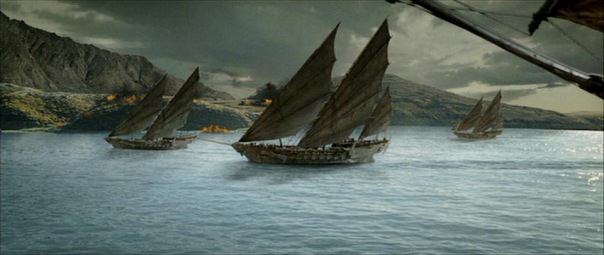
Ships
Frigate
The most common warships, frigates are designed to be swift and deadly. These vessels are a favorite of the Corsairs of Umbar.
- Control Skill: Operating
- Complement: 12
- Passenger Capacity: 25
- Price/Rarity: 200,000/7
- Consumables: 3 months
- Encumbrance Capacity: 150
- Weapons: 2 ballista (Fire Arc Forward and Fire Arc Rear; Damage 2; Critical 5; Range [Short]; Breach 1, Prepare 2, Slow Firing 1)
Merchant Vessel
Merchant vessels have no weapons, as they are predominantly designed to carry as much cargo as possible. As most of the space is taken up by storage, they do not have as much room for passengers as other ships, and usually only have a small group of guards for defense in the case of attacks by pirates.
- Control Skill: Operating
- Complement: 10
- Passenger Capacity: 15
- Price/Rarity: 100,000/6
- Consumables: 4 months
- Encumbrance Capacity: 250
- Weapons: None
Siege Ship
The largest and most devastating ships on the seas of Middle Earth, siege ships boast two large catapults, designed to sink or set fire to smaller vessels or to bombard coastal settlements. While not often seen, these ships are devasting war machines.
- Control Skill: Operating
- Complement: 25
- Passenger Capacity: 20
- Price/Rarity: 300,000/8
- Consumables: 3 months
- Encumbrance Capacity: 200
- Weapons: 2 catapults (Fire Arc Forward and Fire Arc Rear; Damage 3; Critical 3; Range [Medium]; Breach 2, Blast 20, Prepare 3, Limited Ammo 1, Slow Firing 1) or (Fire Arc Forward; Damage 2; Critical 3; Range [Medium]; Breach 1, Blast 20, Burn 10, Prepare 3, Limited Ammo 1, Slow Firing 1)
Siege Weapons
In war, sometimes soldiers aren't enough. Stone fortresses and iron-bound gates aren't going to fall to swords and arrows. That is when siege weapons come in. These massive machines tear down fortifications, allowing soldiers to take fortresses without being forced into a prolonged siege.
Ballista
Basically a very large crossbow, ballista are smaller, more accurate, and easier to move than other siege weapons, though they pay for this with less range, firepower, and area of effect.
- Control Skill: Siege
- Complement: 1
- Passenger Capacity: None
- Price/Rarity: 10,000/6
- Consumables: None
- Encumbrance Capacity: None
- Weapons: Ballista bolt (Fire Arc Forward; Damage 2; Critical 4; Range [Short]; Accurate 1, Breach 1, Prepare 2, Limited Ammo 1, Slow Firing 1)
Catapult
A standard rock-throwing machine, catapults are larger and more powerful than ballista, but not as powerful as the more advanced trebuchet. They can lob boulders and balls of flaming tar over large distances, though they have also been known to throw corpses as a means to demoralize and cause illness among a defending force during a siege.
- Control Skill: Siege
- Complement: 4
- Passenger Capacity: None
- Price/Rarity: 20,000/7
- Consumables: None
- Encumbrance Capacity: None
- Weapons: Boulder (Fire Arc Forward; Damage 3; Critical 3; Range [Medium]; Breach 2, Blast 20, Prepare 3, Limited Ammo 1, Slow Firing 1), burning tar ball (Fire Arc Forward; Damage 2; Critical 3; Range [Medium]; Breach 1, Blast 20, Burn 10, Prepare 3, Limited Ammo 1, Slow Firing 1)
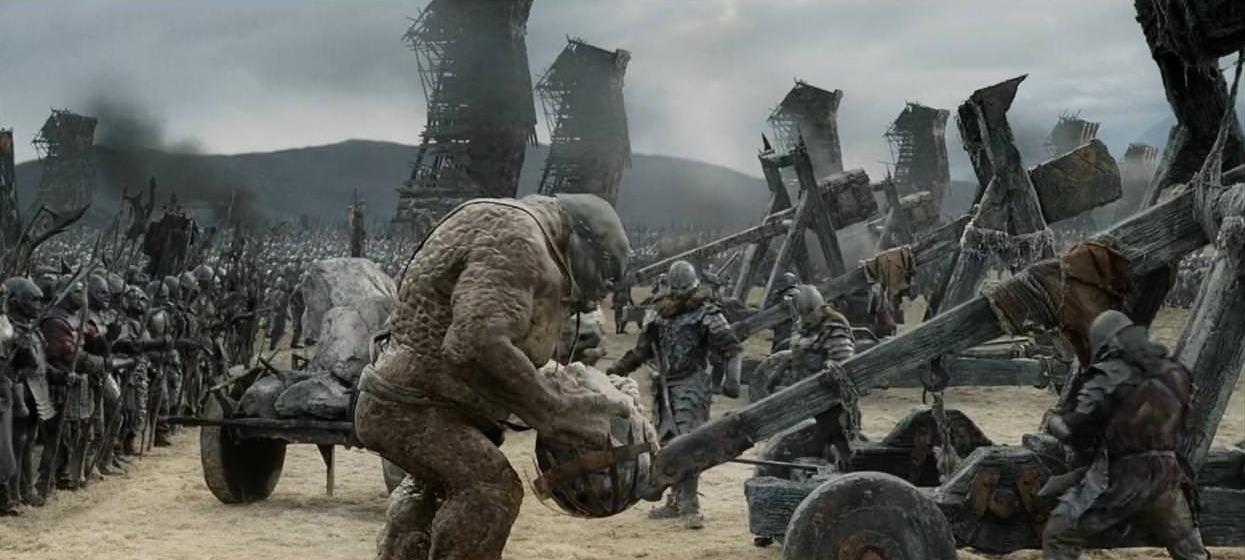
Trebuchet
A more sophisticated and advanced variant of the catapult, trebuchets are capable of throwing massive objects over a great distance. The city of Minas Tirith has trebuchets along its seven walls and uses large pieces of rubble from the stone city as ammunition for these mighty siege weapons.
- Control Skill: Siege
- Complement: 6
- Passenger Capacity: None
- Price/Rarity: 30,000/8
- Consumables: None
- Encumbrance Capacity: None
- Weapons: Rubble (Fire Arc Forward; Damage 4; Critical 3; Range [Long]; Breach 2, Blast 30, Prepare 3, Limited Ammo 1, Slow Firing 1)
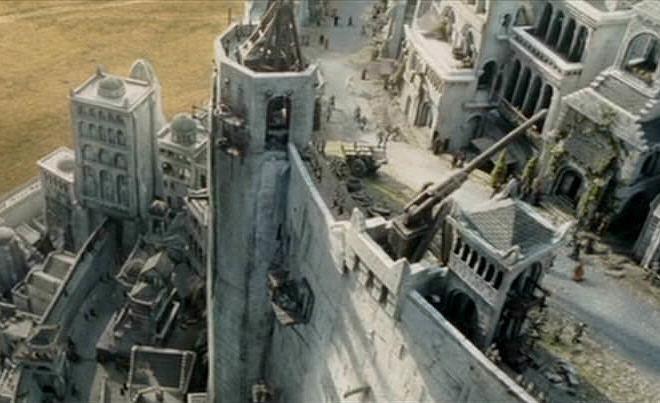
Mounted Combat
From the Riders of the Mark to the Lancers of Rivendell, warriors across Middle Earth ride into battle atop fierce steeds, while the servants of the Enemy often ride savage wargs into battle. These steeds give speed and maneuverability in combat and a skilled rider has numerous advantages over opponents on foot.
Mounting or dismounting from a riding animal requires a maneuver. Once mounted, a rider and steed should be treated as one character in most situations (attacks target the rider, the steed does not act independantly in structured encounters, and both act when a player chooses an initiative slot for their mounted character).
A mounted character can perform a maneuver to direct their mount to move. The rider and mount immediately move as if they had performed two maneuvers to do so (ex: instead of traveling from engaged to short range, they can travel from engaged to medium range). In certain situations, such as controlling a mount not trained for combat in the midst of a large battle, your GM may istead require the character to make a Riding check as an action to direct and control the mount.
Generally, a mounted character has an advantage in melee against opponents and should add b to melee combat checks targeting them, while opponents on foot add b to melee attacks against mounted characters. Conversely, firing a ranged weapon from the back of a galloping horse is more difficult, and a mounted character should add b to ranged attack checks. Your GM will make the final call on adding b and b to checks performed while mounted, as with any check.
Since we treat a mount and rider as one character, the only way to target a mount is by using the aim maneuver to target specific "parts" of an opponent, as per page 98 of the Genesys Core Rulebook. (In certain circumstances, your Gm may allow characters to attack a particularly large mount such as a fell beast without penalty.)
A character whose mount is slain or incapacitated is knocked prone and suffers 3 strain. Depending on the situation and the results of any related check, the character might suffer additional damage or become trapped under the fallen mount.
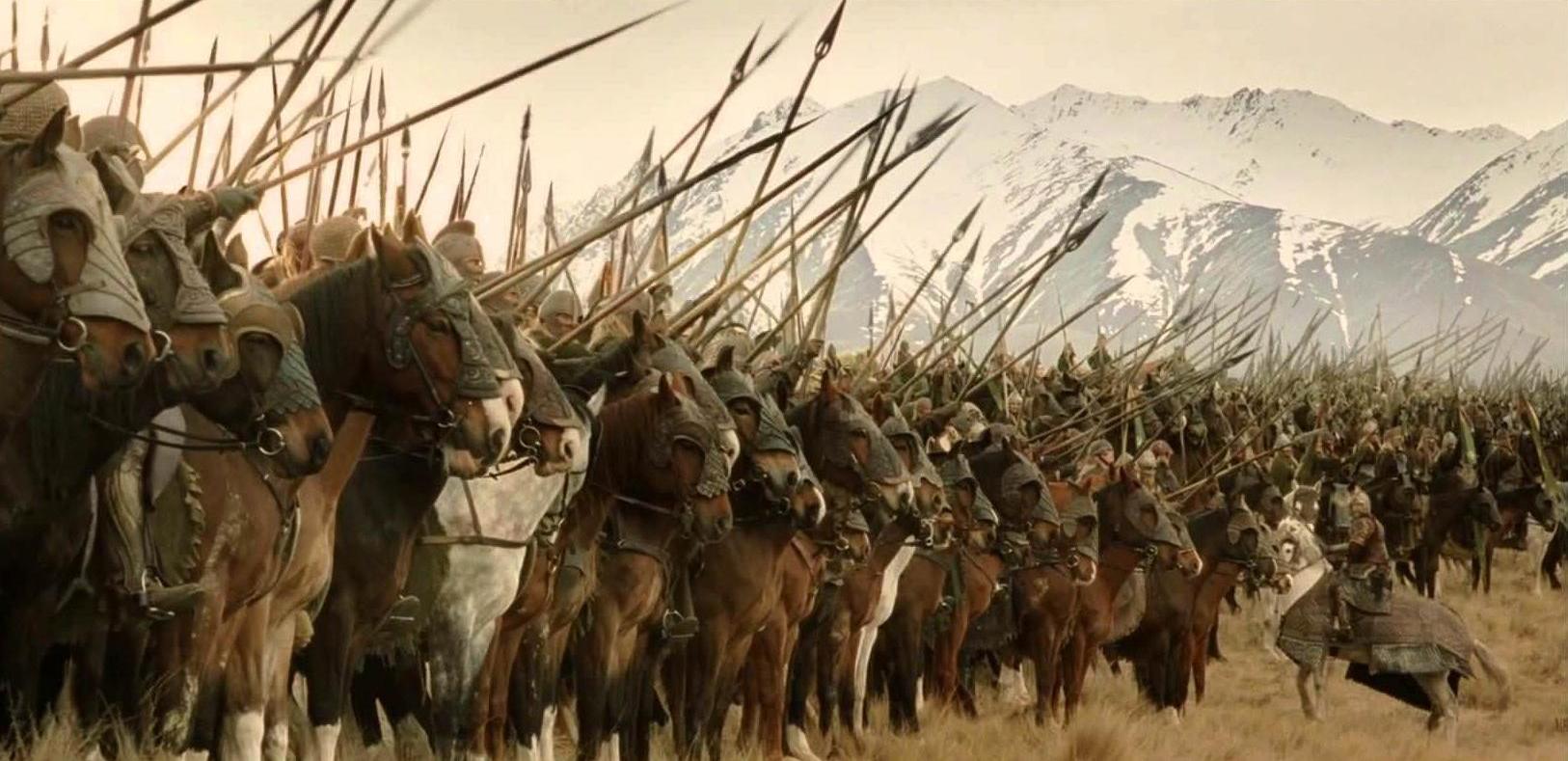
Crafting and Magic
Crafting
Crafting is a large part of the world of Middle Earth. The Noldor and Durin's Folk are both renowned for their great smiths and craftsmen, and some of the greatest works of craftsmanship have had a profound impact on the history of Middle Earth, from the Elder Days to the Third Age and beyond.
Characters may craft almost anything, from swords and crossbows to ships and siege weaponry, given sufficient time, resources, and skill. Although fletching, blacksmithing, and tannery are very different trades, for simplicity most crafting uses the Crafting skill (replacing Mechanics). All crafting follows the same basic guidelines, although the process your character undertakes witihin the narrative may vary greatly. Of course, your GM might modify these rules based on the situation and the specific item, and might impose additional requirements.
Creating items first requires that the PC knowns how to craft the item in question. The GM can determine how exactly this must be discovered, whether during play, buying blueprints, or some other method. Once the PC knows how to craft the item, they can begin work on the item, with the time and resources required determined by the difficulty of the item.
The difficulty of the check is generally half the rarity of the item, rounded up. For instance, an item with a Rarity 1 or 2 would be an Easy (d) check, while an item with Rarity 9 or 10 would be a Formidable (ddddd) check. The check can be effected by other circumstances, adding b or upgrading the difficulty of the check. (The GM is recommended to upgrade the difficulty of crafting magical items.)
Alchemy
While alchemy has a major role in many fantasy settings, it takes a bit of a backseat in Middle Earth. Poisons and special drinks still exist, but they have much less of a role and their effects are far less varied. Thus, any checks that would normally use the Alchemy skill instead use the Crafting skill. You should discuss with your GM what sort of "potions" would be suitable in their campaign.
Roughing It
Your Game Master may allow characters to use the Survival skill to craft certain simple items, such as crude spears and traps. This follows the normal rules for crafting, but such items are not made to last, and generally wear out quickly. The GM may spend d on any check involving an item crafted using Survival to cause the item to break and become unusable.
To craft an item, your character must have appropriate tools and components. For instance, to craft a sword, your character must have access to a forge, craftsman's tools, and a supply of iron equal to half the cost of the item. Typically, the cost of raw materials to craft an item is equal to half the cost of the item. These materials are consumed in the process, whether the crafting check succeeds or fails.
The process of crafting an item takes one day, plus a number of days equal to the rarity of the item. This does not include any time spent gathering tools or supplies. Your GM may decide that some items take significantly more or less time, depending on the nature of the item and its construction.
If the crafting check is successful, your character creates the item. Additionally, you and the GM may spend dice symbols for additional effects, as shown in Table 2-1: Spending a, h, t, d on Crafting Checks. Of course, these effects are only examples, and you and the GM might come up with additional results.
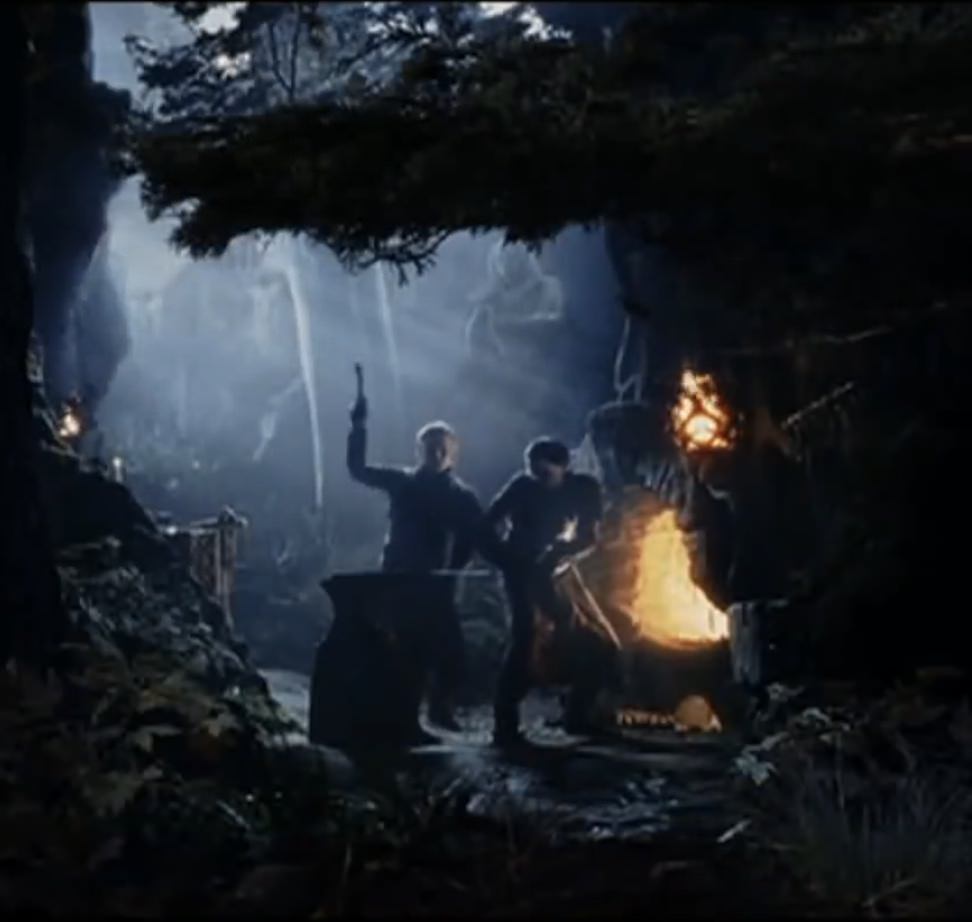
Table 3-1: Spending a, h, t, d on Crafting Checks
| Cost | Effect |
|---|---|
| a or t | 1. Reduce the time to craft the item by one day, to a minimum of one. (You may select this option multiple times.) 2. Your character adds b to their next check using the same skill. |
| aa or t | 1. Your character saves enough materials to reduce the cost of the next similar item they craft by half. 2. Decrease the item's encumbrance by one, to a minimum of 0. 3. If the item has the Limited Ammo 1 quality or is otherwise limited to a single use, craft one additional identical item. (You may select this option multiple times.) |
| aaa or t | 1. Increase the item's hard points by one. 2. Reduce the difficulty of future checks to craft the item by one (to a minimum of Simple [-]). |
| t | 1. The item gains the Superior quality. 2. Increase the value of one numerical benefit of the item by one or increase the rating of one quality the item possess by one, ecluding damage, critical rating, soak, and defense (e.g., the extra encumbrance capacity a backpack adds). 3. Increase the narrative benefit of the item, or add a new narrative effect, as approved by your GM. |
| t t | The item gains one other item quality, subject to your GM's approval (You may select this option once.) |
| h or d | 1. Increase the time to craft the item by one day (You may select this option multiple times.) 2. Add b to the next crafting check the character makes. |
| hh or d | 1. Increase the item's encumbrance by one. 2. Your character must purchase additional materials worth half the original component cost. |
| hhh or d | 1. If the item is a weapon, it gains the Inaccurate 1 quality. 2. Decrease the item's hard points by one, to a minimum of 0. 3. Your character's tools are ruined in the process and must be replaced. |
| d | 1. The item gains the Inferior quality. 2. Whenever the item is damaged, it is damaged one additional step. |
| d d | There is a terrible accident, and your character suffers a Critical Injury, or, at the GM's discretion, some related narrative event can occur of equal distress (your character's anvil explodes, the smithy catches on fire, poison gases spread into the village, etc). |
Magical Items
Middle-Earth is a world filled with magical items, from Rings of Power and scrying mirrors to talking purses and buttons that fasten themselves. Some of them, such as the aforementioned Rings of Power, are items both great and terrible, while others are silly things that do little other than amuse the reader. In such a world, it makes sense that we would want rules for how to craft these mystical objects.
Like all other equipment, magical items are created with a Crafting check, the time and resources required to complete the check and the difficulty of the check being determined by the rarity of the item. With magical items however, another check is also required. To know how to craft a certain type of magical item, make a Knowledge (Lore) check. (Note: The art of creating true Rings of Power is so lost that not even Saruman, after millennia of searching, could discover it, so don't expect to create a second One Ring.)
Table 3-2: Knowledge (Lore) and Crafting Magical Items
| Difficulty | Examples |
|---|---|
| Easy (d) | Weapons that glow when orcs (or some other category of creature) are around (ex: Sting), other minor narrative effects |
| Average (dd) | Items that add b to skill checks, moderate narrative effects |
| Hard (ddd) | Items that upgrade ability of skill checks (ex: Elven cloaks & Stealth), major narrative effects |
| Daunting (dddd) | Runestones, Unbreakable Items (Reinforced quality) |
| Formidable (ddddd) | Lesser Rings of Power |
Magic
Characters with direct magical powers are rare in Tolkien's mythology. Most of these individuals are Ainur (gods/angels), whether Valar (greater gods/archangels) or Maiar (lesser gods/angels), including characters such as Sauron & the Balrog (both fallen Maiar) or the Five Wizards (Maiar in mortal form).
However, there are certain individuals in Middle Earth that are not Ainur and have magical powers, such as the elven warrior Glorfindel, the Lady Galadriel, and to a smaller extent Aragorn. The Mouth of Sauron is described as a sorcerer, the Nine Rings of Men were said to make those who wore them power sorcerers, and the Witch King is shown casting certain spells.
So, I tried my hand at creating a magic system that stays at least mostly true to Tolkien's mythology. These are optional rules, so if your GM wants, characters with outright magical abilities might be restricted in your game. Characters with magical powers in Middle Earth generally seem to have very polarized roles in the struggle between good and evil, or Hope and Shadow. Glorfindel is a prime example, as he was reincarnated by the Valar and sent back to Middle Earth as their champion, while characters like the Mouth of Sauron and the Witch King are about as evil as they come, and have studied dark sorcery under Sauron himself.
So here, your magical ability is tied directly to your relation to Hope and Shadow. No character starts off with magical abilities, but they can earn them through drawing nearer to light or darkness, either discovering the light within themselves or learning dark sorcery from the Enemy. When making magic checks, instead of using a characteristic like Intellect, Cunning, or Willpower, the base ability of the check is determined by how high or low your Hope is.
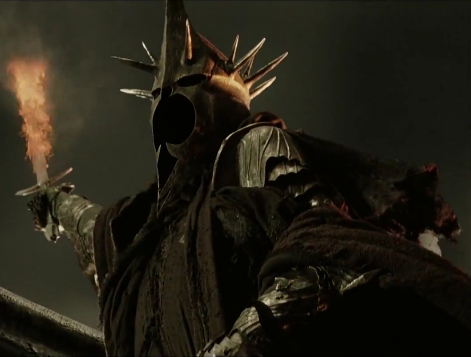
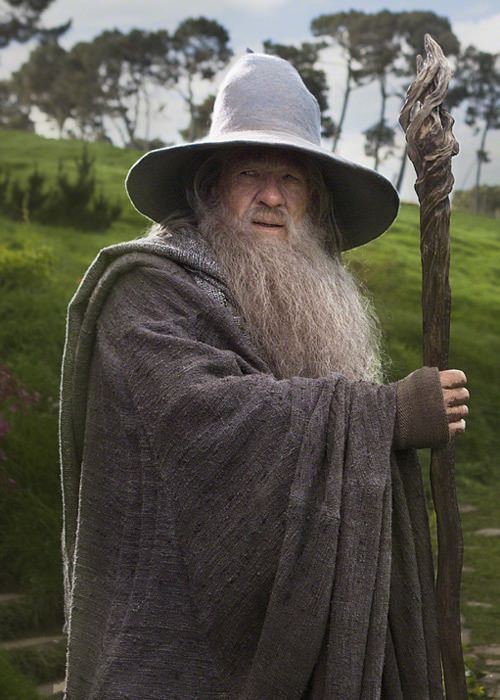
Light magic is earned from a high Hope and is unlocked at Valorous. It represents unlocking the light within yourself to wield great power, and ugrades the check by their ranks in Discipline. The ability is increased at Wise and Champion of the Valar (See Hope and Shadow). Dark sorcery is earned from a low Hope and is unlocked at Miserable. It represents learning dark secrets and the sorceries of the Enemy, and upgrades the check by their ranks in Knowledge (Forbidden). The ability is increased at Corrupted and Fallen (See Hope and Shadow). Because magic is rarely used in Middle-Earth even by those with such powers, a character may only make a Magic check once an encounter.
Light magic can use the Attack, Augment, Barrier, Dispel, Divination, & Heal actions. Dark sorcery can use the Attack, Augment, Curse, Divination, Enchantment & Illusion actions. (See the Magic on Therill pdf in the Genesys Master Resources list on the Forums)
Hope and Shadow
Hope
Hope is a powerful force in Tolkien's world, and one of the primary themes of all his works. No matter how dark the night becomes, there is always hope for the dawn. While most say that Lord of the Rings is a story of Good versus Evil, it may be more accurate to say that it is more a story of Hope versus Shadow.
It is Hope that gives the Fellowship strength in their darkest moments. It is the influence of Shadow that drove Saruman to give up Hope that Sauron could be defeated, and thus fell to darkness himself.
In this system, all characters have a Hope rating, starting at 50. Actions that they make can raise their Hope, while other actions can cause them to fall to Shadow, causing their Hope to fall. Character's actions have an important impact on their role within the battle between Hope and Shadow.
Champion of the Valar (91-100)
You are above all temptation and fear. The Hope of the Valar burns within you, and the deceits of the Enemy are nothing to you. Your mastery of the powers of Arda is nearly unmatched, your ability with magic growing to ddddd. Add bbbb to checks to resist fear and temptation.
Wise (81-90)
You are among the Wise of Middle-Earth, able to see through all the deceits of the Enemy. Your mastery of unknown powers grows, your ability with magic growing to dddd. Add bbb to checks to resist fear and temptation.
Valorous (71-80)
Your Hope burns bright, and there is little the Enemy can do to darken that flame. The brightness of your hope enables you to call upon magical powers to aid in your struggle against the Enemy. Your ability with magic is ddd. Add bb to checks to resist fear and temptation.
Hopeful (61-70)
You have Hope for the future of Middle Earth and are practiced in resisting fear and the deceits of the Enemy. Add b to checks to resist fear and temptation.
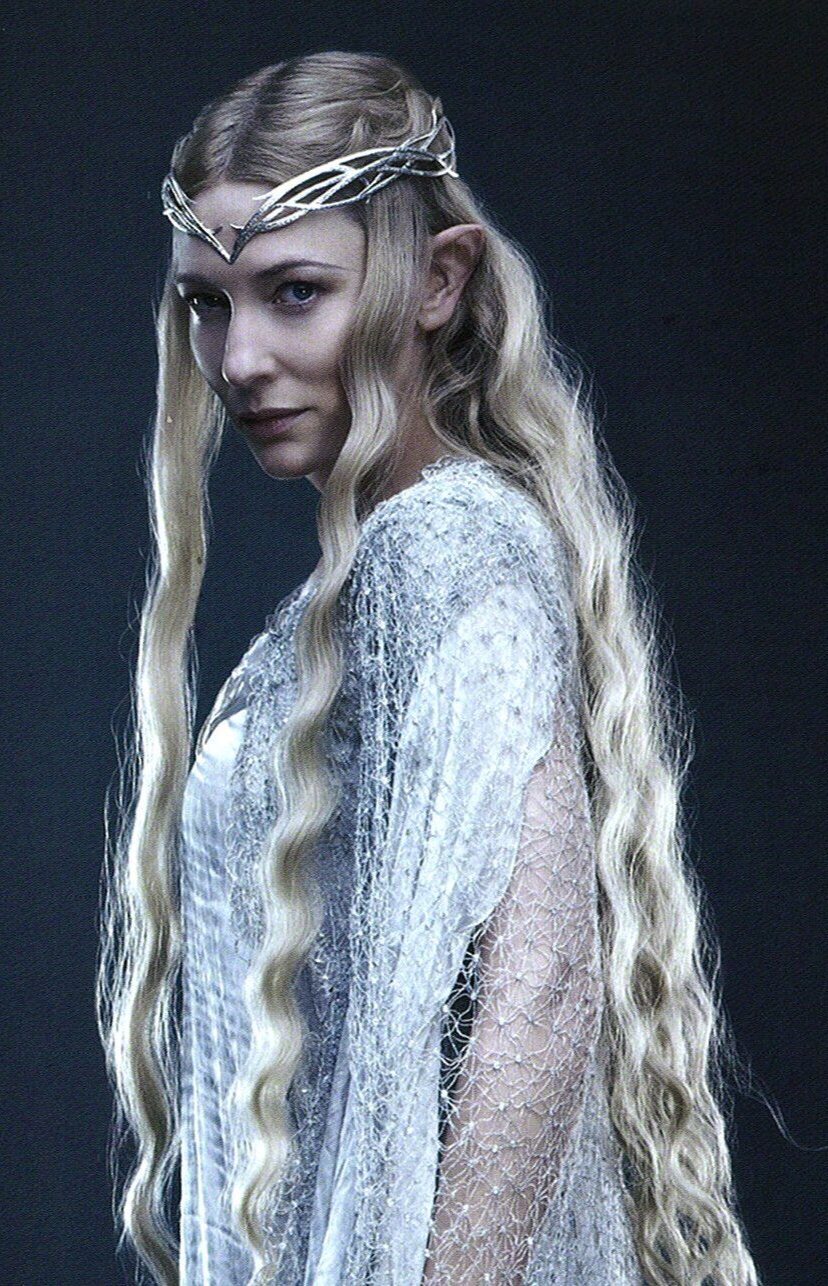
Normal (41-60)
You are a fairly average individual. You have not been corrupted by Shadow, but neither have you fully let Hope into your heart.
Lost (31-40)
The Shadow seems to grow stronger, and you cannot see how Hope could be enough to defeat it. Add b to checks to resist fear and temptation and b to checks to find dark secrets and forbidden knowledge.
Miserable (21-30)
What Hope could possibly stand against the power of the Enemy? You have become a miserable creature, the deceits of the Enemy seeming ever more logical. Your newfound knowledge of dark secrets enables you to tap into those vile powers. Your ability with magic is ddd. Add bb to checks to resist fear and temptation and bb to checks to find dark secrets and forbidden knowledge.
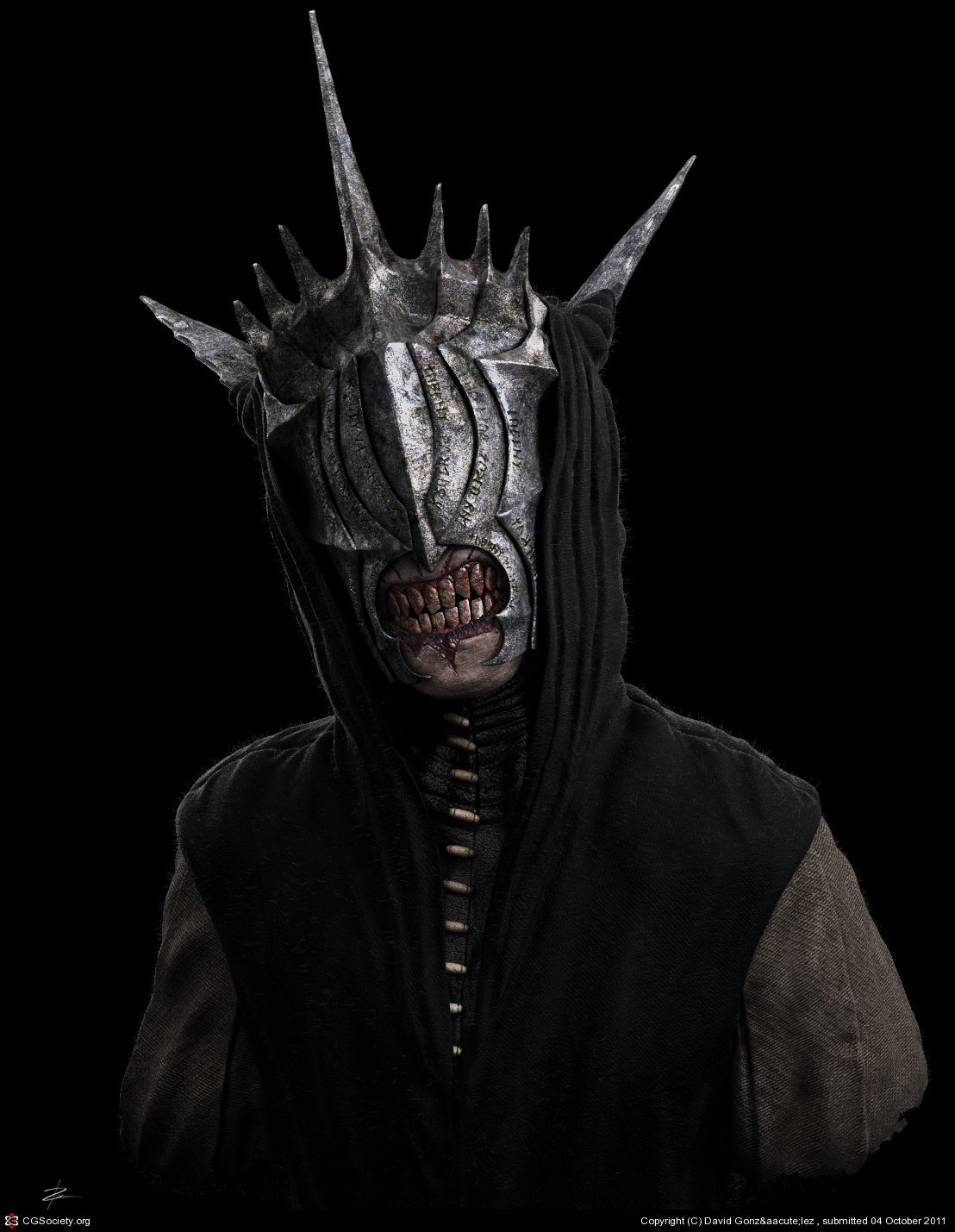
Corrupted (11-20)
There is no Hope. You have been corrupted by the deceits of the Enemy, becoming a servant of his dark will. You continue to learn forbidden secrets from your new master, growing stronger in evil, your ability with magic growing to dddd. Add bbb to checks to resist fear and temptation and bbb to checks to find dark secrets and forbidden knowledge.
Fallen (0-10)
You have completely fallen under the power of the Enemy, and are now little more than an extension of his will. You are a master of the dark arts of the Enemy, your ability with magic growing to ddddd. Add bbbb to checks to resist fear and temptation and bbbb to checks to find dark secrets and forbidden knowledge.
Table 4-1: Pull of Shadow
| Shadow | Action |
|---|---|
| 1 | Knowing Inaction: The PC knows that an NPC or another PC will do something particularly bad (an action that would earth 5+ Shadow) and chooses not to intervene. Lying for Personal Gain: The PC tells a lie for selfish reasons or to benefit himself. Some lies can be told without penalty to benefit others, such as avoiding a combat situation or protecting innocents. Resorting to Violence as the First Solution: When confonted with a problem, the PC defaults to violent acts to solve it, without exploring any other options. This penalty can be mitigated if the PC is the one being attacked. |
| 2 | Coercion and Threatening with Violence: The PC threatens someone with violence, or coerces the person to do his bidding against the person's will. Inflicting Emotional Abuse: The PC says something cruel or petty just to upset or cause mental torment in a person. |
| 2-3 | Theft: The PC steals something that does not belong to him. The Shadow can be mitiaged in this case if the PC is stealing from a corrupt authority or evil being, and does so to give back to those who need it. The Shadow can be increased if the PC steals something from those who can particularly ill afford to lose it. |
| 3-4 | Unnecessary Destruction: The PC destroys objects, property, or other items willfully and without good cause. |
| 4-5 | Unprovoked Violence or Assault: The PC assaults, beats, or otherwise attacks an NPC or PC for no reason. Searching for Forbidden Knowledge: The PC does research into foridden knowledge to discover the secrets of the Enemy. Even if they do so with the intent of using this knowledge against the Enemy, it is still corruptive to search for these dark secrets. |
| 6-7 | Unnecessary Cruelty to Non-Sapient Creatures: The PC maliciously torments animals or other creatures with animal-level intelligence (tormenting intelligent animals such as the Great Eagles would be classified under torture). |
| 10 | Torture: The PC tortures a character. Performing Dark Rituals: The PC uses forbidden knowledge to call upon dark powers. |
| 10+ | Murder: The PC murders a character. In this case, murder is killing someone who is helpless or no threat to the PCs. |
Table 4-2: Birth of Hope
| Hope | Action |
|---|---|
| 1 | Inspired: Another PC succeeds in a Leadership check (potentially during a rousing speech) and inspires the PC to find Hope. Other inspiring events could have the same effect, such as seeing a previously corrupted land being healed, or coming into someplace beautiful like Rivendell or Lorien after a particularly hopeless journey. |
| 2-3 | Inspiring: The PC succeeds a Leadership check (see prior example), inspiring others to find Hope, and finding greater reserves of Hope themselves. Small Acts of Kindness: The PC helps an NPC with no indication of being repaid in any way. |
| 4-6 | Self-Sacrifice: The PC helps an NPC or another PC, knowing that it will hurt or otherwise negatively impact themselves to do so. |
| 10+ | The Ultimate Sacrifice: The PC sacrifices their own life to save another, fully aware that it will result in their own death (This will obviously not come up very often, but might be the end of a character's redemption arc or a similar situation. I would caution against using this for "false sacrifices" in which the character thought they were going to die but didn't, or they died and then came back to life. While Gandalf could be considered an example of this, he is a rare case.) |
Fear
Fear is an adversary more dangerous than any goblin horde. It drives us to commit dark acts we otherwise would not have contemplated, and strips us of Hope. While actually committing evil acts certainly draws one under the Shadow, fear can do the same, whether evil acts have been committed or not.
Besides the impact on a character's Hope, fear can have other effects as well, even damaging one's mind. Fear is one of the greatest weapons of the Enemy, and if they cannot corrupt you, they will seek to break you. Whenever a PC fails a fear check they gain 1 point of Shadow, when they succeed their Hope increases by 1.
Table 4-3: Fear Guidelines
| State of Fear | Difficulty | Example |
|---|---|---|
| Startled | Easy (d) | Something momentarily frightening, such as someone leaping out of a closet to surprise you, or unsettling circumstances like being alone in a spooky ruin. These circumstances may not even elicit a check. |
| Moderately Afraid | Average (dd) | Confronting something unexplainable, such as objects moving when you are not looking or voices in an empty space; being stalked by a dangerous animal; danger that appears credible but nor mortal. |
| Very Afraid | Hard (ddd) | Ghostly apparitions and other obviously supernatural occurences, being hunted by a pack of wild animals (or malevolent humans, orcs, etc), danger that seems eminent and could be mortal. |
| Mortally Afraid | Daunting (dddd) | Being actively hunted by a wraith, wight, or other malevolent supernatural being, being attacked by a mythical beast, or facing a situation likely to result in your death. |
| Utterly Terrified | Formidable (ddddd) | A hopeless and utterly terrifying situation, combat against things incomprehensible to one's mind, being attacked by multiple Nazgul, fear so paralyzing that sanity cracks. |
Effects of Fear
Suggested effects for generating h or d:
- Adrenaline Rush: Momentary panic gives the character a rush of adrenalin, but at a cost. The character adds b to their next check, but suffers 3 strain. This is a good penalty for success with h.
- Flee in Terror: The character has to spend their next turn doing nothing but fleeing the source of their fear check (this includes downgrading their actions to maneuvers to move farther away), and gains 1 additional point of Shadow. This is a good penalty for failure with a small amount of h.
- Frozen in Terror: The character is immobilized and staggered during their next turn and gains 3 additional points of Shadow. This is a good penalty for failure with a lot of h or d.
Suggested effects for generating a or t:
- Stand with Me: The character's steadfast response emboldens their allies, giving them all 1 additional Hope. Any allied characters forced to make a fear check from the same source add b to their check. This is a good result for passing a fear check with a.
- Fearless: The character faces the source of feat and finds that it no longer has a hold on them. They gain 3 additional Hope and automatically pass any further fear checks from that source. This is a good result for succeeding with t, but you should not apply these results if the source is the character's Fear motivation.
Oaths
Oaths are an optional rule for Adventures in Middle Earth. Oaths have a long history in Middle Earth, and have often changed the fates of many. The elf-smith Feanor and his sons swore an oath to recover the Silmarils from Morgoth no matter what or who stood in their way. It was this same oath that led to the Doom of Mandos and caused so much grief for the Noldor for millennia to come. When the Men of the Mountain broke their oath to come to Gondor's aid, Isildur cursed them, and it was only by fulfilling their oath when called upon by Aragorn that the Oathbreakers finally found peace.
When using the Oaths optional rules, players choose a fifth motivation for their character during character creation: An Oath. The Oath drives the character to perform acts that will fulfill the oath, whether for good or ill. However, while fulfilling the oath may result in foul events, breaking the oath is even worse, with the results determined by the GM.
The PCs each have a Oath rating that shows how far they need to go to fulfill their oath. Different actions they take in the game help them to fulfill their Oath overtime (similar to Obligation in EotE). They can choose to start with a greater Oath they need to fulfill in order to gain an advantage, adding 10 to their total Oath value and gaining either 1000 gold or 10 additional starting xp.
The GM makes a table out of the character's Oath value, and before each session rolls a d-100 to determine if someone's Oath will impact that session, and if it does, whose Oath it is. That person has their strain threshold reduced by 2 for the session, and will have to deal with their Oath in some manner or another.
Players can also incure a greater Oath value during play to receive rewards related to their Oath. Someone with the Treasure Oath might discover a part of their stolen treasure, which fills them with a greater desire to recover the rest of their stolen riches. Someone with a Revenge oath might find someone else wronged by their enemy who promises to help them out.
A broken Oath frees the player of the binding of the Oath, but gives them a different Motivation, a Curse. Curses are determined based on the nature of the Oath broken, determined by the GM. The Curse cannot be used to help the player, and can only be removed by an act that fulfills their previous Oath. The GM is encouraged to make the Curse a regular nuisance for the players, to ensure the players understand the danger of breaking an Oath, and attempt to rectify it.
Table 5-1: Group Oath Example
| Oath Value | Oath Type | Character |
|---|---|---|
| 1-15 | Redemption | Athelon |
| 16-25 | Love | Ithariel |
| 26-35 | Revenge | Grigni |
| 36-45 | Loyalty | Shoto Took |
Table 5-2: Specific Oaths
| d100 | Result |
|---|---|
| 01-14 | Revenge: The PC has sworn to take revenge on someone or something that has wronged them, and will do anything to get their vengeance. |
| 15-28 | Treasure: The PC once had great riches or an item of great value, and they have sworn to do anything to get their treasure back. |
| 29-42 | Love: The PC loves someone and has promised to do anything for the person they love. |
| 43-57 | Redemption: The PC did something disgraceful once in the past, and has sworn to do anything to redeem themselves. |
| 58-70 | Cause: The PC was sworn themselves to a cause, such as restoring a people to their ancestral home, and will do anything to further their cause. |
| 71-85 | Fealty: The PC has sworn their life and service to a Lord or another ruler. They will do anything that their lord commands them. |
| 86-100 | Friendship: The PC has sworn friendship to someone else, and will do anything to help or protect them. |
Epic Play
Lord of the Rings is the epitome of epic sagas. Unstoppable evil, impossible odds, powerful magic, and unquenchable hope all typify this wonderful world that Tolkien has created for us. There is plenty in this world for starting characters to deal with, from goblins and ruffians to wolves and giant spiders, but Middle Earth is also a land of fire-breathing dragons, giant trolls, and demons of shadow and flame from the Elder Days. If there is any setting that deserves rules for Epic Play, it is Middle Earth.
Epic Play is an opportunity for your players to start off as characters with greater power and a little more experience under their belts, more like Aragorn, Legolas, and Gimli than Frodo, Sam, Merry, Pippin, or our old friend Bilbo. Epic characters start off with an additional 150 xp (which cannot be spent to increase Characteristics) and 3000 gold, giving them the opportunity for greater power and better equipment than any starting character.
Epic characters also get to choose to start off with a Hope rating of either 71 or 30, making them either Valorous or Miserable. This not only gives them greater strength to resist the Enemy (or greater resources to study his ways), it gives those players that want it the option to start off with magical abilities.
GMs, be prepared to give your heroes greater challenges in Epic Play. While hiding from an orc hunting party works with characters with lower xp, Epic characters will need something more challenging. An invasion from the South might be imminent, and if the Haradrim manage to bring their massive Mumakil to the walls of Minas Tirith the city could fall, so your heroes are sent into the wastes of Harad to kill the beasts before they can be used against Gondor. Perhaps Angmar is rising again in the North, and your heroes must battle the Nazgul and their fell minions, keeping them from using the bones of an ancient dragon to create the most terrifying wight that has ever been. The possibilities are limitless, but remember to make it epic!
Mass Combat
While adventures with small companies and fellowships are a staple of Middle Earth, so are massive battles. From the Battle of the Five Armies to the Battle of Pelennor Fields, the Free Peoples have long been at war with the forces of Sauron, and long before that the Eldar and the Edain battled alongside the Valar against Morgoth and his endless legions.
Mass Combat is very different than individual combat. Luckily, this is a highly narrative system, so we get to skip all the boring bits of warfare and really experience those cinematic moments. After all, this is all about telling a great story.
The first thing is to seperate the battle into Phases. The GM should have a rough idea of how the battle could go, and thus develop several Events to structure the battle around, with each event starting a new phase of the battle.. Each of these events should mark a change in the battle. (For example, in the Battle of Helm's Deep, the destruction of the Deeping Wall and the arrival of Gandalf and Eomer would both be events separating phases.) The GM rolls a Mass Combat check at the transition between each phase and the next to determine how the battle has unfolded and may affect the phases to come.
When planning mass combat, the GM should determine what constitutes a victory or defeat for the active force during each phase. The GM should also consider what the PCs can do in each phase to facilitate a victory for their own side of the battle and prepare encounters for them accordingly.
The base ability of the acting force (the player's side) is determined by the size and strength of the force, while the difficulty of the check is determined by the size and strength of the enemy force.
Table 6-1: Active and Enemy Forces
| Force Strength | Acting Force | Enemy Force |
|---|---|---|
| Trivial | d | d |
| Significant | dd | dd |
| Imposing | ddd | ddd |
| Staggering | dddd | dddd |
| Vast | ddddd | ddddd |
| Overwhelming | dddddd | dddddd |
Table 6-2: Force Strength
| Strength | Force |
|---|---|
| Trivial | 200 goblins/human militia, 50 orcs/human soldiers, 12 uruk-hai/dwarves |
| Significant | 800 goblins/human militia, 200 orcs/human soldiers, 50 uruk-hai/dwarves, 12 elven warriors |
| Imposing | 3000 goblins/human militia, 800 orcs/human soldiers, 200 uruk-hai/dwarves, 50 elven warriors, 12 trolls |
| Staggering | 10,000 goblins/human militia, 3000 orcs/human soldiers, 800 uruk-hai/dwarves, 200 elven warriors, 50 trolls |
| Vast | 40,000 goblins/human militia, 10,000 orcs/human soldiers, 3000 uruk-hai/dwarves, 800 elven warriors, 200 trolls |
| Overwhelming | 40,000 orcs/human soldiers, 10,000 uruk-hai/dwarves, 3000 elven warriors |
While the ability and difficulty of the dice pool represent the tangible elements of the battle, upgrades to that pool represent how well those elements are being used. A good enough leader can turn the tide of a battle, and a poor leader can mean disaster. The forces of Minas Tirith were in shambles under Denethor's leadership, and it was not until Gandalf stepped in that they began to present a real defense.
The ability of the pool is upgraded a number of times equal to the Leadership skill of the leader of the acting force, and the difficulty of the pool is upgraded equal to the Leadership skill of the leader of the opposing force. For a leader to give this upgrade, the leader needs to be able to command. If they are cut off from their troops in some way, the force loses the advantage.
Boost and Setback dice are added based on other elements that may be affecting the battle. These can include the moral of the forces, circumstances on the battlefield, actions of the PCs, and any other extraneous circumstances.
At the end of a Phase, the GM rolls a Mass Combat check to determine how the phase went. On a successful check, the acting force accomplishes its objectives for that phase or prevents the enemy from achieving their objectives. Objectives could range from pushing back an enemy advance to overtaking the enemy force's current position. Additional s can be spent to achieve further goals or increase the magnitude of success.
In some cases, the GM may want to define success in degrees. If the goal for that phase was to buy time for peasants to escape, each additional s might mean another set of civilians escape the conflict faster than expected, which could lead to the battle lasting fewer phases.
On a failed check, the enemy force achieves its objectives for that phase, or the active force is halted. The enemy objective may be to break through the fortress gates or to slaughter all the civilians in the town.
Table 6-3: b and b in Mass Combat
| Reason to Add b | Reason to Add b |
|---|---|
| The acting force is in a defensible position (a fortress, a natural choke point, etc.) | The enemy force is in a defensible position (a fortress, a natural choke point, etc.) |
| The acting force has had ample time to prepare for the engagement (set traps, prepare covered positions, etc.) | The acting force is caught off guard, under extreme pressure, or otherwise unprepared for the battle (weapons are locked away, troops are out of position, defense systems are cycled down, etc.) |
| Weather provide the acting force with cover, the element of surprise, or a distraction to the enemy force. | Weather disrupts or distracts the acting force or provides the enemy with cover or the element of surprise. |
| The acting force is well supplied with ammunition, tactical data, or equipment that is particularly useful for the task at hand. | The acting force is low on ammunition, lacks reconnaissance data about the environment, or is undersupplied. |
| The acting force has noncombatant allies who provide useful support (carrying a resupply of useful supplies, acting as scouts or spotters, offering their knowledge of the battle site to the active force, etc.) | The acting force is hindered by noncombatant involvement in the battle (noncombatants are aiding the enemy force, present possible civilian casualties to guard against, are taken as hostages by the enemy, etc.) |
| The acting force is fighting for more than just martial victory or personal gain (higher ideals like protection of the innocent, freedom from tyranny, justice, etc.). | The acting force has particularly unheroic motives for its actions (conquest, pillage, vengeance, etc.) |
Table 6-4: Spending a, h, t, d in Mass Combat
| Result | Result Options |
|---|---|
| a or t | 1. Members of the acting force notice a key feature of the enemy force (enemy captain, siege weapon, etc.) and its position on the battlefield. 2. All Player Characters with the acting force can recover 1 strain. |
| aa or t | An attack by the acting force reveals a weakness in the enemy force's defenses. Add b to the next Mass Combat check as the acting force exploits the weakness. |
| aaa or t | 1. A previously unseen geographical feature of the battlefield (a vantage point atop a ruin, a rock formation, etc.) affords the acting force some advantage and allows it to upgrade the ability of the next Mass Combat check once it exploits that feature. 2. The acting force disables an important component of the enemy force that provided the enemy an advantage in battle (siege weaponry, a fellbeast/great eagle, etc.) 3. The acting force delivers a blow to the enemy leadership (killing their messengers, assaulting their position with siege equipment, etc.) Downgrade the difficulty of the next Mass Combat check once. |
| t | 1. The acting force effectively removes the enemy force commander from the next phase of the mass combat (by physically incapacitating him, cutting him off entirely from his troops, etc). Unless a new enemy force commander steps up, the enemy force does not upgrade the difficulty of the next mass combat phase. 2. Reinforcements arrive to support the acting force. These increase the force strength of the acting force by one step in future phases. |
| t t | 1. Sizable reinforcements arrive to support the acting force. These increase the force strength of the acting force by two steps in future phases. |
| h or d | 1. The PCs and NPCs with the acting force suffer 1 strain. 2. The fog of war creates confusion on the battlefield. Add b to the next Mass Combat check, as the acting force struggles to tell allies from enemies. |
| hh or d | 1. Each member of the enemy force adds b to the first skill check they make during the next Mass Combat phase. 2. Each member of the active force adds b to the first skill check they make during the next mass combat phase. |
| hhh or d | 1. The acting force gets bogged down in difficult terrain. As a result, it upgrades the difficulty of the next Mass Combat check once. 2. The enemy force disables an important part of the acting force's strategy, such as a siege weapon or some other element that provided the acting force an advantage in the battle. 3. The enemy force gains a significant advantage in the battle due to a blow to the command of the acting force (the Commander is wounded, messengers are killed, etc). Downgrade the ability of the acting force in the next Mass Combat check once. |
| d | 1. One of the PCs involved in the acting force (chosen at random, or as determined by the GM to fit the narrative) is greivously hurt in the fighting and suffers one Critical Injury. 2. A notable NPC within the acting force suffers a grievous Critical Injury. This deprives the acting force of a tangible asset and seriously endangers someone important to the PCs. 3. Communications are disrupted and orders are garbled. The commander of the acting force cannot clearly communicate orders to the troops. Unless another officer or respected leader who can communicate to the acting force steps in to take the commander's place, the acting force does not upgrade the ability of the dice pool in the next Mass Combat check. 4. Reinforcements arrive to support the enemy force, increase its force strength by one step in future phases. |
| d d | 1. Either succumbing to panic or enemy infiltration, a portion of the acting force turns traitor and joins the enemy force. Decrease the force strength of the acting force by one step and increase the force strength of the enemy force by one step in future phases. 2. Sizable reinforcements arrive to support the enemy force, icnreasing its force strength by two steps in future phases. |
Where do the PCs Fit In?
The PCs are the wild cards. As the heroes of the narrative, they are instrumental to the outcome of the battle. When planning a Mass Combat, it is up to the GM to determine what events the PCs will be able to take part in during each phase. Most importantly, the GM should determine what the objective of each phase is and what success or failure means for the greater scope of the battle.
The GM should provide ways that the players can influence the outcome of each phase, giving the players smaller objectives of their own, or simply interpreting their actions's effects and modifying the dice pool accordingly. If the player's actions would upgrade, increase, decrease, etc the pool, adjust it accordingly. Most often, the actions of the PCs are likely to add b or b to the check, or remove existing b.
Turning Points
Mass Combat is as much about the PCs and their actions as it is about the forces clashing around them. This is the story of their adventures after all. The PCs have an enormous capacity to affect the world around them, in many cases far exceeding what appearances would suggest.
When the actions of the PCs cause extreme results on the battlefield, the GM can call an end to the current phase, determine the dice pool, and roll the check for that phase immediately. This is called a turning point, and the GM is encouraged to use them sparingly. In this way, truly heroic and epic actions performed by the PCs can shape the course of even a massive battle.
Treks and Hunger
Middle-Earth is an immense world, filled with good and evil, creatures beautiful and terrible and everything in-between. However, there is also much of the world of Arda that is relatively empty. It is a world of vast wildernesses and endless forests, empty plains and volcanic wastelands. With all of that land comes quite a lot of traveling.
Let me give you a little context. The movies make distances seem a lot shorter than they are, but the journey from Bree to Rivendell is a journey of over 300 miles, a journey that took Aragorn and the Hobbits about twenty days to complete. Between those two settlements there is little more than empty land. And that is just between Bree and Rivendell. A journey from Rivendell to Gondor or from Rivendell to the Lonely Mountain takes quite a lot longer. While the films often skip over this with scenic shots of New Zealand, the books do not, and things like cold and hunger were a real problem for the Fellowship and Thorin's Company alike.
There are two ways to play a Lord of the Rings game: Film-style or book-style. In order to help those that want to create an authentic Middle-Earth experience, I have created the optional rules of Treks and Hunger. If you want to have the more cinematic experience of the films then feel free to ignore these rules and use "screen wipes" to show the passage of time instead. Of course the uneventful travels in the wilderness don't make for the most entertaining roleplaying moments, so Treks are designed to bring the Genesys narrative experience to your travels through the wilds.
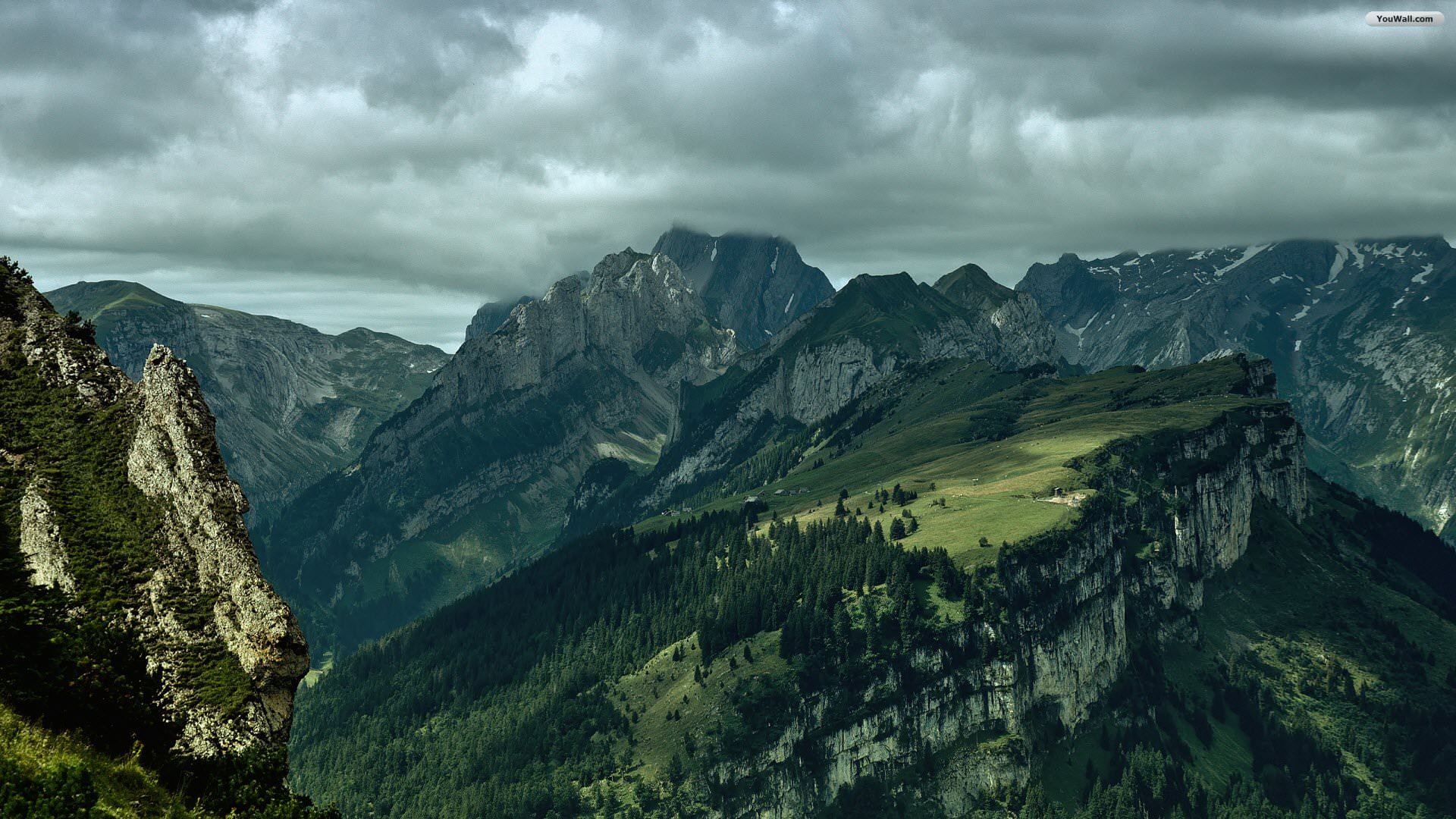
Treks
Treks represent the time the PCs take to journey between destinations. Before their next encounter, players roll either Survival or Resilience checks, with the results of those checks determining what occurs on the Trek. PCs journeying through the frozen wastelands of Forodwaith might roll Resilience checks to handle the sub-zero temperatures, while those traveling through the dark forests of Mirkwood might be forced to roll Survival checks to find their way through the darkness.
Various circumstances can influence the Trek check, from the severity of conditions and outside influences to hunger and poor preparation. The check could result in everything from an ambush by enemies to b or b to checks in subsequent encounters due to lack of rest. A failed Trek check results in the PC having their strain threshold reduced by 3 until their next Trek check or until they are able to get a full night's rest in a town or home.
Table 7-1: Spending a, h, t, d in Treks
| Result | Result Examples |
|---|---|
| a or t | The PCs find a secret path through the wilds, reducing the length of the Treck by 10%. |
| aa or t | The PCs find lodging along the way, allowing them to get food and rest. |
| aaa or t | The PC finds a large supply of food (fruit trees, huntable animals, etc) freeing members of the Fellowship from the effects of Hunger. |
| t | The PC discovers a hidden treasure, determined by the GM. |
| h or d | The PCs get lost along the way, increasing the length of the Trek by 10%. |
| hh or d | The PCs are ambushed by enemy forces. |
| hhh or d | The PC contracts a disease or other nasty condition, determined by the GM. |
| d | Thieves come in the night and steal half of the PC's gold. |
Hunger
Many people in the modern world take food for granted. Getting the right kind of food can be expensive, but if all you care about is being able to eat, pretty much anyone can get ramen for about a quarter a pack. While traveling the wilds for extended periods of time however, food is a commodity. The unprepared traveler can quickly find themselves far from home with nothing to eat.
Rations are a necessity for any adventurer, and skill with hunting is helpful for when those rations run out. Survival checks can be made to hunt for more food, with the difficulty of the check determined by the likelihood of finding something edible. For example, Mordor's barren wastelands are going to have a lot fewer animals and edible plants than Fangorn forest (though that has its own dangers).
When food has run out, immediately before making their Trek check the PCs make Resilience checks to overcome the affects of hunger. If the check succeeds, they don't ignore Hunger completely, but instead suffer the effects of the state of Hunger one step less. (For example, someone succeeding a Hunger check after 4 days of going without food would suffer the effects of Hungry instead of Extremely Hungry.)
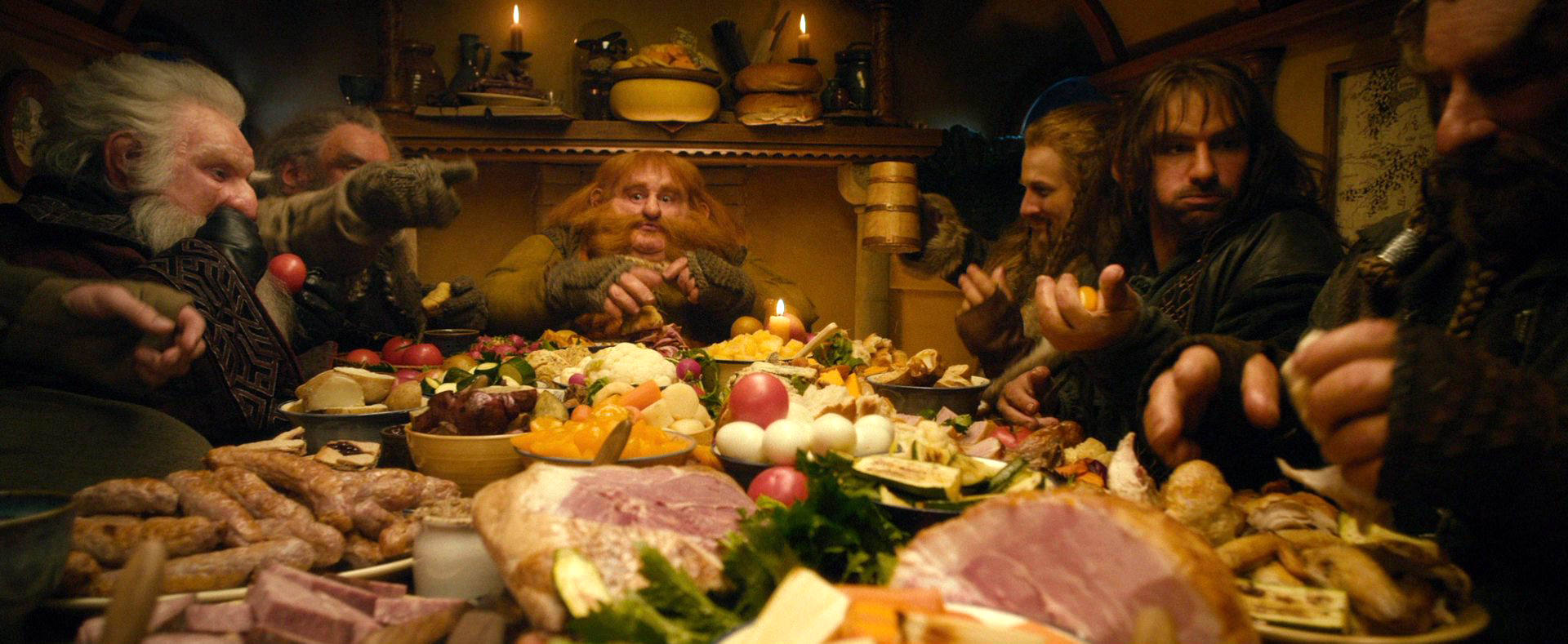
Table 7-2: Hunger Guidelines
| State of Hunger | Difficulty | Effect of Failed Check |
|---|---|---|
| Mildy Hungry (1 day without food) | Easy (d) | Reduce strain threshold by 1 until fed. |
| Hungry (2-3 days without food) | Average (dd) | Reduce strain threshold by 2 and add b to all checks until fed. |
| Extremely Hungry (4-6 days without food) | Hard (ddd) | Reduce strain threshold by 4 and add b b to all checks until fed. |
| Ravenous (1 week without food) | Daunting (dddd) | Reduce strain threshold by 6, reduce wound threshold by 2, and upgrade the difficulty of all checks once until fed. |
| Starving (2+ weeks without food) | Formidable (ddddd) | Reduce strain threshold by 10, reduce wound threshold by 5, and upgrade the difficulty of all checks twice until fed. |
Adversaries
The Free Peoples
As long as there has been evil in the world, there have been those willing to stand against it. The Free Peoples of Middle Earth are those who are willing to stand up against the Shadow instead of bowing down to it. Whether simple farmers or ancient elf-lords, these men and women are willing to do whatever is needed to see that Sauron is defeated and the world is made safe once more.
Bounder (Minion)
Hobbits have never been a very warlike bunch. However, when times require, they are willing to fight. The Bounders are the closest thing the Shire has to a fighting force, a loose group of Hobbits given authority by the Sheriffs to patrol the borders or "bounds" of the Shire, keeping strange folk out, though force is rarely required, and the Bounders would much rather tell the strangers off than get into a fight.
- Skills (group only): Melee (Light), Perception, Ranged, Stealth, Vigilance
- Talents: None
- Abilities: Silhouette 0, Courage of Hobbits (When making a Discipline check, Bounder may downgrade difficulty of the check by one.)
- Equipment: Club (Melee [Light]; Damage 3; Critical 4; Range [Engaged]), leather jerkin (+1 soak), short bow (Ranged; Damage: 6; Crit: 3; Range [Short]; Inaccurate 1)
Dwarf Soldier (Minion)
The dwarves have always been legendary warriors, and their armies are nearly unparalleled in the field of battle. These stats are based off of the dwarf army from the Iron Hills as seen in the Battle of the Five Armies.
- Skills (group only): Discipline, Melee (Light), Resilience, Vigilance
- Talents: Pike Wall (Dwarf Soldiers interlock their shields and hold out their pikes to hold off attackers. For an enemy to break through the line, they must make a Hard (ddd) Melee, Athletics, or Coordination check, with the difficulty upgraded for each additional minion in the minion group, also suffering an engaging attack (see Pike in Weapons.)
- Abilities: None
- Equipment: Battleaxe (Melee [Light]; Damage 6; Critical 3; Range [Engaged], Vicious 1), dwarven plate (+3 soak), pike (Melee [Light]; Damage 5; Critical 3; Range [Short], Defensive 1, Pierce 2), shield (Melee [Light]; Damage 3; Critical 6; Range [Engaged], Defensive 1, Deflection 1, Inaccurate 1)
Elven Warrior (Minion)
The elves are the oldest and wisest of the Free Peoples, and their armies, while smaller than those of men or dwarves, contain the greatest warriors in Middle Earth. Many of these elves have hundreds, if not thousands of years of experience.
- Skills (group only): Discipline, Melee (Light), Perception, Ranged, Stealth, Vigilance
- Talents: Finesse
- Abilities: None
- Equipment: Elven mail (2 defense, +2 soak), longbow (Ranged; Damage 8; Critical 3; Range [Long]; Unwieldy 3), shield (Melee [Light]; Damage 2; Critical 6; Range [Engaged], Defensive 1, Deflection 1, Inaccurate 1), sword (Melee [Light]; Damage 5; Critical 2; Range [Engaged], Defensive 1)
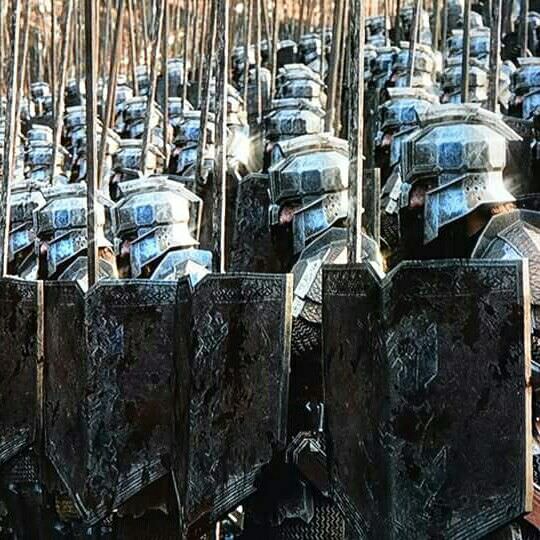
Elf Lord (Nemesis)
Few can match the wisdom and might of the lords of the elves. They have lived for thousands of years and are the veterans of many wars, familiar with the deceits and minions of Sauron than any others. Few can match them on the battlefield, and fewer can match their strange magics. While these stats represent a Noldor elf lord, they can easily be modified to represent a Sindar lord as well.
- Skills: Charm 2, Cool 3, Discipline 3, Knowledge (Lore) 3, Melee (Heavy) 3, Negotiation 2, Ranged 3
- Talents: Adversary 3, Improved Parry 3
- Abilities: Beauty of the High Elves (Elf lord decreases the difficulty of all Charm, Negotiation, and Leadership checks by 1), Light of Valinor (Elf lord can see and interact with the Unseen World, dealing full damage to enemies with the Wraith or Wight talent. When beginning an encounter with a creature of evil, Elf lord can force them to make a Hard [ddd] Fear check as an incidental), Valorous (See Hope & Shadow)
- Equipment: Elven greatsword (Melee [Heavy}; Damage 8; Critical 2; Range [Engaged]; Accurate 1, Defensive 1, Finesse, Pierce 2, Superior, Unwieldy 4), elven longbow (Ranged; Damage 9; Critical 3; Ranged [Long]; Accurate 1, Pierce 1, Superior, Unwieldy 4), elven plate (3 defense, +3 soak)
Gondorian Soldier (Minion)
The armies of Gondor have long held back the legions of Mordor. While not as strong as the dwarves or as skilled as the elves, few can deny the power that the Race of Men have to fight against evil.
- Skills (group only): Discipline, Melee (Light), Ranged, Vigilance
- Talents: None
- Abilities: None
- Equipment: Bow (Ranged; Damage 7; Critical 3; Range [Medium]), chainmail (+2 soak), light spear (Melee [Light]; Damage 4; Critical 4; Range [Engaged], Accurate 1, Defensive 1), sword (Melee [Light]; Damage 5; Critical 2; Range [Engaged], Defensive 1), tower shield (Melee [Light]; Damage 2; Critical 6; Range [Engaged], Defensive 2, Deflection 2, Inaccurate 2)
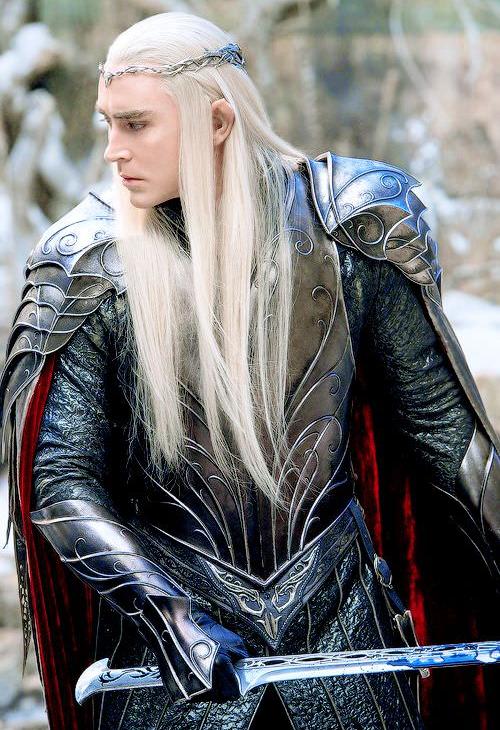
Gondorian Captain (Rival)
The armies of Gondor are led by battle-hardened captains who have fought against the evil of Mordor for years. They lead their troops from the front, racing into battle alongside their men.
- Skills: Cool 2, Discipline 2, Leadership 2, Melee (Light) 3, Vigilance 3
- Talents: None
- Abilities: None
- Equipment: Plate armor (1 defense +2 soak), sword (Melee [Light]; Damage 6; Critical 2; Range [Engaged], Defensive 1), tower shield (Melee [Light]; Damage 2; Critical 6; Range [Engaged], Defensive 2, Deflection 2, Inaccurate 2)
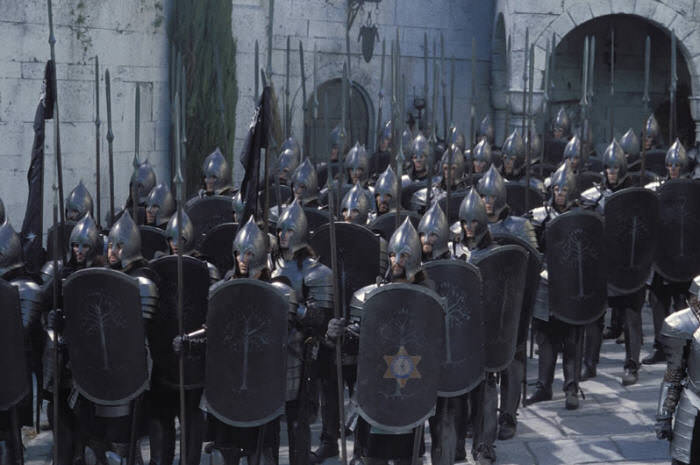
Guard (Minion)
Beyond the soldiers and warriors of grand armies, there are also the simple men and women who try to protect the small villages and towns that they call home. These people have little experience with war and even less resources, but they do what they can to protect those they love.
- Skills (group only): Melee (Light), Vigilance
- Talents: None
- Abilities: None
- Equipment: Leather armor (+1 soak), light spear (Melee [Light]; Damage 4; Critical 4; Range [Engaged], Accurate 1, Defensive 1), shield (Melee [Light]; Damage 2; Critical 6; Range [Engaged], Defensive 1, Deflection 1, Inaccurate 1)
Ranger (Rival)
The Rangers of the North are often feared by those who don't understand their true intentions. The truth is that there are few with nobler hearts than these Dunedain of the North. They wander the northern lands, hunting the minions of evil and protecting those that fear them. These stats also work for their southers cousins, the Rangers of Ithilien, also known as the Rangers of Gondor.
- Skills: Melee (Light) 3, Melee (Heavy) 3, Perception 4, Ranged 3, Stealth 4, Survival 4, Vigilance 3
- Talents: Adversary 1
- Abilities: None
- Equipment: Leather armor (+1 soak), longbow (Ranged; Damage 8; Critical 3; Ranged [Long]; Unwieldy 3), ranger cloak, shortsword (Melee [Light]; Damage 5; Critical 3; Range [Engaged], Accurate 1), sword (Melee [Heavy]; Damage 6; Critical 2; Range [Engaged], Defensive 1)
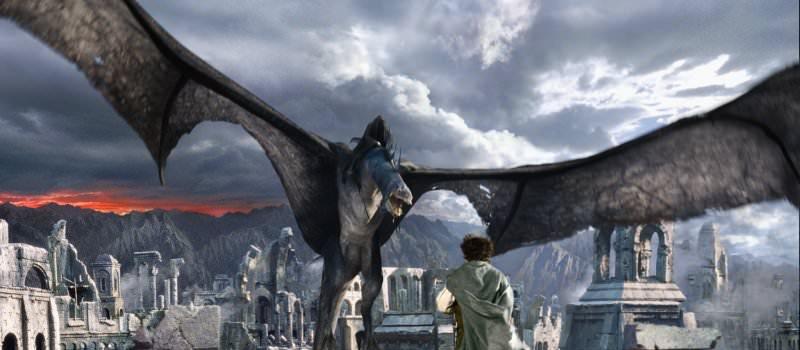
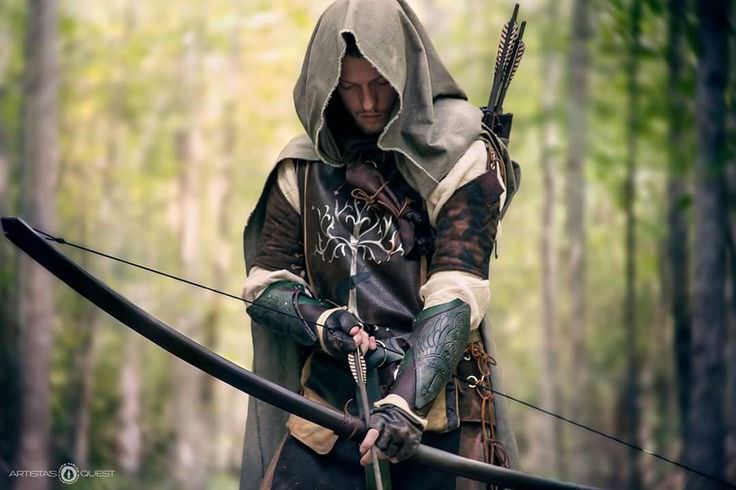
Creatures and Beasts
Middle Earth is vast and mysterious, with many peoples and even more beasts that call it home. Some of these creatures are natural, denizens of the wild that have lived there since before the Eldar awoke beneath the stars. Others are dark, vile creatures, twisted to serve dark purposes.
Bear (Rival)
Bears are relatively ordinary beasts, with no love for evil things. However, they are fiercely protective of their homes, and adventures should be weary not to anger them, as even ordinary creatures can prove to be deadly threats.
- Skills: Athletics 1, Brawl 2, Resilience 2
- Talents: None
- Abilities: Silhouette 2
- Equipment: Claws (Brawl; Damage: 7; Crit: 3; Range [Engaged]; Disorient 1), Bite (Brawl; Damage: 8; Crit: 3; Range [Engaged]; Pierce 1, Vicious 2), Thick Hide (+2 Soak)
Fell Beast (Rival)
It is unknown how these foul creatures came to be. Some say they were great eagles once, twisted and tortured by Sauron to be mounts for his greatest servants. Others say they were the weakest spawn of ancient cold-drakes, dragons without fire, and over time Sauron weakened their minds until they were little more than beasts. And some say that they were spawned by Sauron himself through some dark sorcery, fed with the foul meat of Mordor and bred to be extentions of his will.
What is known of these beasts is that they are terrifying to behold, and sighting them means that one of the Nazgul has ridden forth to execute his Master's dark will.
- Skills: Brawl 2, Survival 2, Vigilance 3
- Talents: None
- Abilities: Silhouette 3, Flyer, Swoop Attack (after making a Brawl check, a fell beast can move from engaged to short range of the target as an incidental), Terrifying (upon first seeing a fell beast, a character must make a Hard (cdd) Fear check with the difficulty upgraded once, to reflect the gigantic stature and terrible presence of the beast)
- Equipment: Razor Claws (Brawl; Damage: 8; Crit: 2; Range [Engaged]; Ensnare 2, Pierce 2, Vicious 3)
Great Eagle (Rival)
Servants of Manwe, the King of the Valar and Lord of the Winds, the Great Eagles are a proud and noble race. They turned the tide of battle during the War of Wrath in the first age, battling against the legions of fire-breathing dragons unleashed by Morgoth. It is incredibly rare for them to interact with other races, usually only if the eagles owe that individual a great debt (as was the case with Gandalf). They are unlikely to act unless the need is truly great.
- Skills: Brawl 3, Perception 4, Survival 2, Vigilance 3
- Talents: None
- Abilities: Silhouette 3, Flyer, Swoop Attack (after making a Brawl check, a great eagle can move from engaged to short range of the target as an incidental)
- Equipment: Razor Claws (Brawl; Damage: 10; Crit: 2; Range [Engaged]; Ensnare 2, Pierce 3, Vicious 2)
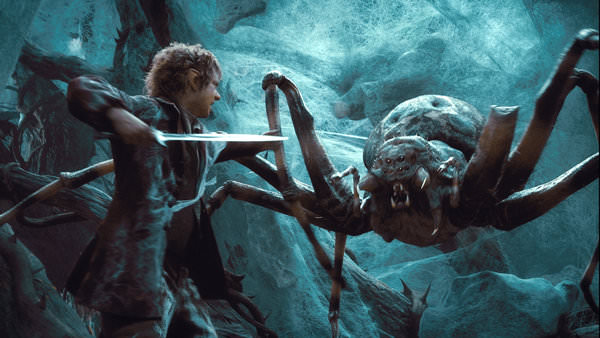
Horse (Minion)
Horses are the primary choice of mount for the Free Peoples, and many of the servants of the Enemy as well. While not particularly powerful, they are fast and easily trained.
- Skills: Athletics, Resilience
- Talents: None
- Abilities: Ecnumbrance Capacity 12, Silhouette 2
- Equipment: Hooves (Brawl; Damage: 5; Crit: 5; Range [Engaged]), riding tack
Mearas (Rival)
Among horses, there are none as great as the Mearas. Far more intelligent than their lesser cousins, the Mearas are not easy to tame. However, if one convinces a Mearas they are worthy of riding them, none could ask for a finer mount.
- Skills: Athletics 3, Brawl 1, Discipline 2, Resilience 1, Survival 2
- Talents: Hard to Tame (Upon riding a Mearas for the first time, must make a Survival check opposed by the Mearas's Discipline to convince the Horse to allow you to ride it.)
- Abilities: Encumbrance capacity 13, Silhouette 2
- Equipment: Trampling Hooves (Brawl; Damage: 7; Crit: 4; Range [Engaged], Knockdown)
Mirkwood Spider (Rival)
The foul beasts that have taken up residence in Mirkwood do not have their origin in the world of Arda. They are the cursed spawn of Ungoliant, a dark creature from the vast emptiness of the Void. These spiders are intelligent, even capable of speech, though there is little that talk can do to save you from their vile clutches.
- Skills: Brawl 2, Cool 2, Coordination 2, Perception 1, Ranged 1, Stealth 2, Vigilance 3
- Talents: None
- Abilities: Skitter (can move across walls, ceilings, tree trunks, tree limbs, and giant spider webs without penalty)
- Equipment: Venomous fangs (Brawl; Damage 5; Critical 3; Range [Engaged]; Burn 2, Pierce 3), webbing (Ranged; Damage 1; Critical 6; Range [Short]; Ensnare 3)
Mumakil (Rival)
Known to the Hobbits as Oliphaunts, the Mumakil are the greatest weapon the Haradrim have in their arsenal. They are much like real-world elephants, except that they are much, much larger, with four tusks and trained for war. Attempting to defeat one of these without an army at your back is a fool's errand.
- Skills: Brawl 1, Resilience 2
- Talents: None
- Abilities: Silhouette 4, Sweep (a mumakil may spend aa to hit an additional target with a successful Brawl check), Trample (if a mumakil takes a maneuver to move closer to its target before attacking with its Feet, it gains b to its attack check and deals +2 damage), Trained Mount 1 (add b to a rider's Riding checks while mounted), Beast of Burden 30 (add 30 to encumbrance threshold)
- Equipment: Tusks (Brawl; Damage: 15; Crit: 5; Range [Engaged], Concussive 1), Feet (Brawl; Damage: 18; Crit: 4; Range [Engaged], Knockdown)
Pony (Minion)
Smaller and slower than horses, they are nevertheless stout and good for long treks across vast distances. They are the favored mount among hobbits and dwarves, mostly because they can actually sit on them.
- Skills: Athletics, Resilience
- Talents: None
- Abilities: Encumbrance Capacity 14
- Equipment: Hooves (Brawl; Damage: 4; Crit: 5; Range [Engaged]), harness or riding tack
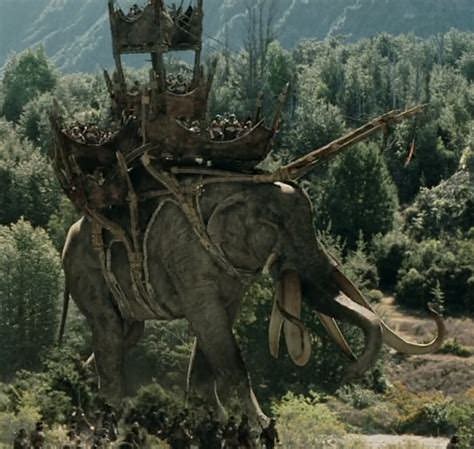
Warg (Rival)
While wolves are natural beasts, Wargs most certainly are not. These foul creatures possess an unholy intelligence, complete with their own cruel manner of speech. While they have their own system of governance, they often ally themselves with goblins and orcs as their motives are aligned, even letting the chiefs ride upon their backs.
- Skills: Athletics 2, Brawl 3, Perception 2, Survival 3, Vigilance 2
- Talents: Silhouette 2
- Abilities: Pack Tactics (when using the assist maneuver, wolves add bb instead of b)
- Equipment: Bite (Brawl; Damage: 6; Crit: 3; Range [Engaged], Vicious 2)
Wolf (Minion)
While natural beasts, wolves are nontheless dangerous in packs. They are stealthy and swift, and many an unfortunate traveler has met their end from a pack of hungry wolves.
- Skills (group only): Athletics, Brawl, Perception, Stealth
- Talents: None
- Abilities: Pack Tactics (when using the assist maneuver, wolves add bb instead of b)
- Equipment: Bite (Brawl; Damage: 5; Crit: 3; Range [Engaged], Vicious 1)
Servants of Sauron
Sauron's will stretches far, calling many evil things to his cause. Orcs, trolls, and wicked men are just a few of his many servants. Sauron seeks to dominate all life in Middle Earth, and he will use every weapon in his arsenal to see it done.
Barrow-wight (Rival)
When the Witch King waged his war on the splintered kingdom of Arnor, he called upon the darkest of powers. The kings of Arnor had long been buried in the Barrow Downs in Cardolan, so the Witch King sent dark spirits from Angmar to the Barrow-Downs, and there they possessed the long-dead bodies of the ancient kings.
These Barrow-Wights, as they became known, were terrifying to behold, dread creatures with a hatred for all light and life. While nearly immune to most weapons, they are vulnerable to the light of the sun, and fear all light. The most fearful thing about these dread undead is that those they kill are often possessed in turn, becoming Wights themselves.
- Skills: Athletics 1, Melee (Light) 3, Perception 2, Vigilance 2
- Talents: Adversary 1 (upgrade difficulty of all combat checks against this creature once), Wight (Wights suffer half damage from physical attacks, taking full damage from magical attacks)
- Abilities: Death Sight (A wight suffers no Perception penalties at night or in total darkness), Fearful (upon first seeing a fell beast, a character must make an Average (cd) Fear check with the difficulty upgraded once, to reflect the terrible presence of the wight), Life Drain (a target wounded by a wight must make a Hard (ddd) Resilience check or have its Wound and Strain threshold reduced by two until the next sunrise. If either threshold is reduced to zero, the target dies. It will rise as a wight at the next nightfall), Sunlight Vulnerability (a wight exposed to natural sunlight takes two Wounds per turn until it is out of the sunlight. If reduced to zero Wounds, it collapses into dust), Undead (A wight is immune to poison, disease, and sleep, and needs no air, water, or food to survive)
- Equipment: Sword (Melee [Light]; Damage: 6; Crit: 2; Range [Engaged]; Defensive 1), shield (Melee [Light]; Damage: 3; Crit: 6; Range [Engaged]; Defensive 1, Deflection 1, Inaccurate 1), ancient chainmail (+2 Soak)
Black Numenorean (Nemesis)
Not all those descended from the Men of Numenor fight against the Shadow. Near the end, many Men of Numenor were deceived by Sauron into worshipping Morgoth, and their descendants still serve Sauron to this day, many of them numbering among the greatest of his servants. They are skilled in warfare, torture, and even the dark sorceries of their foul master.
- Skills: Charm 2, Coercion 3, Cool 2, Deception 3, Knowledge (Forbidden) 3, Leadership 3, Melee (Heavy) 4, Negotiation 2, Vigilance 2
- Talents: Adversary 2 (upgrade the difficulty of all combat checks against this target twice), Nobody's Fool 2 (upgrade the difficulty of all social checks against this target twice), Parry 3, Scathing Tirade (use this talent to make an Average (dd) Coercion check; for each s, one opponent within short range suffers 1 strain; for each a, one affected opponent suffers 1 additional strain)
- Abilities: Corrupted (See Hope & Shadow)
- Equipment: Black plate armor (1 defense, +2 soak), cruel greatsword (Melee [Heavy]; Damage 7; Critical 2; Range [Engaged]; Defensive 1, Pierce 1, Unwieldy 3, Vicious 2), dark cloak
Easterling (Minion)
The Men of Rhun, known commonly as Easterlings, have often been at odds with the Kingdom of Gondor. Even in ancient times, many in the East served Morgoth, and many now serve Sauron. However, not all of the East is under Sauron's sway, and if it were not for the efforts of the two Blue Wizards, the Men of the East alone would be enough for Sauron to conquer all of Middle Earth.
- Skills (group only): Discipline, Melee (Heavy), Vigilance
- Talents: None
- Abilities: None
- Equipment: Chainmail (+2 soak), halberd (Melee [Heavy]; Damage 6; Critical 3; Range [Engaged]; Defensive 1, Pierce 3)
Goblin (Minion)
Goblins are the weakest of orc-kind, small, sniveling creatures that hide in holes and have little strength, except when in exceedingly large numbers. They hate the sun and all forms of light, hiding from it whenever possible. However, they are very craft and many an adventurer has been overcome by a horde of goblins while traveling through the mountains.
- Skills (group only): Athletics, Melee (Light), Ranged, Stealth, Survival
- Talents: Not Another One (Spend hh on a player's combat check to have add another goblin to the minion group. Spend d to have another goblin minion group to appear)
- Abilities: Silhouette 0, Discretion (A goblin may disengage as an incidental rather than a maneuver), Hatred of the Sun (Adds bb to all checks when in direct sunlight)
- Equipment: Cruel sword (Melee [Light]; Damage: 4; Crit: 2; Range [Engaged]; Defensive 1, Vicious 1), leather armor (+1 soak), shield (Melee [Light]; Damage: 1; Crit: 6; Range [Engaged]; Defensive 1, Deflection 1, Inaccurate 1), short bow (Ranged; Damage: 6; Crit: 3; Range [Short]; Inaccurate 1)
Haradrim Soldier (Minion)
The Men of Harad have been at war with Gondor for millenia, and their hatred runs deep. For centuries they were ruled by Black Numenoreans, but even without their cruel influence, many Haradrim join Sauron's forces for the chance to defeat their ancient enemy.
- Skills (group only): Melee (Light), Perception, Ranged
- Talents: None
- Abilities: None
- Equipment: Bow (Ranged; Damage 7; Critical 3; Range [Medium]; Unwieldy 2), chainmail (+2 soak), light spear (Melee [Light]; Damage 4; Critical 4; Range [Engaged], Accurate 1, Defensive 1), scimitar (Melee [Light]; Damage 5; Critical 2; Range [Engaged]; Vicious 1)
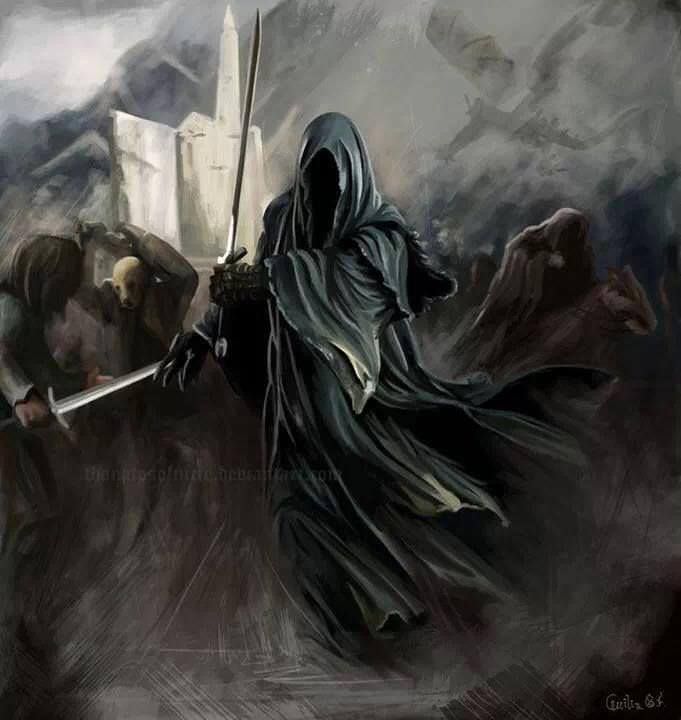
Nazgul (Nemesis)
Once, the Nazgul were nine great kings of Men. These men were tempted by Sauron and each given a Ring of Power. The Rings gave them dominion over lesser men and made them great warriors and sorcerers, able to become invisible at will and walk in the Unseen World. However, the longer they wore the rings, the more they fell into Shadow, until eventually they faded entirely, becoming wraiths. Now the Nazgul are the greatest of the servants of Sauron, living extensions of his dark will.
- Skills: Coercion 4, Knowledge (Forbidden) 5, Melee (Heavy) 4, Melee (Light) 2, Riding 3, Stealth 3
- Talents: Adversary 3 (upgrade difficulty of all combat checks against this creature thrice), Lethal Blows 3 (+30 to results of all Critical Injuries), Wraith (When uncloaked, cannot be seen or interact with the physical world and takes no damage from physical attacks. When cloaked, Nazgul take half damage from physical attacks, taking full damage from fire and magical attacks)
- Abilities: Death Sight (Nazgul suffer no Perception penalties at night or in total darkness), Fallen (See Hope & Shadow), Hatred of the Sun (Adds bb to all checks when in direct sunlight), Terrifying (upon first seeing a Nazgul, a character must make a Hard (cdd) Fear check with the difficulty upgraded once, to reflect the terrible presence of the wraith), Undead (Nazgul are immune to poison, disease, and sleep, and need no air, water, or food to survive) *Add Black Breath ability
- Equipment: Armored robes (1 defense, +2 soak), greatsword (Melee [Heavy]; Damage: 8; Crit: 2; Range [Engaged]; Defensive 1, Pierce 1, Unwieldy 3), morgul blade (Melee [Light]; Damage: 5; Crit 1; Range [Engaged]; Breach, Morgul)
Olog-hai (Nemesis)
Much like Uruk-hai are with orcs, Olog-hai are a newer, better breed of troll. They are bigger, stronger, and smarter, even capable of speech (though they exclusively speak Black Speech, and not very well) and are trained to fight with swords and armor. They often appear as champions in the armies of Mordor, leading charges of orcs, or in extreme cases even a charge of lesser trolls. Unlike their weaker cousins, Olog-hai do not turn to stone in sunlight.
- Skills: Brawl 2, Coercion 2, Melee 3, Resilience 3, Vigilance 2
- Talents: Adversary 2 (upgrade difficulty of all combat checks against this creature twice), Berserk (Once per encounter, may make Berserk maneuver. Until the end of the encounter or until they are incapacitated, olog-hai adds saa to all melee combat checks they make. However, opponents add s to all combat checks they make against olog-hai. At the end of the encounter, olog-hai suffers 6 strain.), Feral Strength 5 (+5 damage to Brawl & Melee attacks)
- Abilities: Silhouette 3, Sweep Attack (on a successful Brawl or Melee check, an Olog-hai can spend aa per target to hit additional targets engaged with the first target), Stone Skin (Reduce results of all Critical Injuries by 10)
- Equipment: Massive sword (Melee (Heavy); Damage 15; Critical 2; Range [Engaged]; Defensive 1, Cumbersome 5, Pierce 2, scavenged armor (+2 soak) stony fists (Brawl; Damage 10; Critical 5; Range [Engaged]; Ensnare 3)
Orc (Minion)
Believed to have been created by Morgoth torturing elves, orcs are the rank-and-file of Sauron's forces. They are not very strong, but they are great in number and answer their master's will unquestioningly.
- Skills (group only): Coercion, Melee (Light), Ranged
- Talents: None
- Abilities: Hatred of the Sun (Adds bb to all checks when in direct sunlight)
- Equipment: Bow (Ranged; Damage 7; Critical 3; Range [Medium]; Unwieldy 2), cruel sword (Melee [Light]; Damage: 5; Crit: 2; Range [Engaged]; Defensive 1, Vicious 1), leather armor (+1 soak), shield (Melee [Light]; Damage: 2; Crit: 6; Range [Engaged]; Defensive 1, Deflection 1, Inaccurate 1)
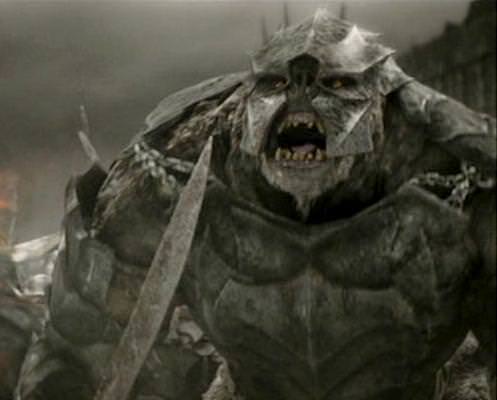
Orc Captain (Rival)
Sauron's desire is to bring absolute order to all of Middle Earth. In this light, it makes sense that his armies have a well-defined system of leadership. Many of the orc captains are uruks, though this is not always the case. If the captain is an uruk, remove the Hatred of the Sun ability.
- Skills: Brawl 2, Coercion 3, Leadership 1, Melee (Light) 2, Ranged 2, Vigilance 1
- Talents: None
- Abilities: Hatred of the Sun (Adds bb to all checks when in direct sunlight)
- Equipment: Bow (Ranged; Damage 7; Critical 3; Range [Medium]; Unwieldy 2), cruel sword (Melee [Light]; Damage: 6; Crit: 2; Range [Engaged]; Defensive 1, Vicious 1), chainmail (+2 soak), shield (Melee [Light]; Damage: 3; Crit: 6; Range [Engaged]; Defensive 1, Deflection 1, Inaccurate 1)
Ruffian (Minion)
These stats work for a large variety of criminals and bandits throughout Middle Earth.
- Skills (group only): Brawl, Coercion, Melee (Light)
- Talents: None
- Abilities: None
- Equipment: Club (Melee [Light]; Damage 5; Critical 4; Range [Engaged]), dagger (Melee [Light]; Damage 4; Critical 3; Range [Engaged}), leather jerkin (+1 soak)
Troll (Rival)
Standing from 10-18 ft tall, trolls are some of the largest and strongest of the minions of Sauron, though they are also among the dullest. There are several varieties of trolls, but all are large and stupid, and all but the Olog-hai turn to stone if they are caught in direct sunlight.
- Skills: Athletics 2, Melee (Heavy) 2, Resilience 2, Survival 1
- Talents: Adversary 1 (upgrade difficulty of all combat checks against this creature once), Feral Strength 4 (+4 damage to Brawl & Melee attacks)
- Abilities: Berserk (Once per encounter, may make Berserk maneuver. Until the end of the encounter or until they are incapacitated, troll adds saa to all melee combat checks they make. However, opponents add s to all combat checks they make against troll. At the end of the encounter, troll suffers 6 wounds.), Return to Stone (If exposed to direct sunlight, a troll will turn to stone immediately), Silhouette 3, Sweep Attack (on a successful Brawl or Melee check, a troll can spend 2 Advantage per target to hit additional targets engaged with the first target), Stone Skin (Reduce results of all Critical Injuries by 10)
- Equipment: Cudgel (Melee (Heavy); Damage 12; Critical 4; Range [Engaged], Cumbersome 4, Disorient 2, Knockdown), stony fists (Brawl; Damage 8; Critical 5; Range [Engaged]; Ensnare 3)
- Cave Troll: +1 Soak, remove bb due to darkness
- Snow Troll: Remove bb due to cold conditions
- Hill Troll: +1 Cunning, +1 Survival, +1 Perception
Uruk-hai (Minion)
Greatest of orc-kind, the uruk-hai were bred for war. They are stronger and fiercer than their lesser cousins, tireless and with no fear of the sun. While the term often is used to describe the uruks of Isengard, these stats also work for the Uruks of Mordor.
- Skills (group only): Athletics, Coercion, Melee (Light), Ranged, Vigilance
- Talents: Feral Strength 1 (+1 damage to Brawl & Melee attacks)
- Abilities: None
- Equipment: Bow (Ranged; Damage 7; Critical 3; Range [Medium]; Unwieldy 2), cruel sword (Melee [Light]; Damage: 7; Crit: 2; Range [Engaged]; Defensive 1, Vicious 1), chainmail (+2 soak), tower shield (Melee [Light]; Damage: 4; Crit: 6; Range [Engaged]; Defensive 2, Deflection 2, Inaccurate 2)
Uruk Berserker (Rival)
The fiercest of the uruks are the berserkers, warriors that charge into battle in a rage. They are great warriors, and only the mightiest of heroes can think to challenge one in battle. These stats can easily be modified to represent berserkers of other races.
- Skills: Melee (Heavy)
- Talents: Berserk (Once per encounter, may make Berserk maneuver. Until the end of the encounter or until they are incapacitated, uruk berserker adds saa to all melee combat checks they make. However, opponents add s to all combat checks they make against uruk berserker. At the end of the encounter, uruk berserker suffers 6 wounds.), Feral Strength 2 (+2 damage to Brawl & Melee attacks)
- Abilities:
- Equipment: Cruel greatsword (Melee [Heavy]; Damage: 10; Crit: 2; Range [Engaged]; Defensive 1, Pierce 1, Unwieldy 3, Vicious 1), plate armor (1 defense, +2 soak)
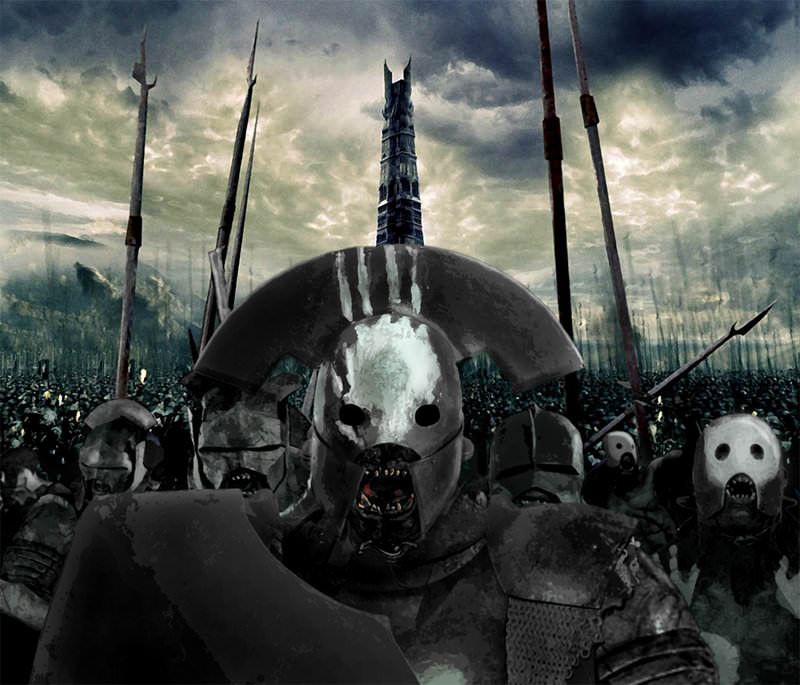
Wraith (Rival)
While the Nazgul are the first and greatest of the wraiths, they have many fell servants. The Nazgul wield cruel daggers known as morgul blades. These blades are cursed with dark sorcery, so that any struck with them fade until they too become wraiths. They serve as servants and lieutenants to the Nazgul, extensions of their will as the Nazgul are extensions of Sauron's.
- Skills: Coercion 3, Cool 2, Discipline 2, Knowledge (Forbidden) 2, Melee (Light) 3, Stealth 3
- Talents: Adversary 1 (upgrade difficulty of all combat checks against this creature once), Feral Strength 3 (+3 to Brawl and Melee attacks), Finesse, Wraith (When uncloaked, cannot be seen or interact with the physical world and takes no damage from physical attacks. When cloaked, wraiths take half damage from physical attacks, taking full damage from fire and magical attacks)
- Abilities: Death Sight (A wraith suffers no Perception penalties at night or in total darkness), Fearful (upon first seeing a fell beast, a character must make a Hard (cd) Fear check with the difficulty upgraded once, to reflect the terrible presence of the wraith), Hatred of the Sun (Adds bb to all checks when in direct sunlight), Miserable (See Hope and Shadow), Undead (A wraith is immune to poison, disease, and sleep, and needs no air, water, or food to survive)
- Equipment: Armored robes (1 defense, +2 soak), sword (Melee [Light]; Damage: 7; Crit: 2; Range [Engaged]; Defensive 1), morgul blade (Melee [Light]; Damage: 5; Crit 1; Range [Engaged]; Breach, Morgul)
Ancient Powers
There are things in Arda that existed long before the kingdoms of elves or men, before Sauron rose to power in the Second Age. Beings of the Elder Days both great and terrible. Some are foul mockeries of Morgoth and others are ancient beings created by the Valar to protect the natural world. All of them are powerful and none should be taken lightly.
Balrog (Nemesis)
Demons of shadow and flame, Balrogs were once numbered among the Maiar. However, they were deceived by Morgoth, turned to evil by his dark promises. Most of the Balrogs died in the War of Wrath, but a few survived by fleeing into the dark places of the world, such as Durin's Bane beneath Moria.
- Skills: Athletics 3, KNowledge (Forbidden) 2, Coercion 3, Melee (Heavy) 4
- Talents: Adversary 2 (upgrade difficulty of all combat checks against this creature twice)
- Abilities: Fallen (See Hope & Shadow) Fiery Aura (Anyone within short range of a Balrog must make a Hard (cdd) Resilience check upgraded once. If they fail the check, they are dealt 5 wounds and 5 strain. If they succeed, they are dealt 2 wounds and 2 strain. On a d, they immediately go 1 over their wound threshold), Silhouette 4, Supremely Terrifying (upon first seeing a balrog, a character must make a Daunting (cddd) Fear check with the difficulty upgraded once, to reflect the massive size and terrible presence of the Balrog), Sweep Attack (on a successful Brawl check, a balrog can spend aa per target to hit additional targets engaged with the first target)
- Equipment: Immense flaming blade (Melee [Heavy]; Damage 20; Crit 1; Range [Short]; Burn 3, Sunder), whip of flame (Melee [Heavy]; Damage 15; Crit 1; Range [Medium]; Burn 3, Ensnare 3)
Ent (Nemesis)
Ents are the ancient protectors of the forests and the woods, the tree-shepherds. They look much like walking trees themselves, and while there were once many, now there are few. They are mighty, but are slow to decide and slower to act.
- Skills: Brawl 3, Knowledge (Lore) 3, Resilience 2, Survival 3, Vigilance 2
- Talents: Feral Strength 5 (+5 to Brawl & Melee attacks), Adversary 2 (upgrade difficulty of all combat checks against this creature twice)
- Abilities: Silhouette 3, Sweep Attack (on a successful Brawl or Melee check, an ent can spend aa per target to hit additional targets engaged with the first target)
- Equipment: Huge limbs (Brawl; Damage 10; Crical 4; Range [Short]; Knockdown, Prepare 1)

Fire Drake (Nemesis)
The greatest of Morgoth's creations were the great flying dragons. These beasts nearly turned the tide in the War of Wrath, led by Ancalagon the Black, greatest of their kind, who was larger than a mountain. However, no other dragons have matched the size and power of Ancalagon. There are none left of his ancient brood, as the last of the great dragons, Smaug the Terrible, fell to the arrow of Bard the Dragonslayer. While none as great as Smaug remain, there are other, lesser drakes who are still truly formidable. Few would dare face a dragon of any kind in battle. There are also cold-drakes, which are exactly like their fiery brethren, but without the fiery breath weapon.
- Skills: Athletics 2, Brawl 3, Charm 3, Resilience 3, Survival 2
- Talents: Adversary 2 (upgrade difficulty of all combat checks against this creature twice), Flyer, Swoop Attack (after making a Brawl check, a fire drake can move from engaged to short range of the target as an incidental)
- Abilities: Dragonspell (A fire drake can make an opposed Charm vs Discipline check with one target, if successful the target comes under the drake's power, following their directions for one round or five minutes), Silhouette 4, Terrifying (upon first seeing a fire drake, a character must make a Hard (cdd) Fear check with the difficulty upgraded once, to reflect the massive size and terrible presence of the beast), Sweep Attack (on a successful Brawl check, an ancient wurm can spend aa per target to hit additional targets engaged with the first target)
- Equipment: Fiery breath (Brawl, Damage 18; Range [Long]; Blast 12, Burn 3, Prepare 1, Slow-Firing 2, Vicious 2), massive jaws (Brawl; Damage 10; Crit 2; Range [Engaged]; Breach 1, Vicious 4), massive claws (Brawl; Damage 16; Crit 4; Range [Short]; Concussive 2, Ensnare 2)
Huorn (Rival)
In ancient times, elves taught the trees to sing. The ents have shepherded the trees since those days, and over the ages some trees have begun to grow "entish", moving around and filled with hatred for fire, axes, and those who wield them. While not as mighty as the ents themselves, these walking trees are truly a terrifying force, especially when surrounded by them in a dense forest.
- Skills: Brawl 2, Resilience 2
- Talents: Adversary 1 (upgrade difficulty of all combat checks against this creature once), Feral Strength 4 (+4 to Brawl & Melee attacks)
- Abilities: Cage of Roots (perform an out-of-turn incidental to immobilize a character within medium range, The character may make a Hard (ddd) Athletics check to break free), Silhouette 2
- Equipment: Limbs (Brawl; Damage 8: Critical 4; Range [Engaged]; Knockdown).
Stone Giant (Nemesis)
Little is known about these mighty and ancient beings. They reside within the Misty Mountains, and there they remain separate from the rest of Middle Earth, caring little for the concerns of the tiny peoples, if they notice us at all, that is. Since Tolkien never gave us a real description of these creatures, I am basing these stats off of the Stone Giants shown in the Hobbit film trilogy.
However, while I wanted to test out making stats for them, I do feel the need to note that they would best be used as environmental hazards rather than actual enemies. They are unlikely to attack anyone, good or evil. Due to their size and stone skin they are unlikely to even notice if the someone attempted to attack them.
- Skills: Athletics 3, Brawl 2, Ranged 2, Resilience 5
- Talents: Hurler (May use Brawn for thrown weapons)
- Abilities: Silhouette 6, Supremely Terrifying (upon first seeing a stone giant, a character must make a Daunting (cddd) Fear check with the difficulty upgraded once, to reflect the massive size and terrible presence of the giant), The Mountains are Weapons (May use a maneuver to tear a chunk out of a mountain as a Massive Boulder)
- Equipment: Massive Boulder (This weapon uses vehicle scale) (Ranged; Damage 4; Crit 3; Range [Long]; Breach 2, Blast 30, Limited Ammo 1, Slow Firing 1), Stony Fists (This weapon uses vehicle scale) (Brawl; Damage 5; Crit 4; Range [Short]; Breach 1, Blast 20, Slow Firing 1)
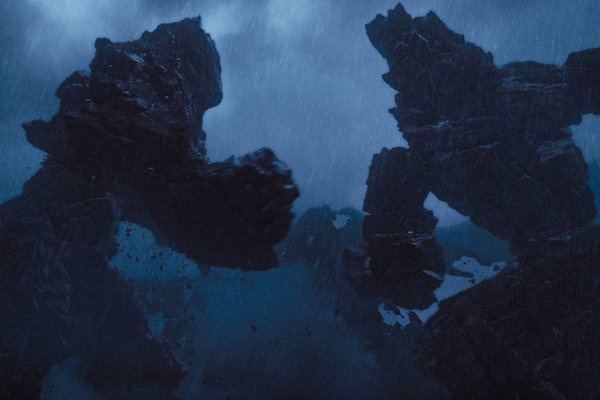
Wurm (Nemesis)
While winged dragons like Smaug are the most well-known of dragons, the first dragons were wingless. While none remain that are as mighty as their sire Glaurung, the remaining wurms are larger and thicker around than their flying cousins. Like drakes, there are also cold-wurms that lack the fiery breath weapon.
- Skills: Athletics 2, Brawl 2, Charm 3, Resilience 4, Survival 2
- Talents: Adversary 2 (upgrade difficulty of all combat checks against this creature twice)
- Abilities: Dragonspell (A wurm can make an opposed Charm vs Discipline check with one target, if successful the target comes under the wurm's power, following their directions for one round or five minutes), Silhouette 4, Supremely Terrifying (upon first seeing a wurm, a character must make a Daunting (cddd) Fear check with the difficulty upgraded once, to reflect the massive size and terrible presence of the beast), Sweep Attack (on a successful Brawl check, a wurm can spend aa per target to hit additional targets engaged with the first target)
- Equipment: Fiery breath (Brawl, Damage 20; Range [Long]; Blast 15, Burn 3, Prepare 1, Slow-Firing 2, Vicious 2), massive jaws (Brawl; Damage 12; Crit 2; Range [Engaged]; Breach 1, Vicious 4), massive claws (Brawl; Damage 18; Crit 4; Range [Short]; Concussive 2, Ensnare 2)
